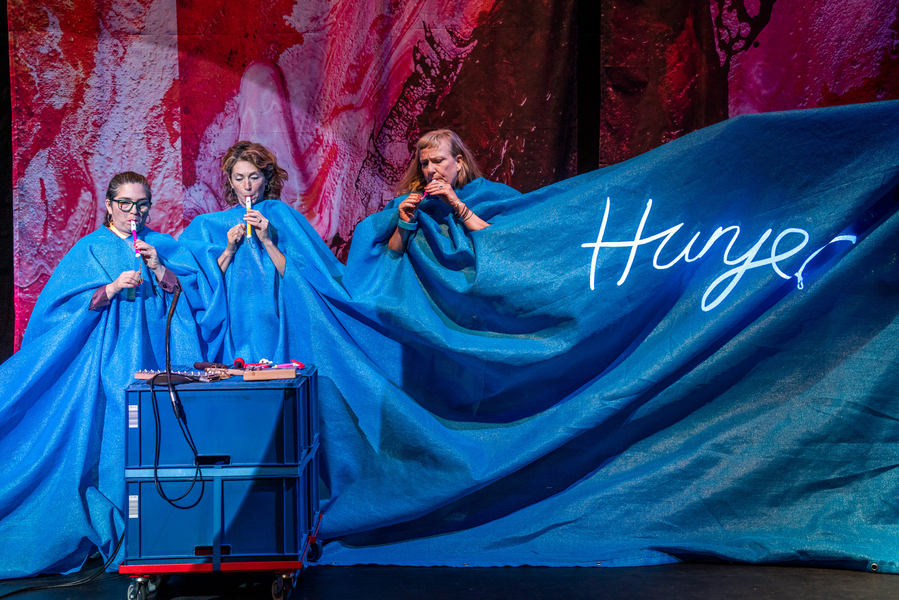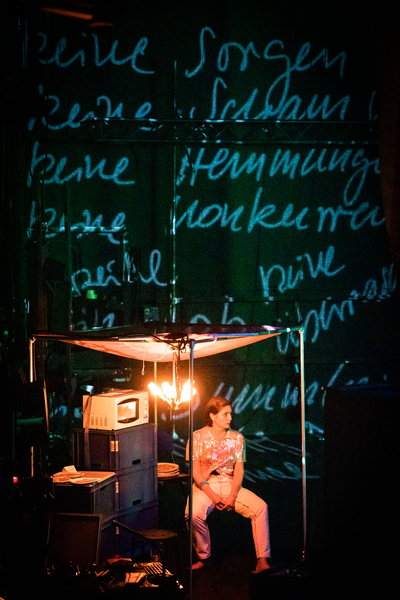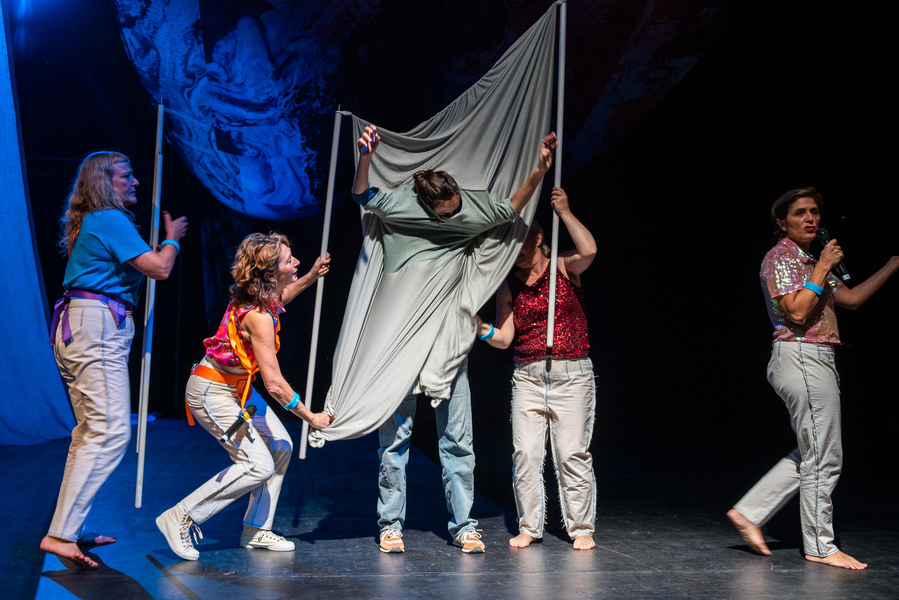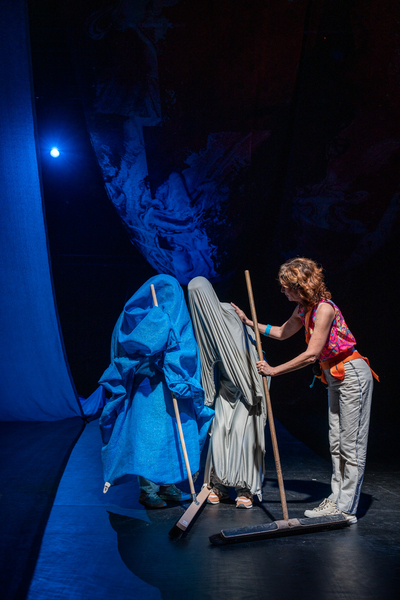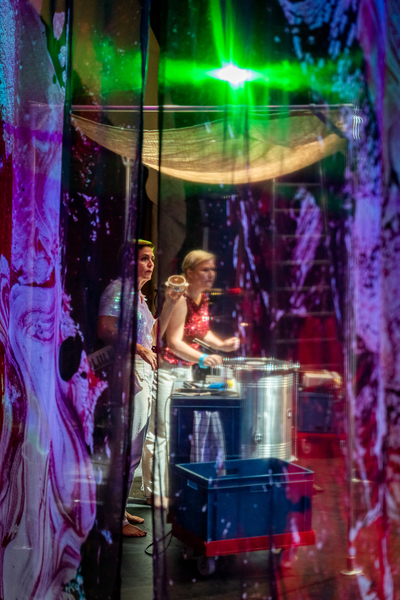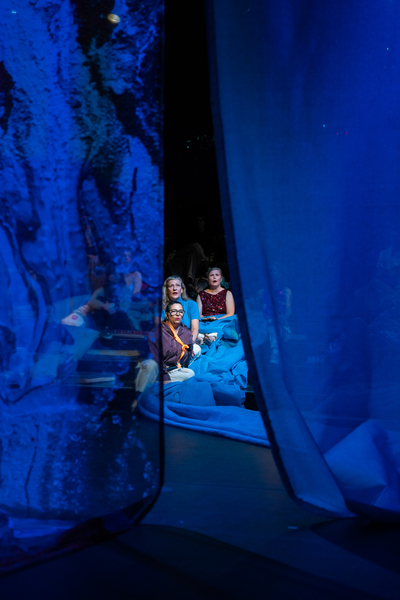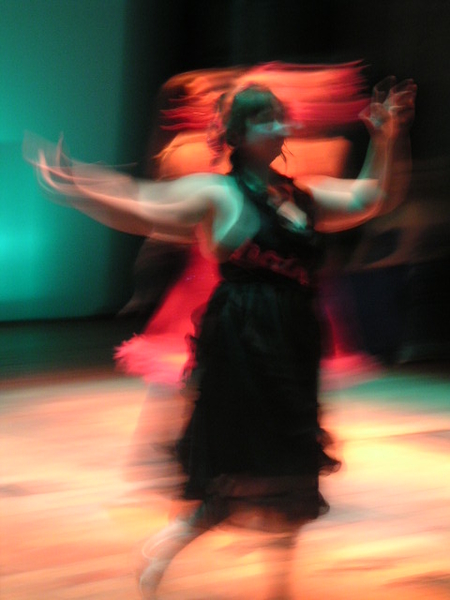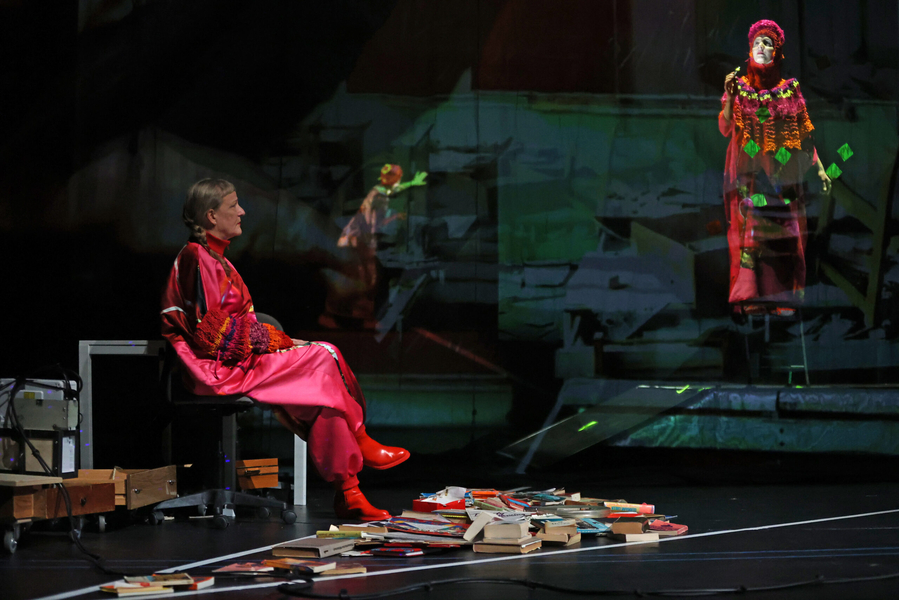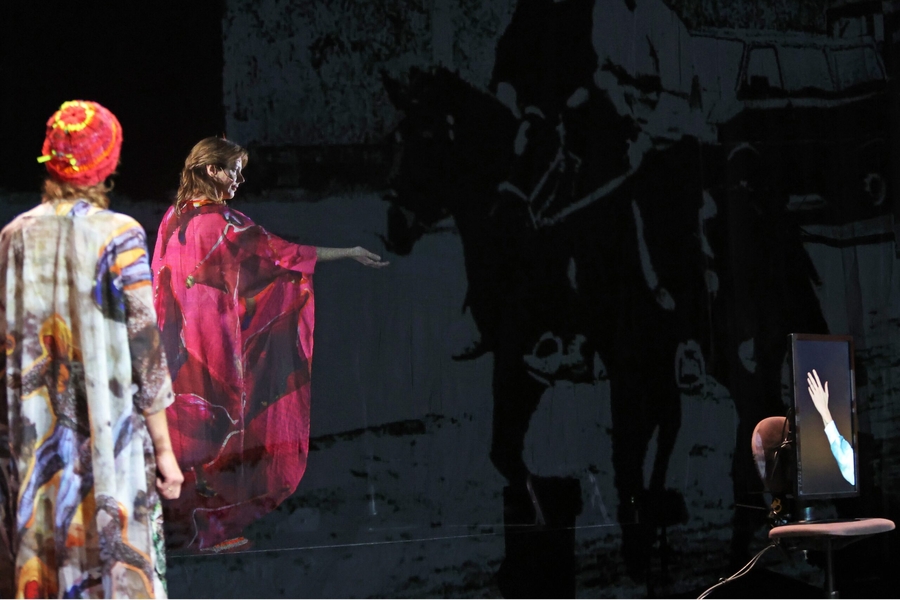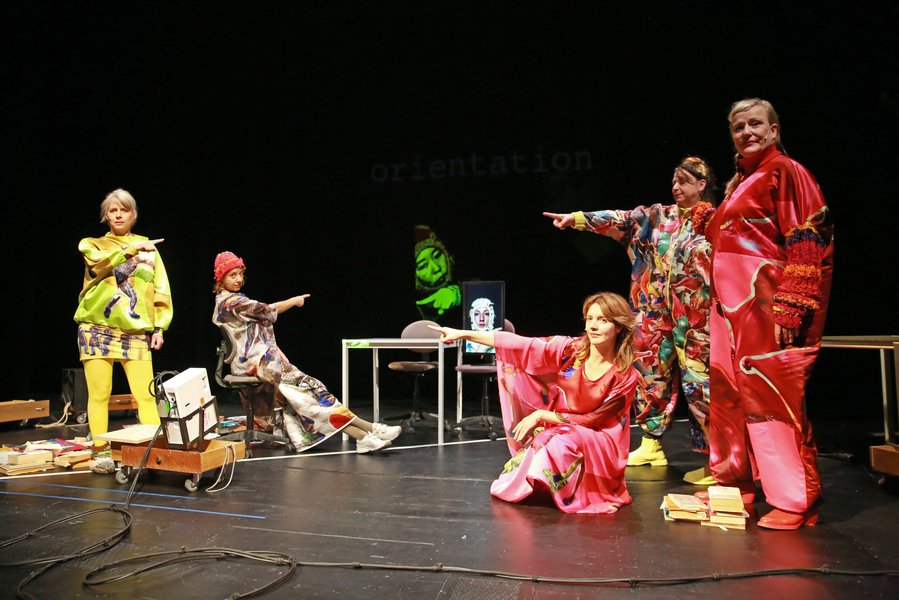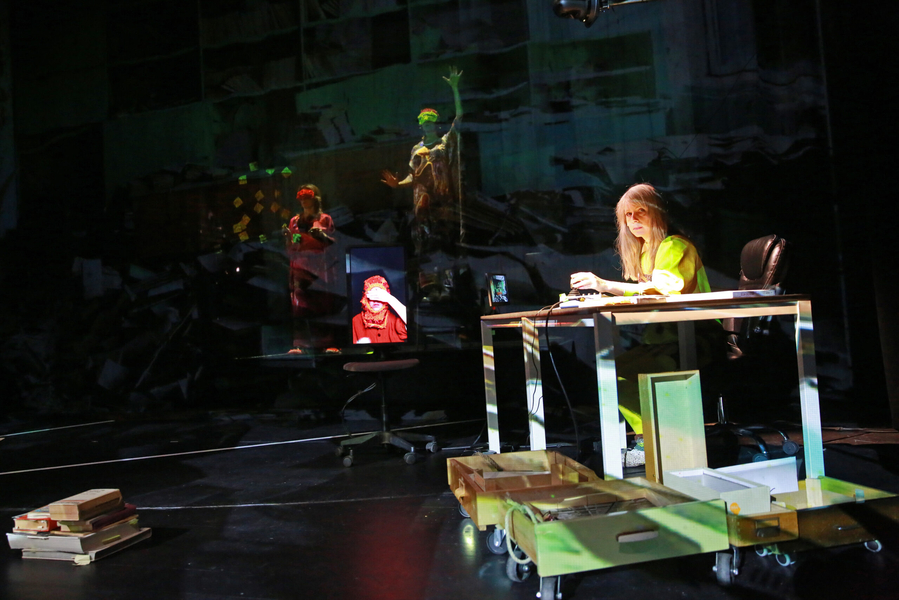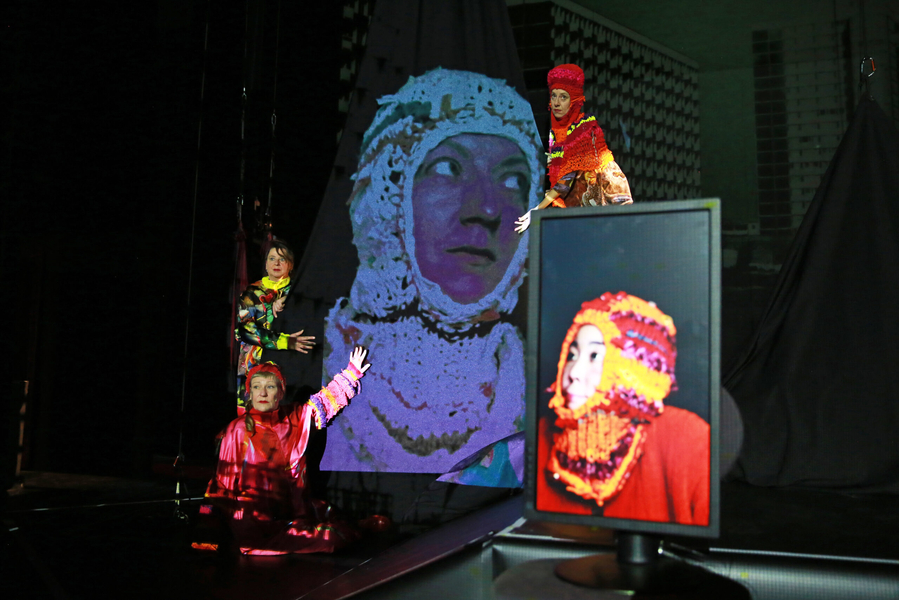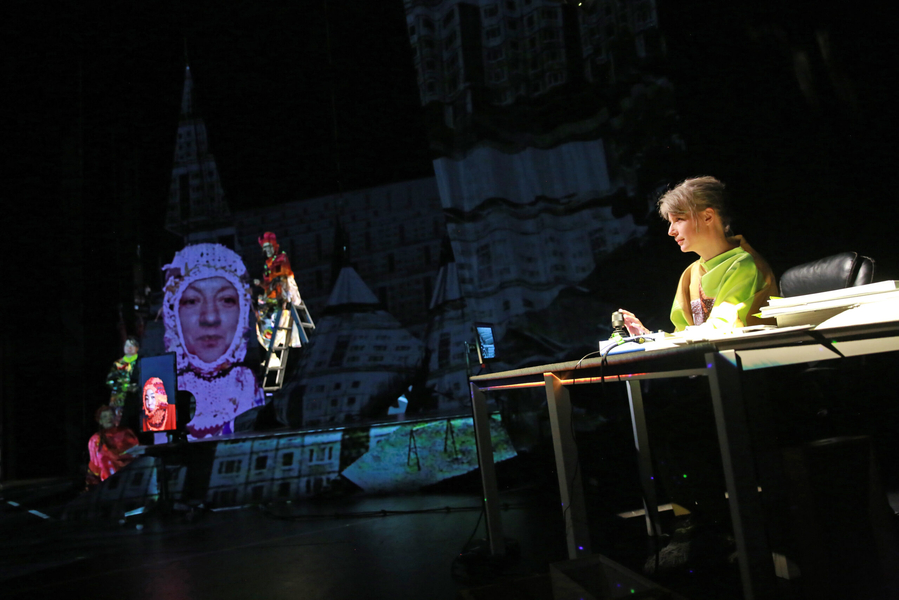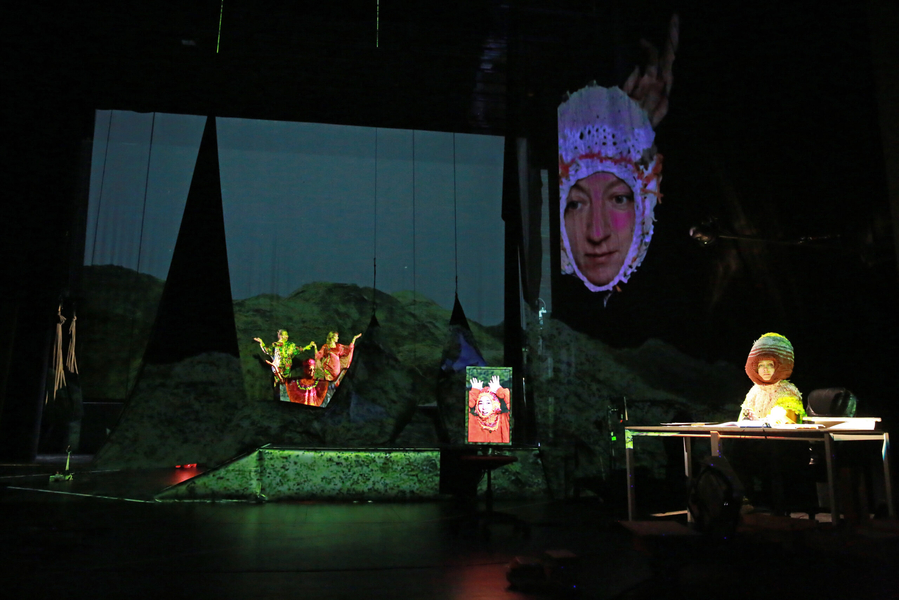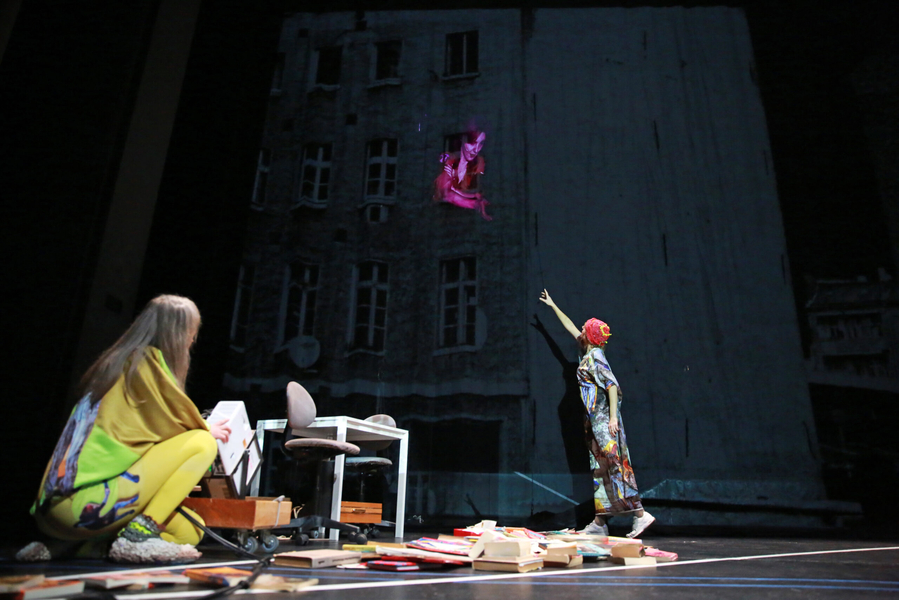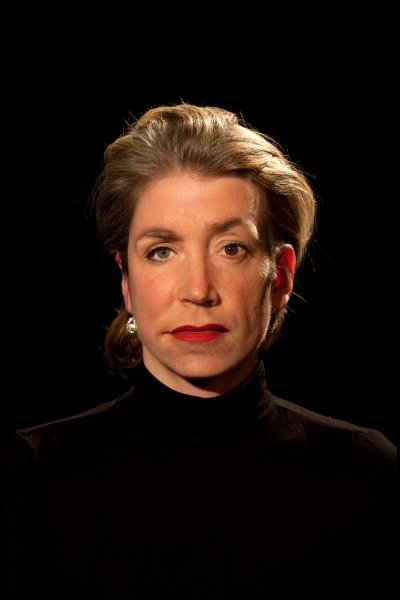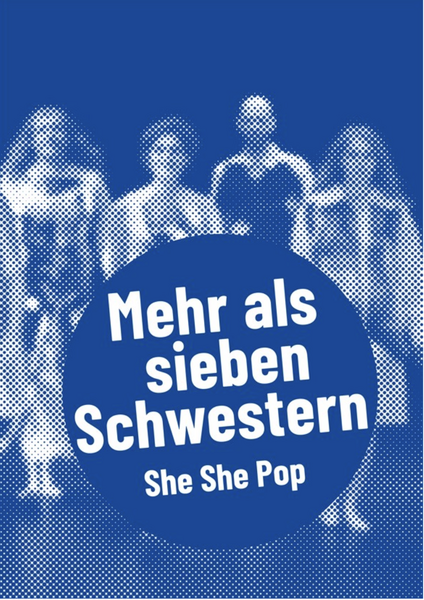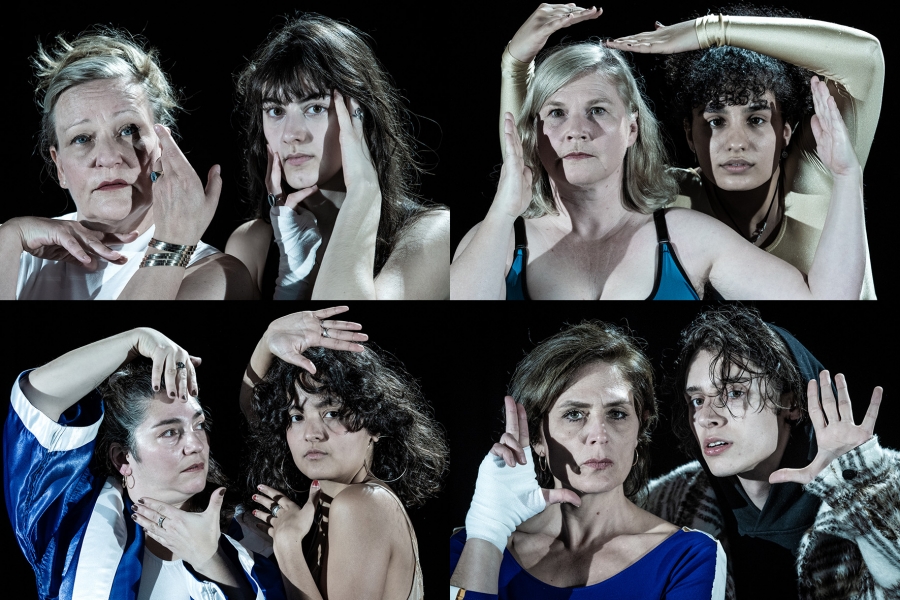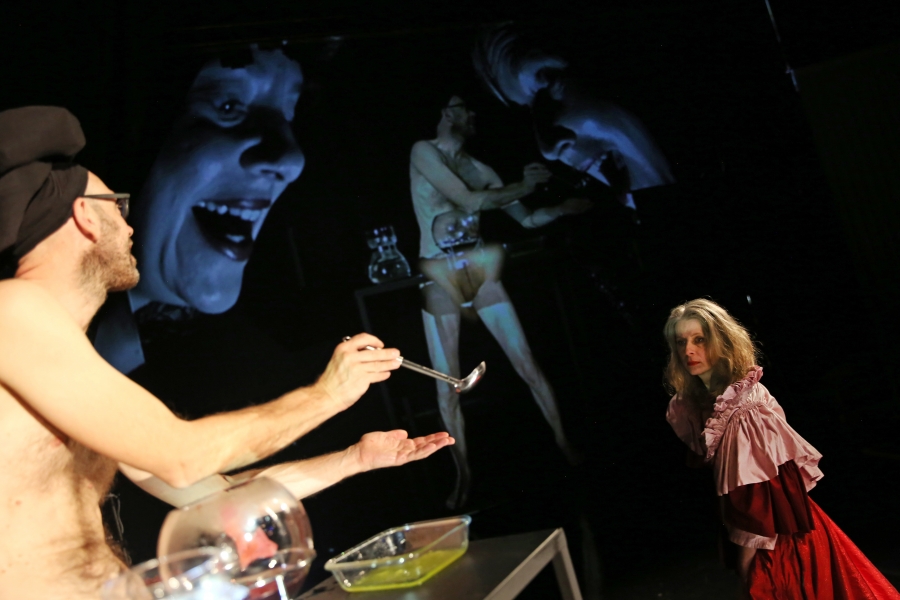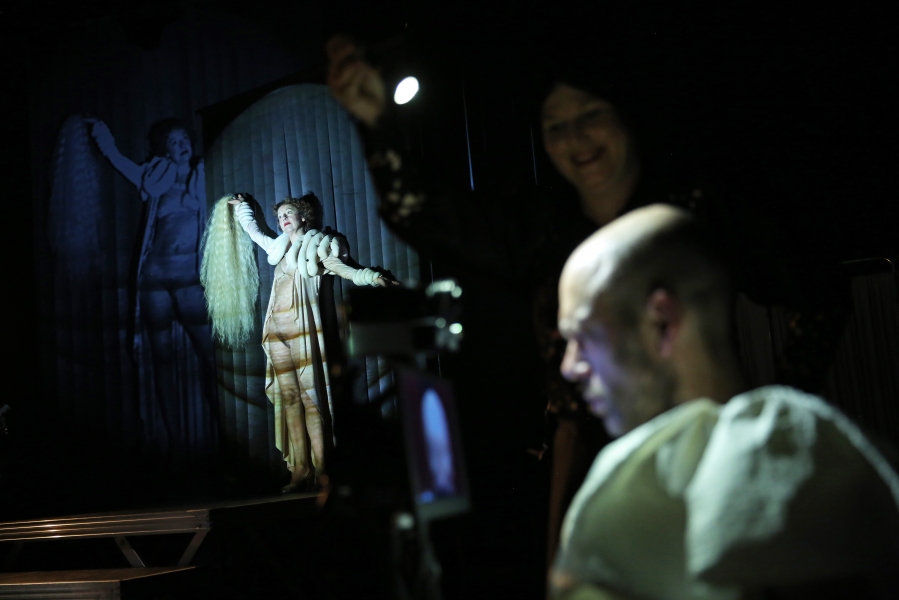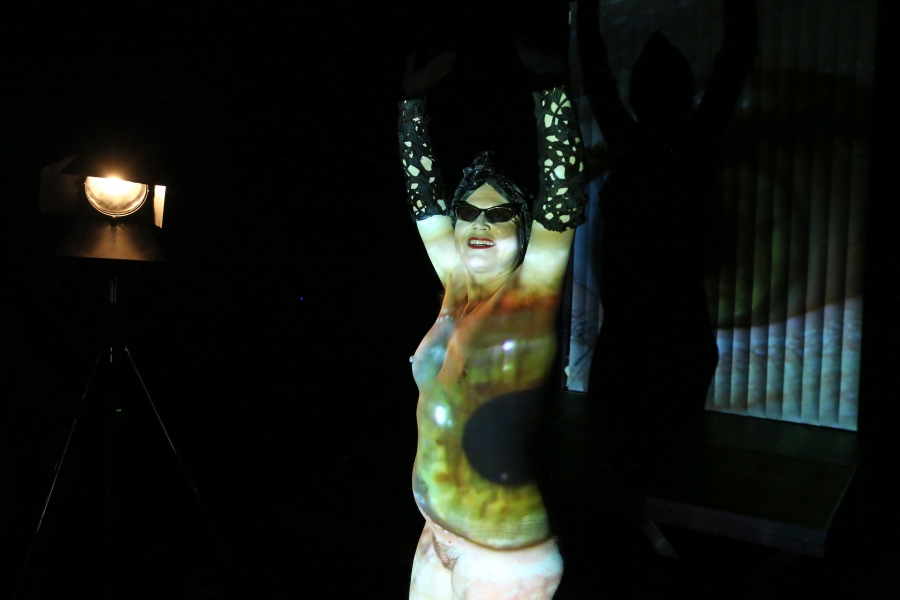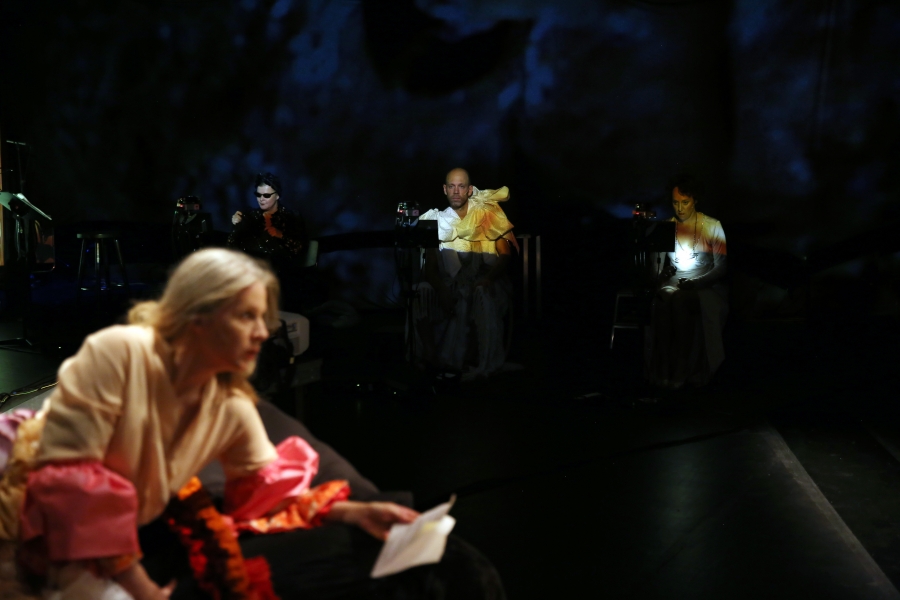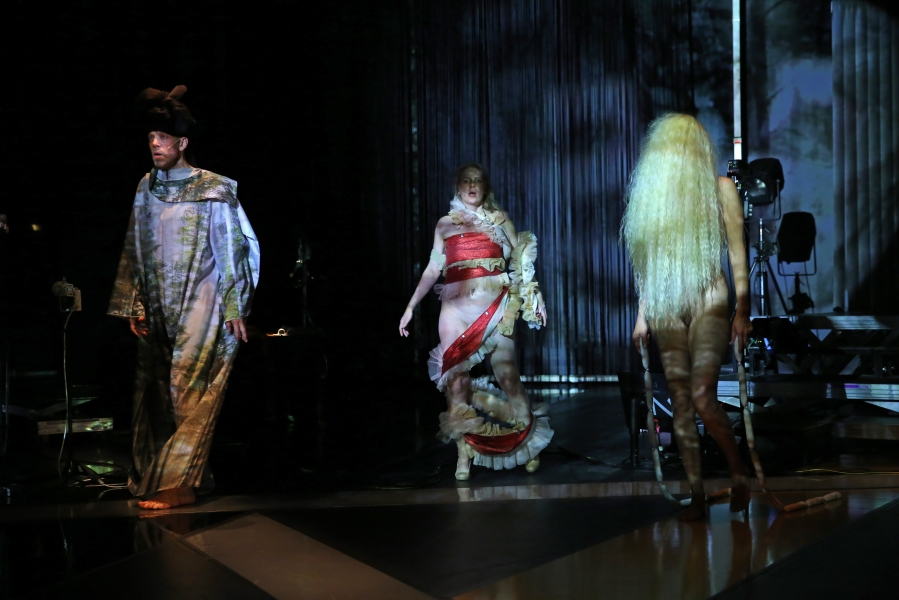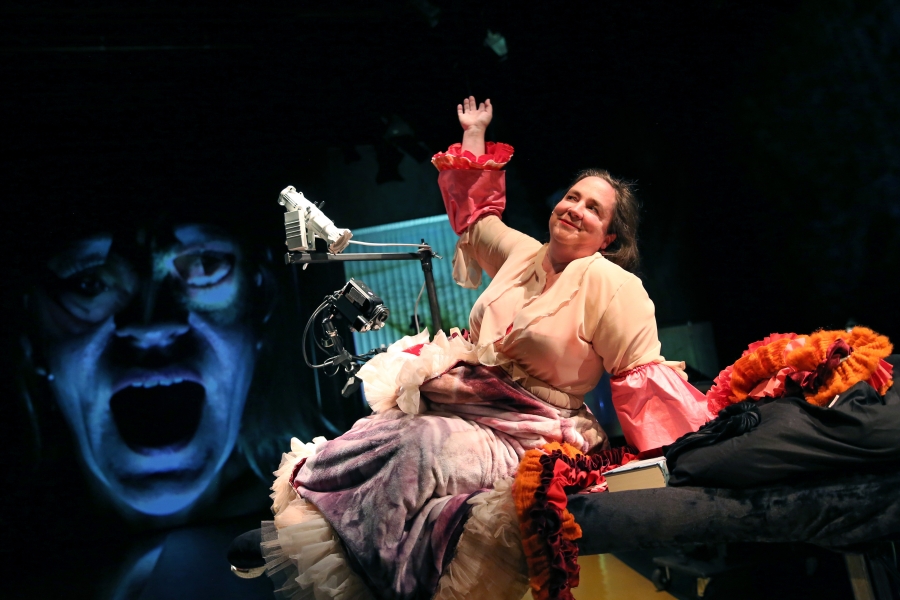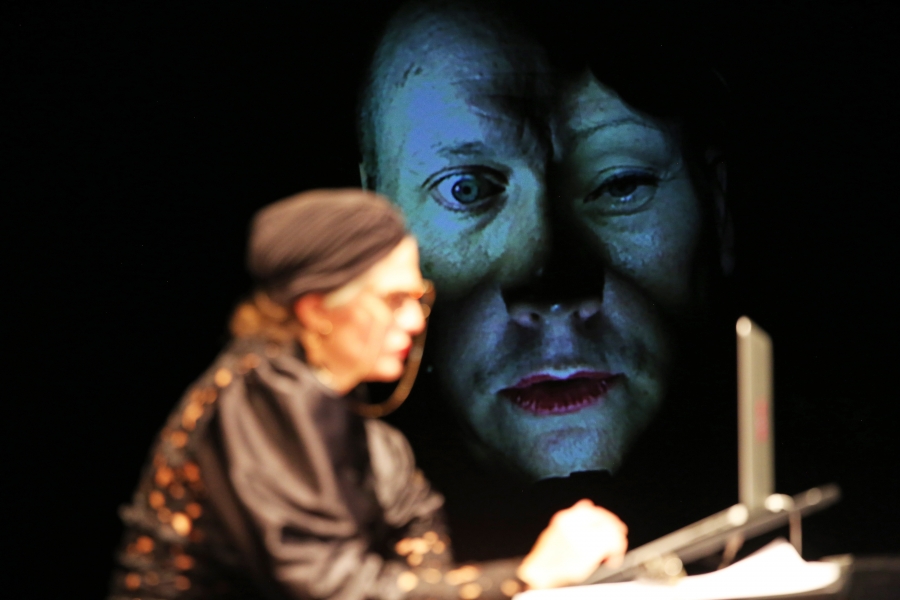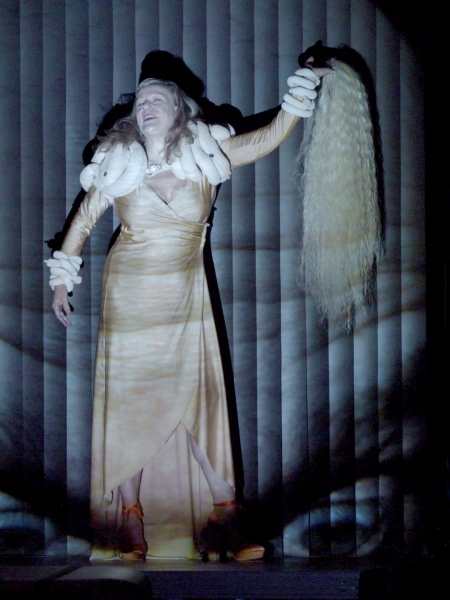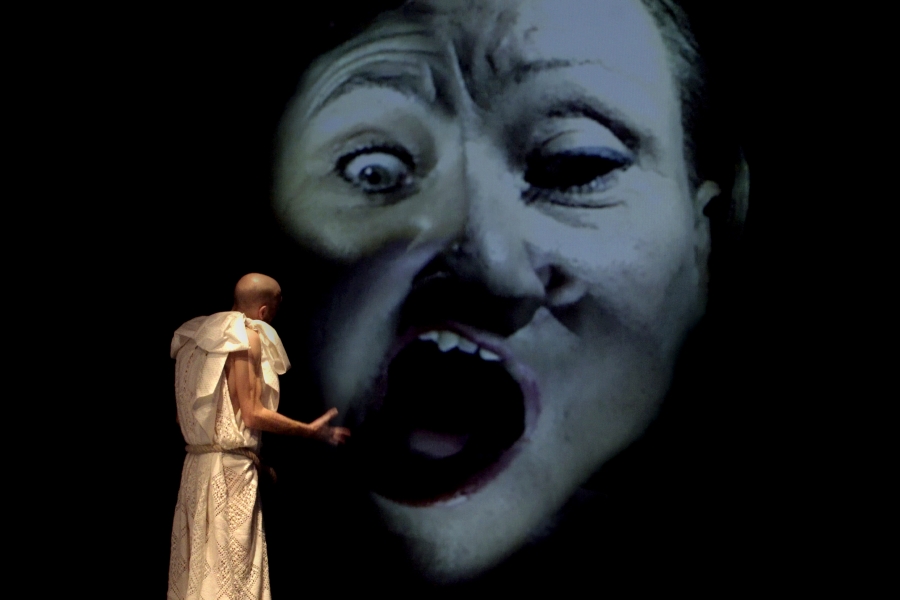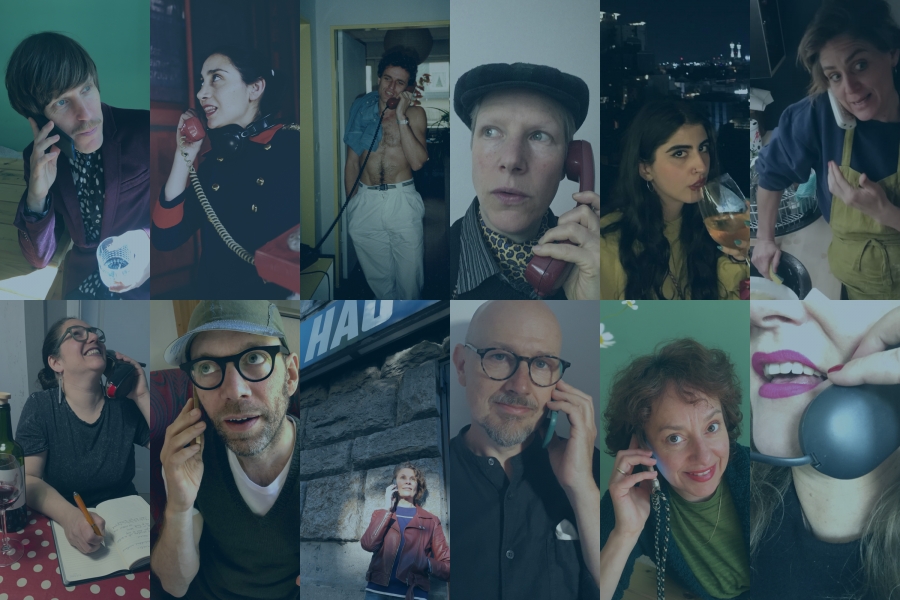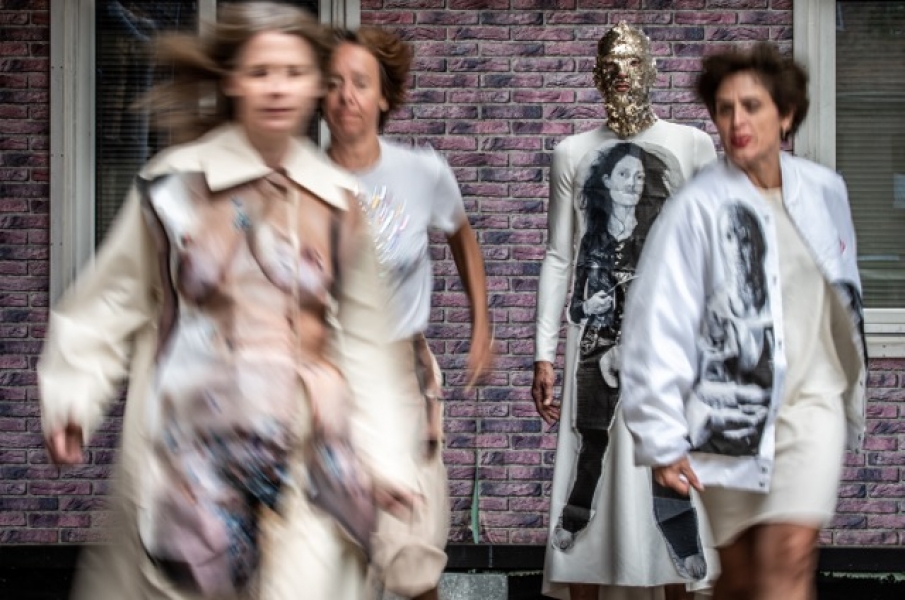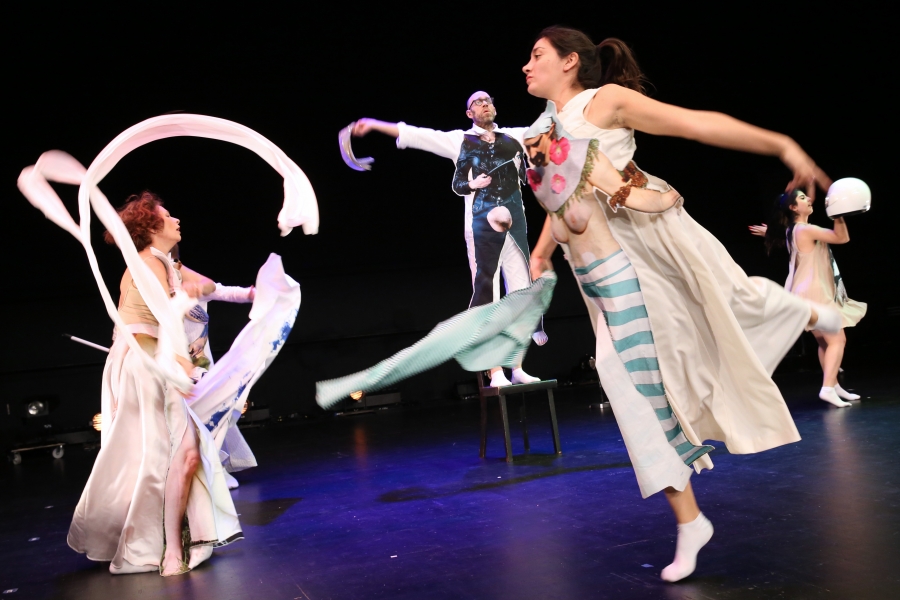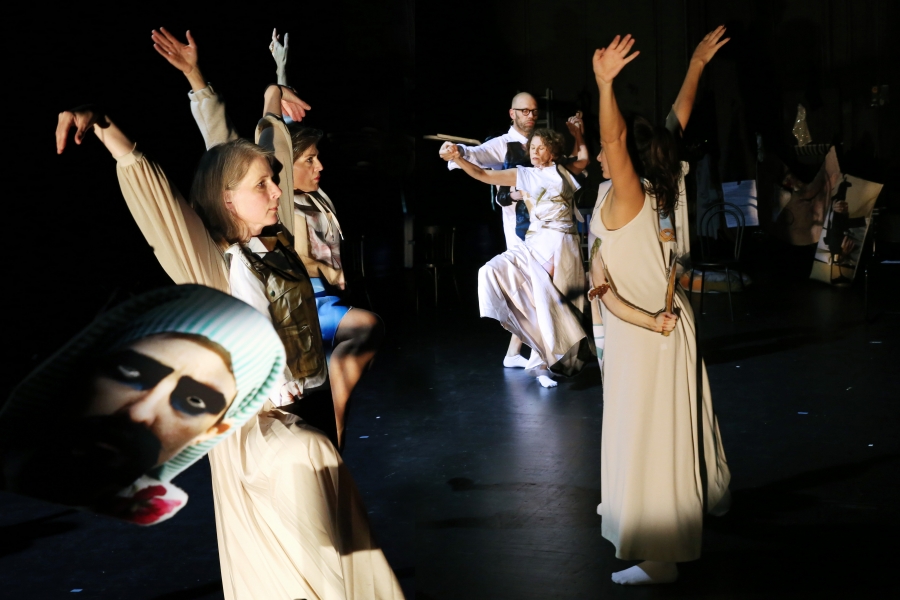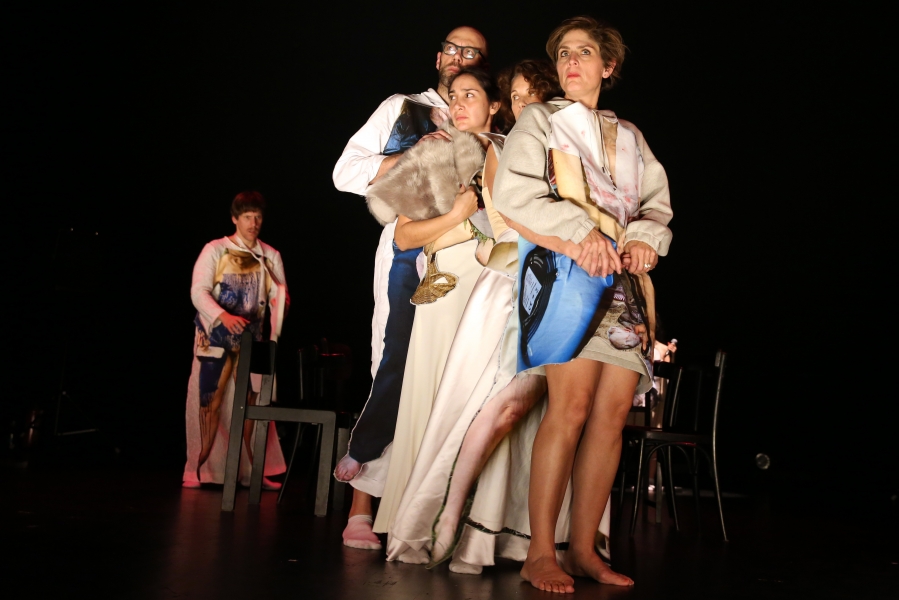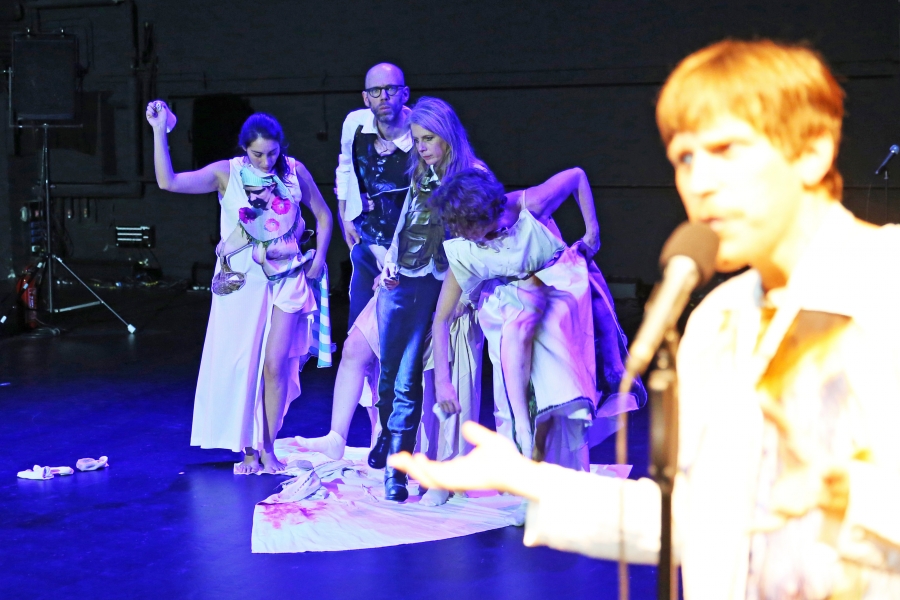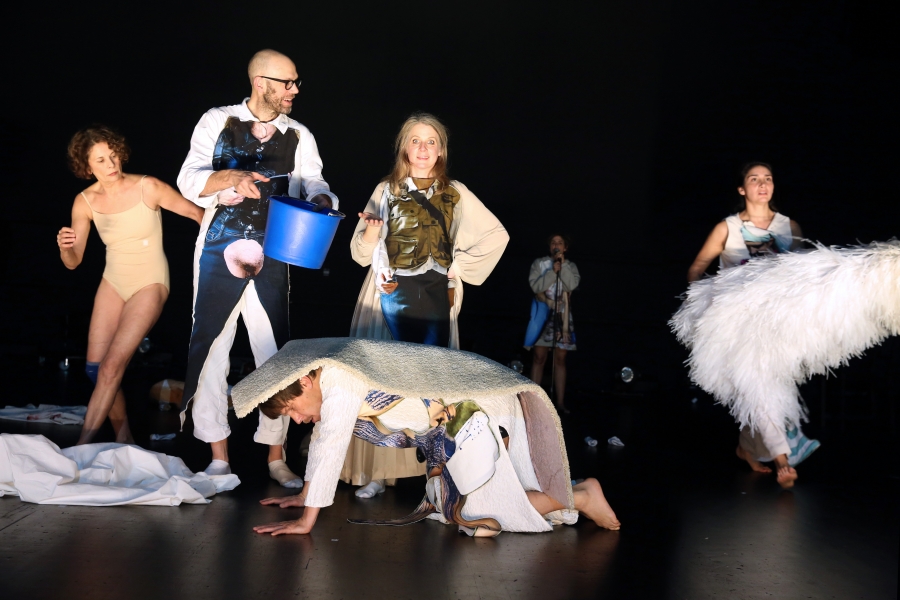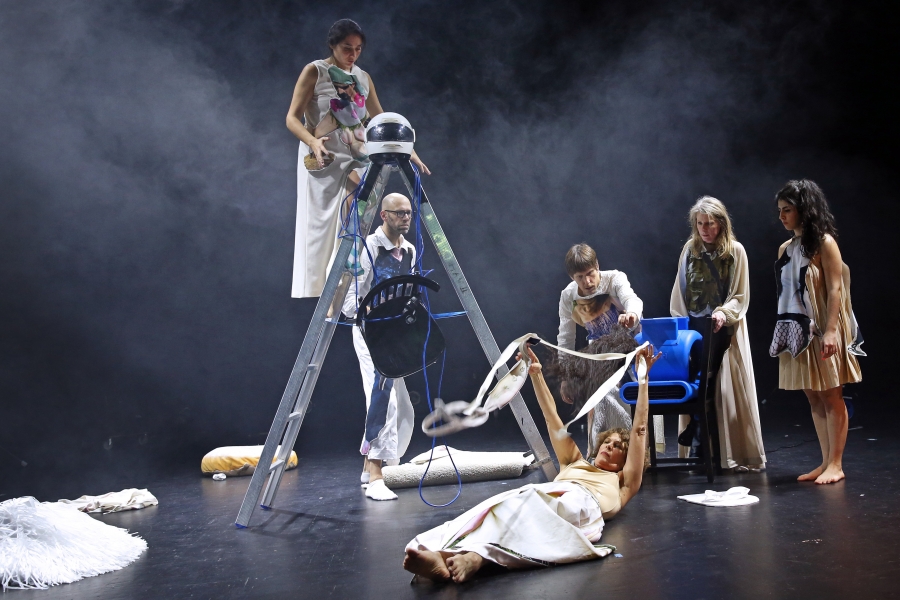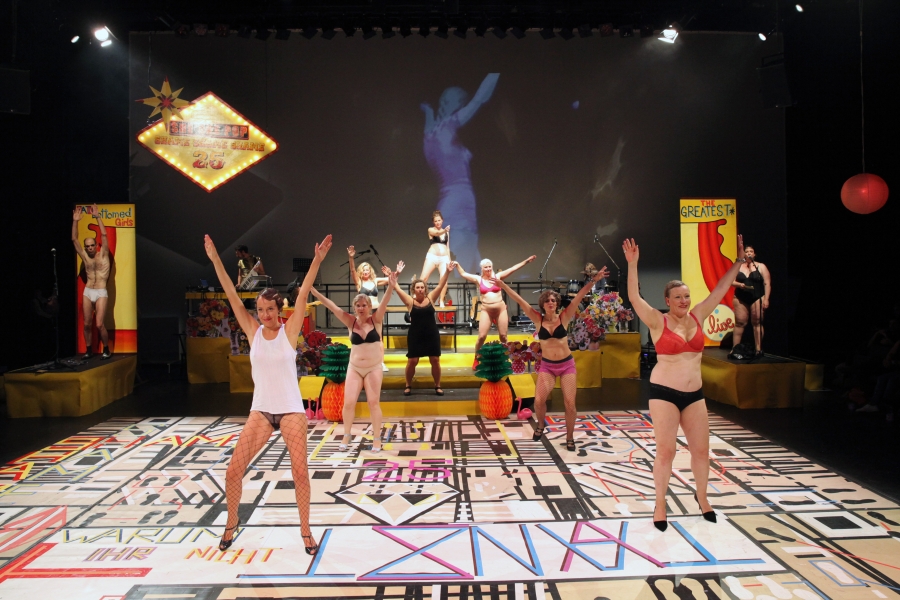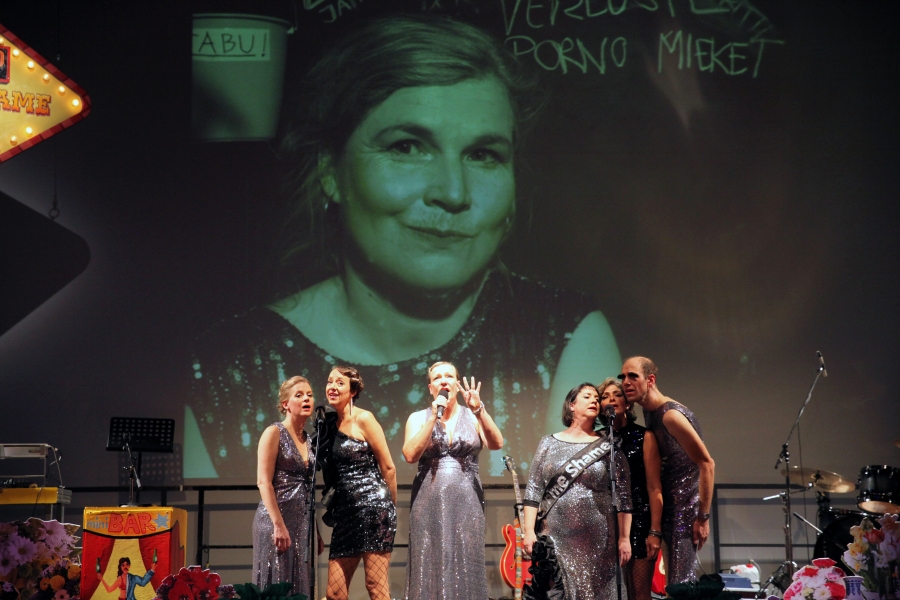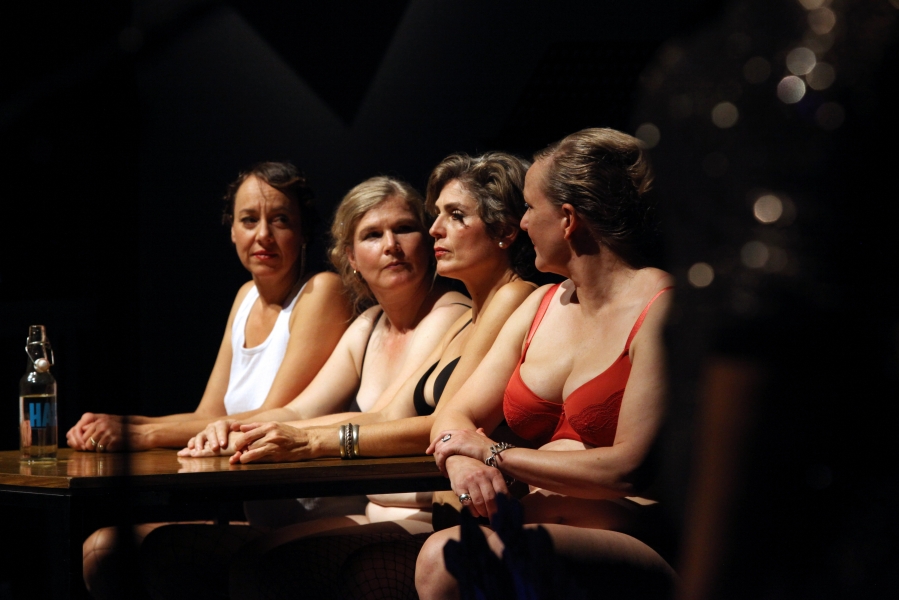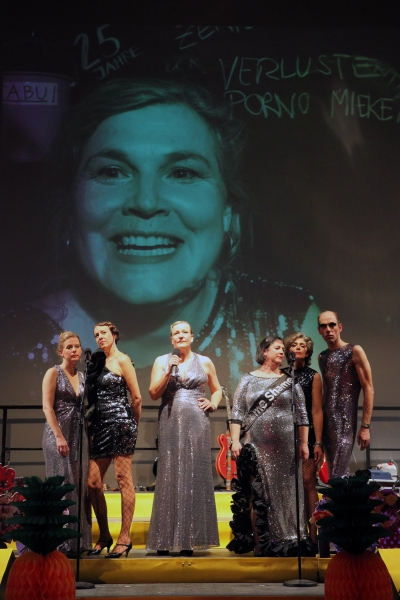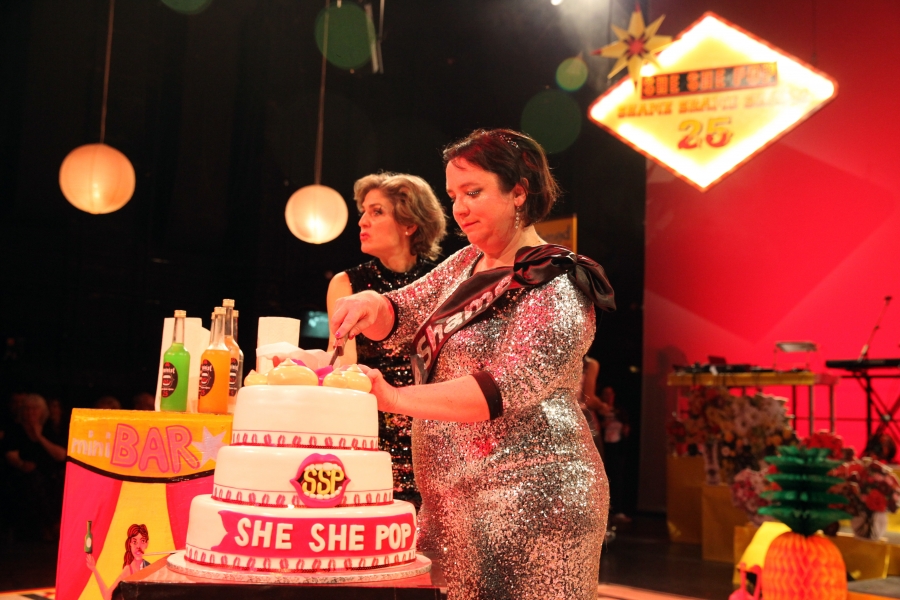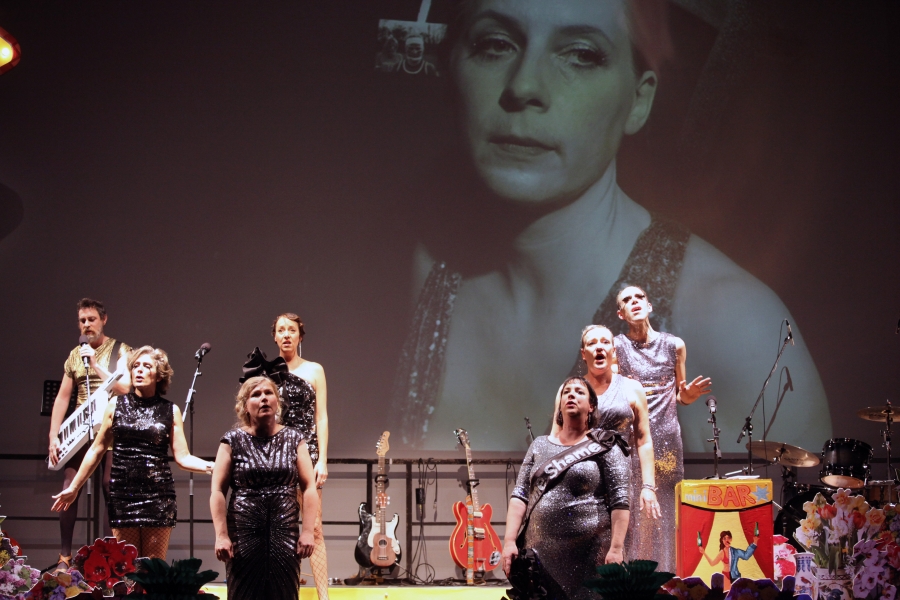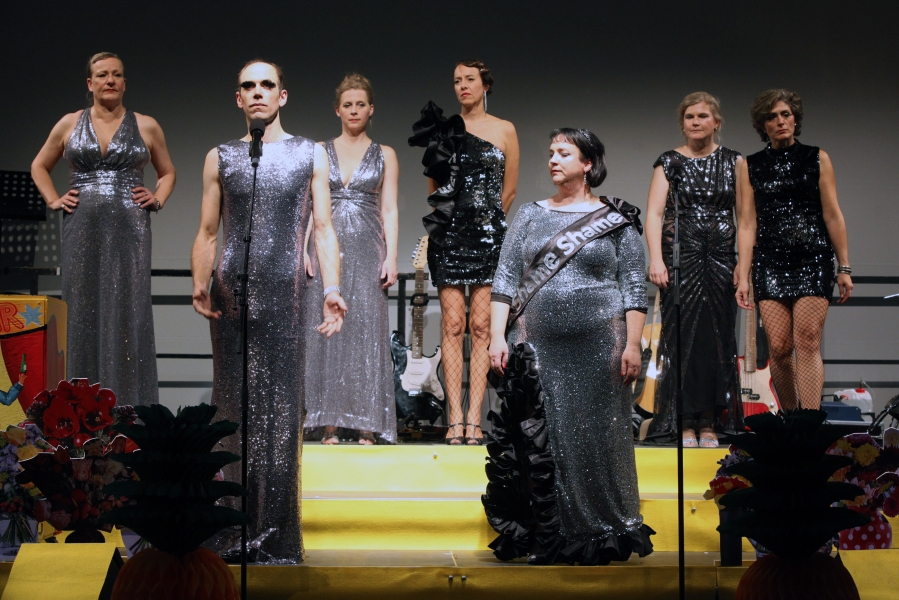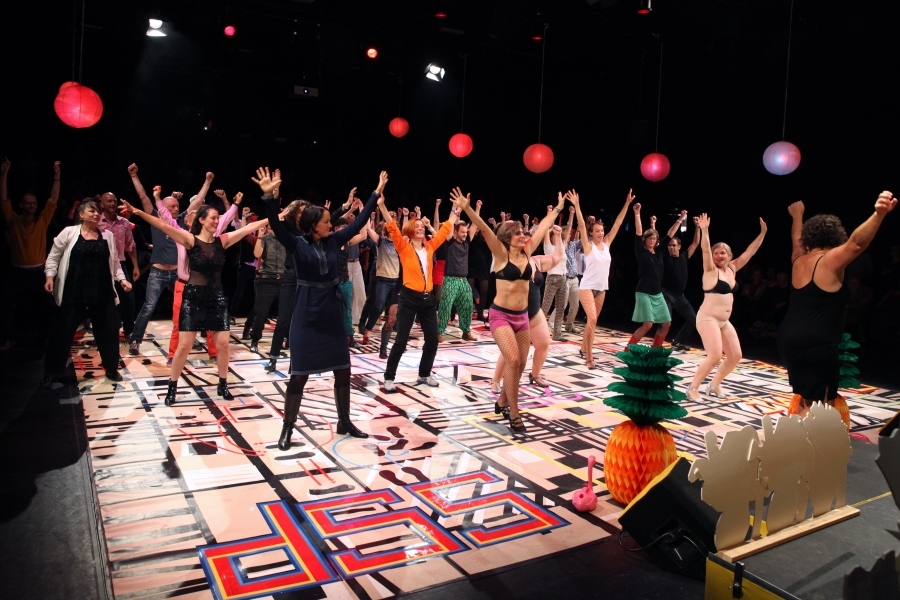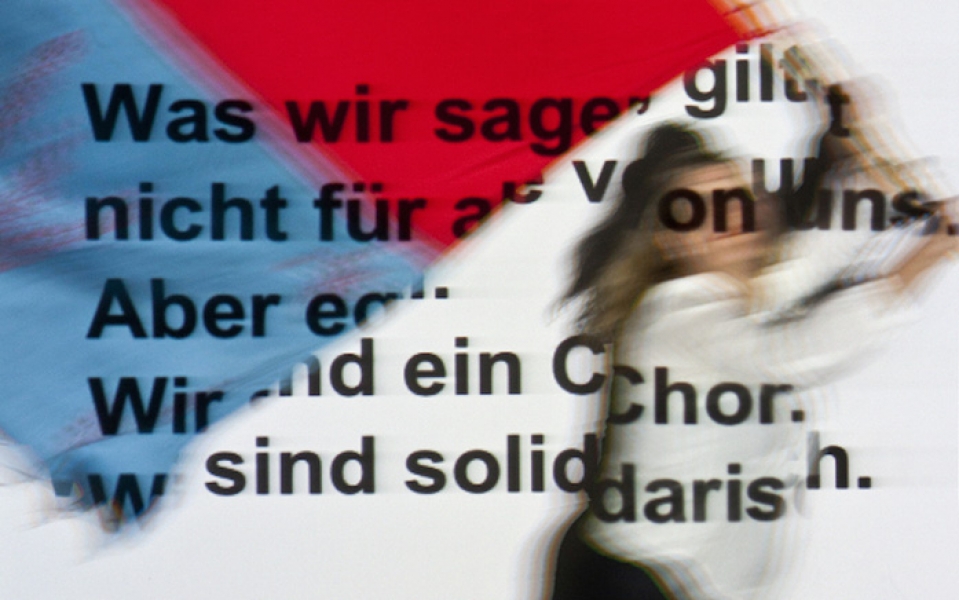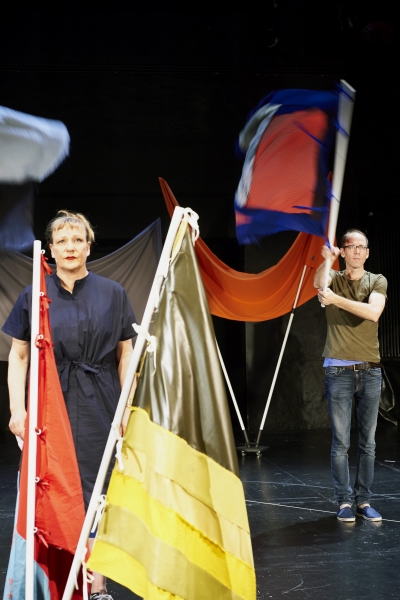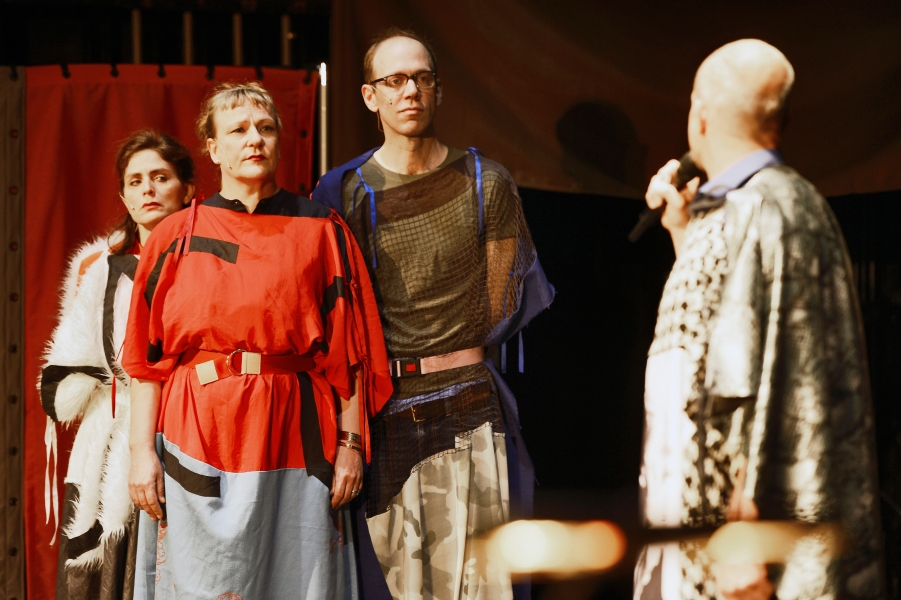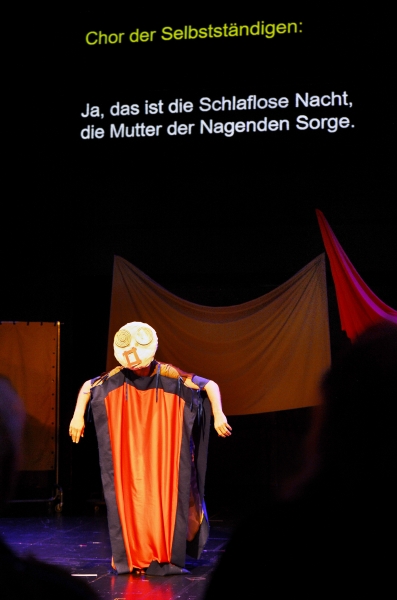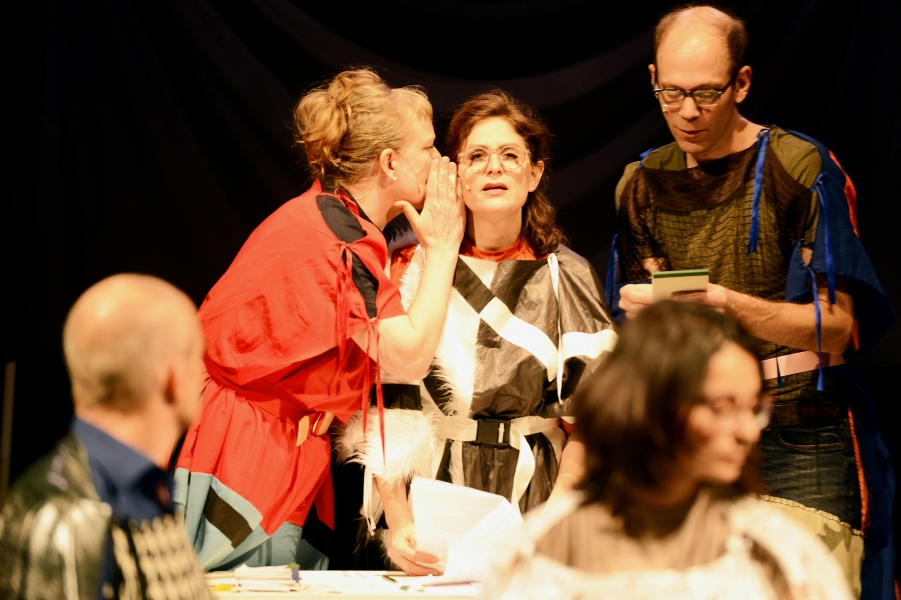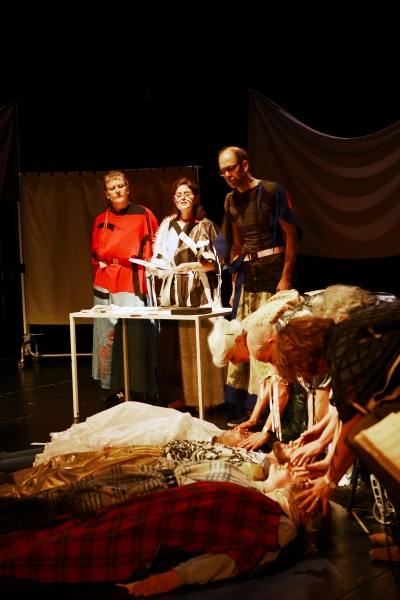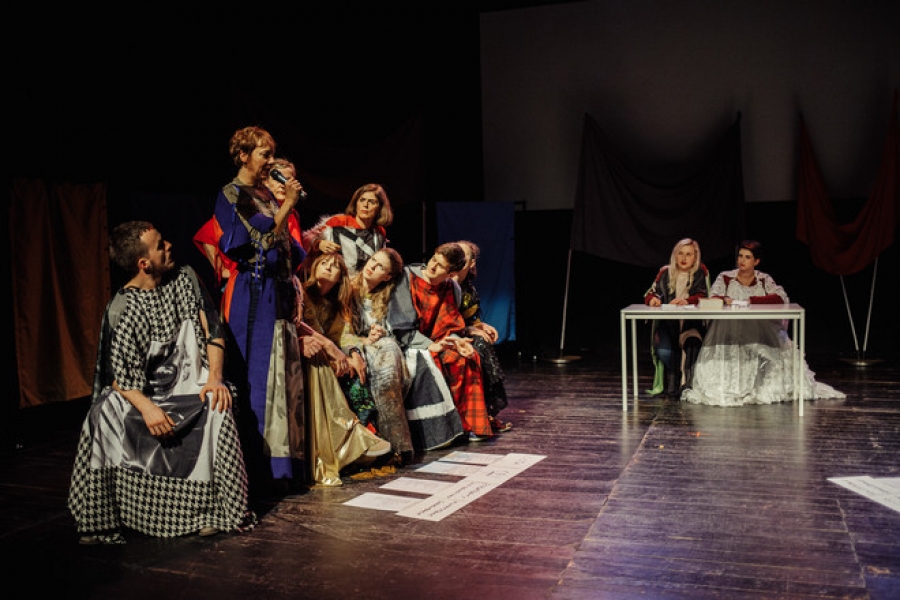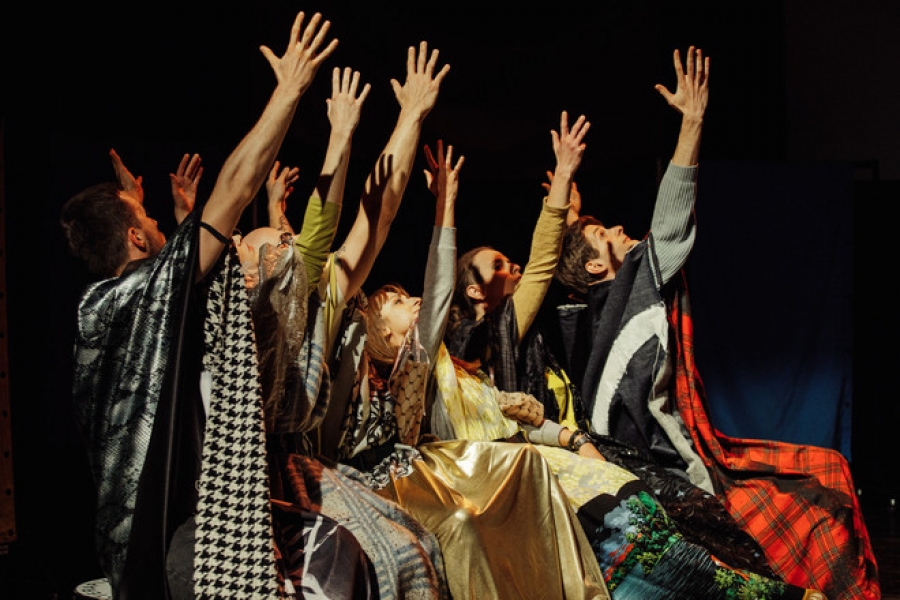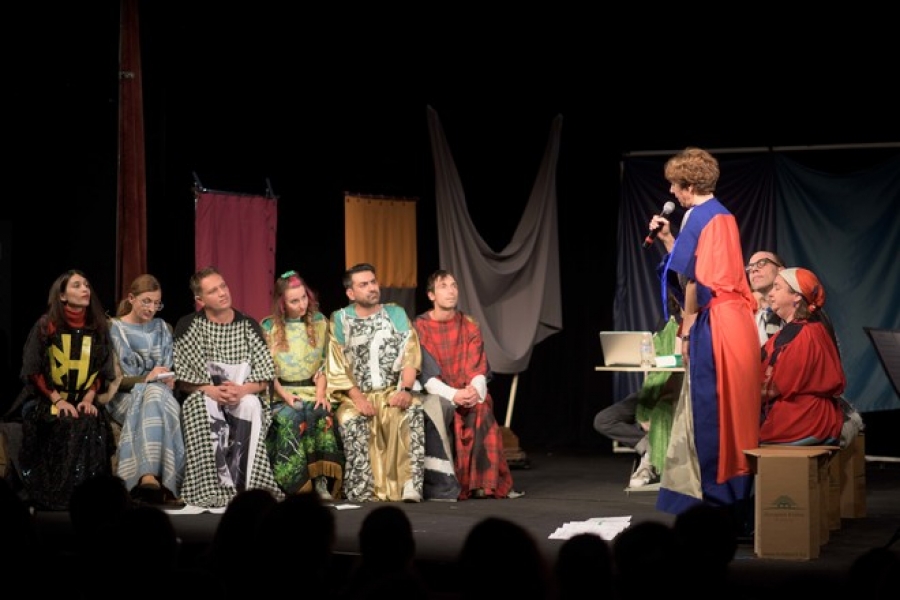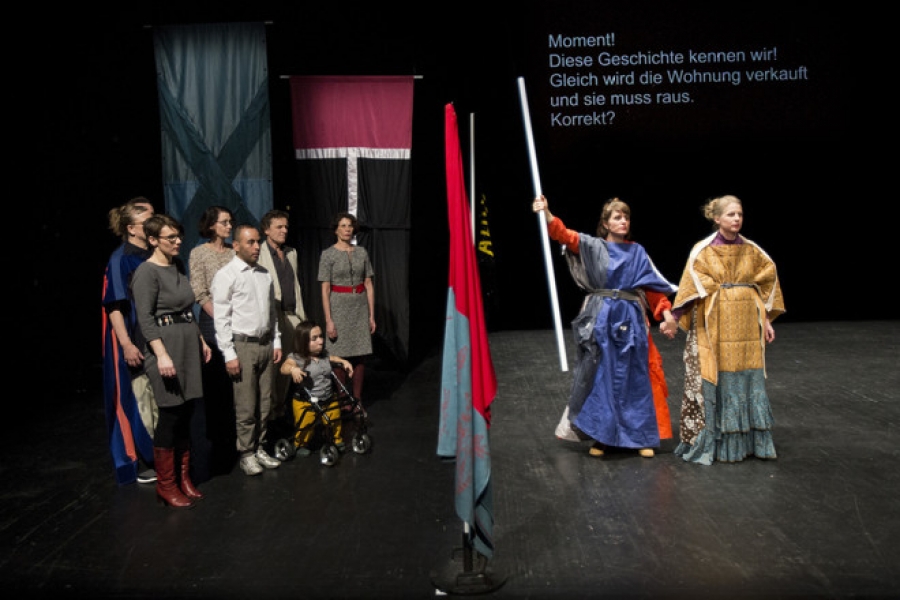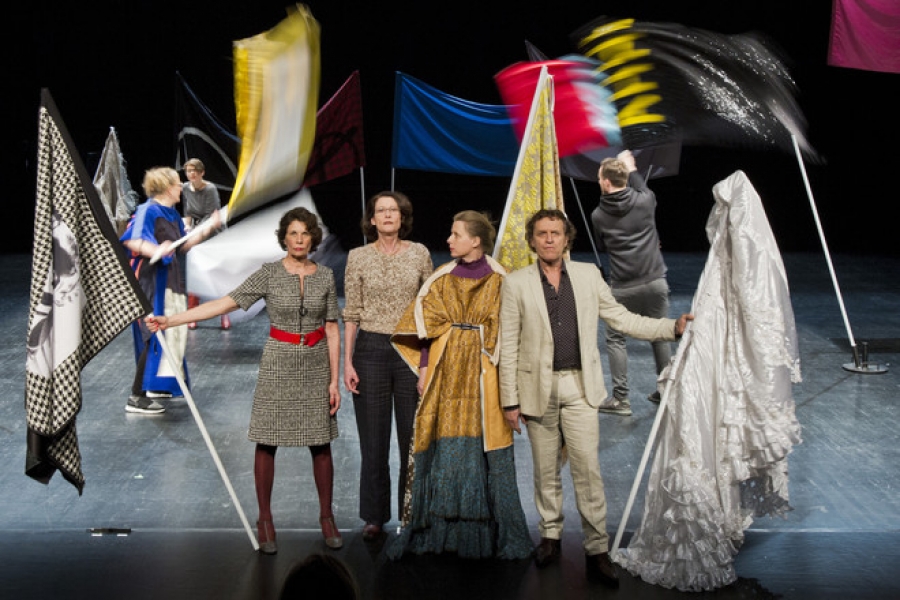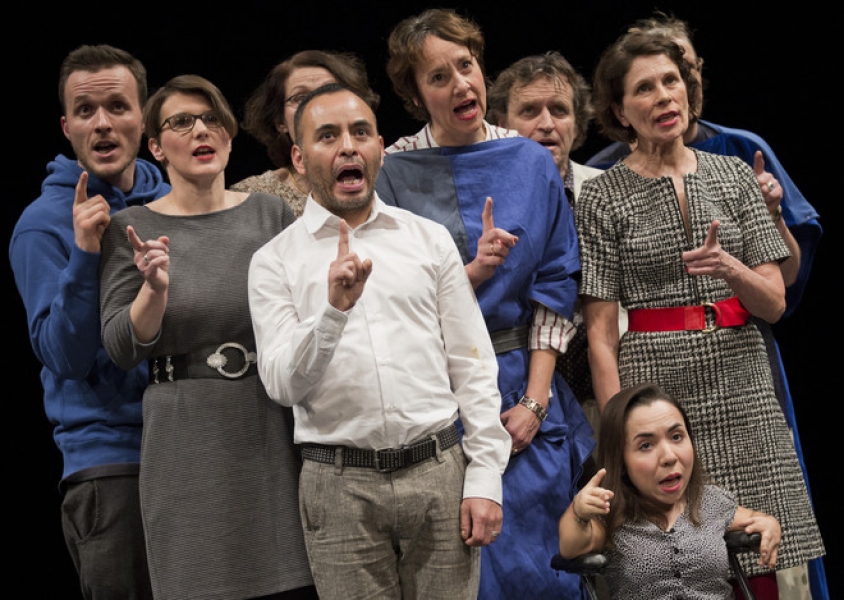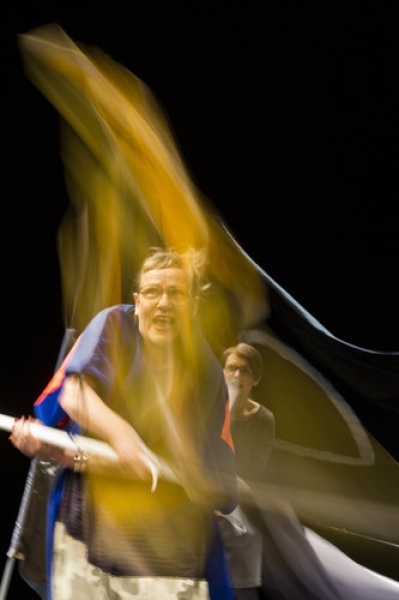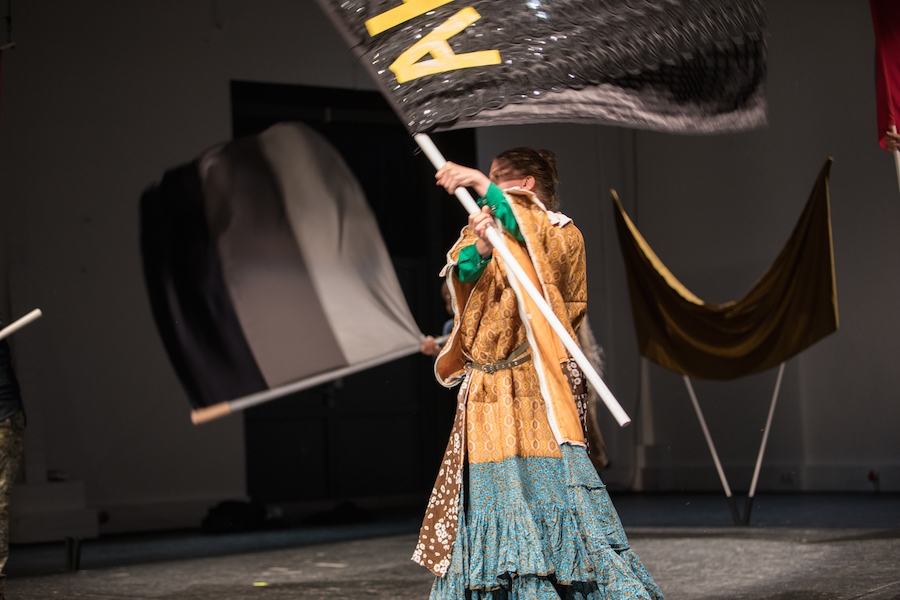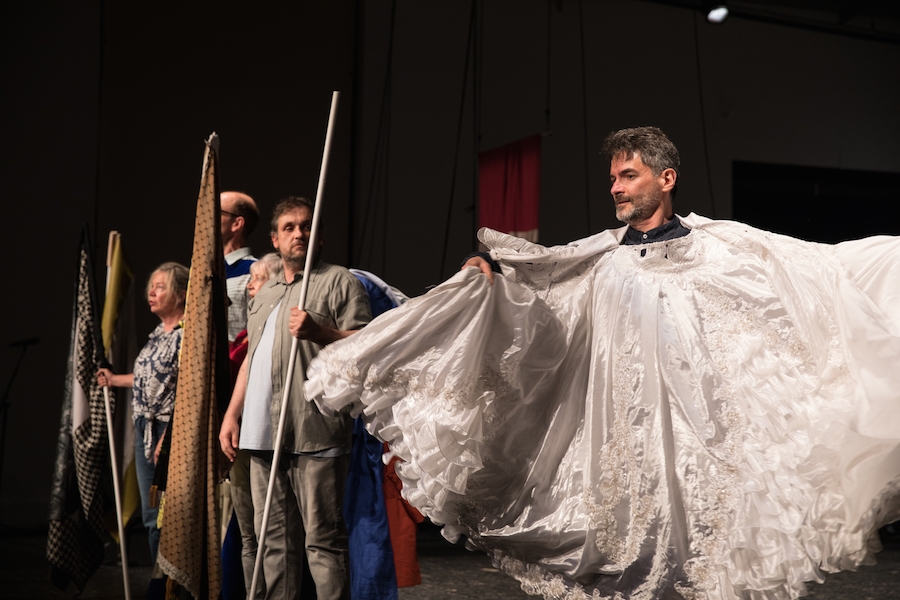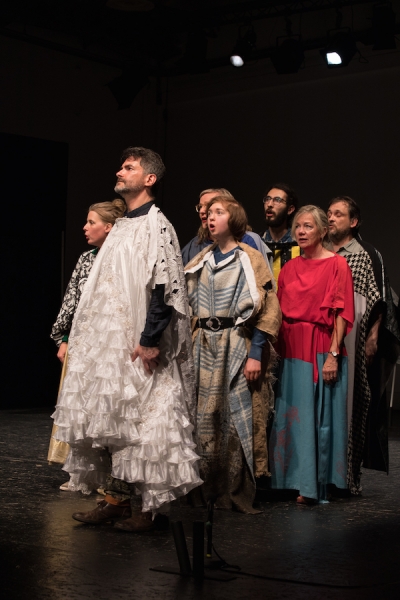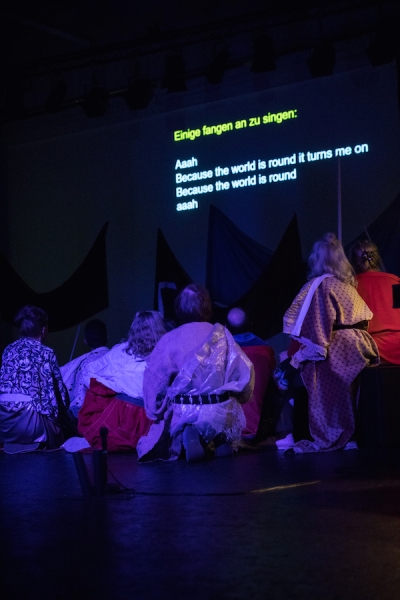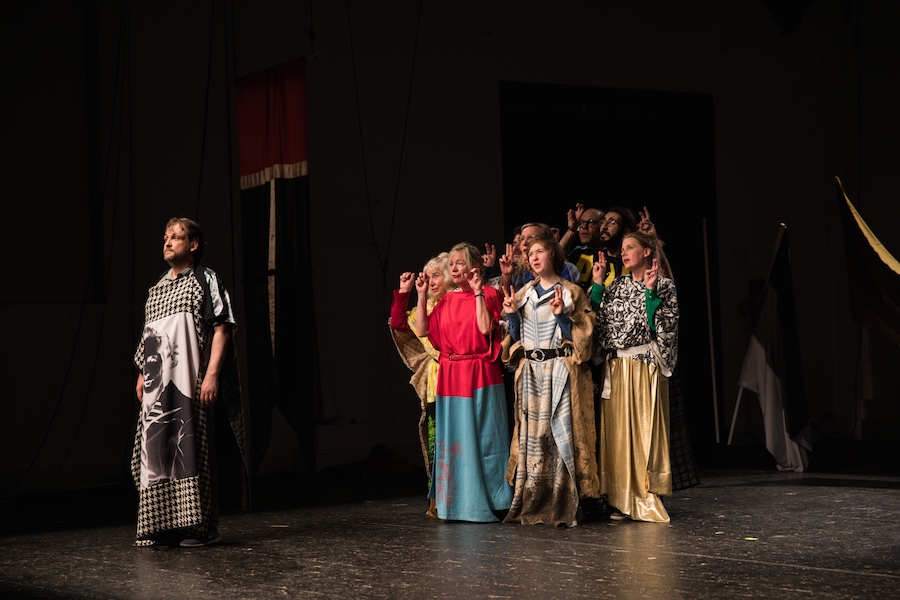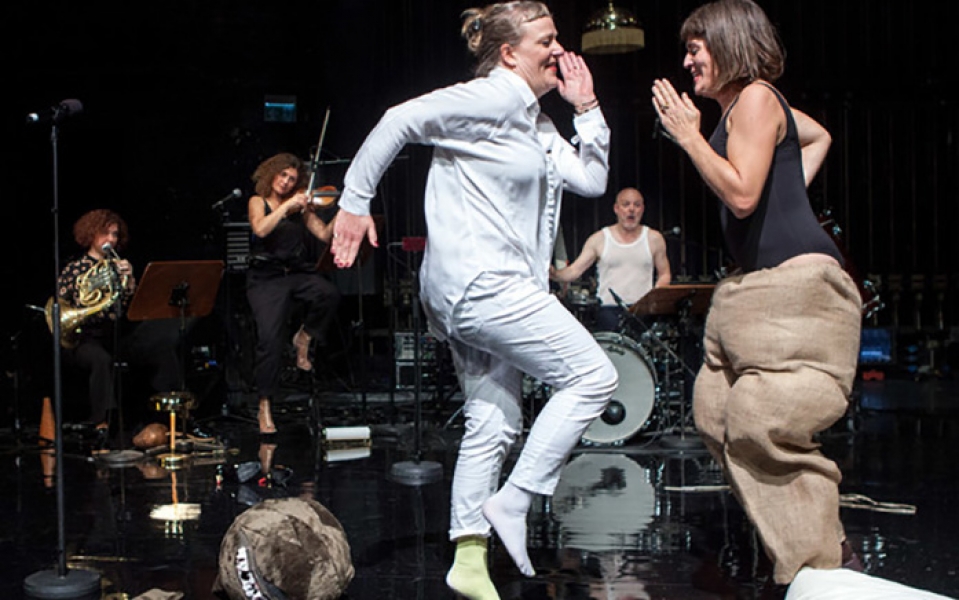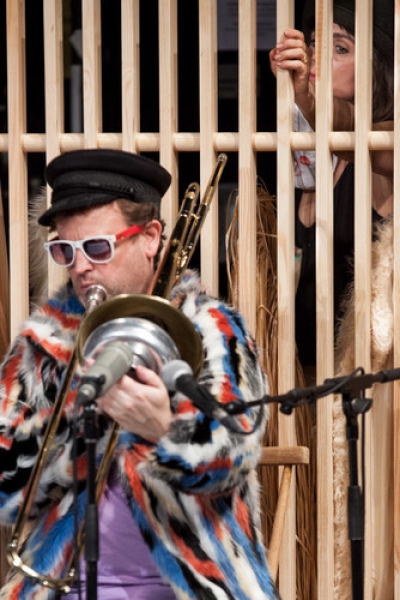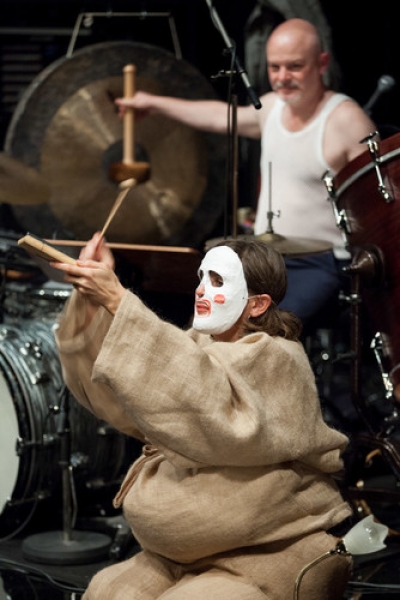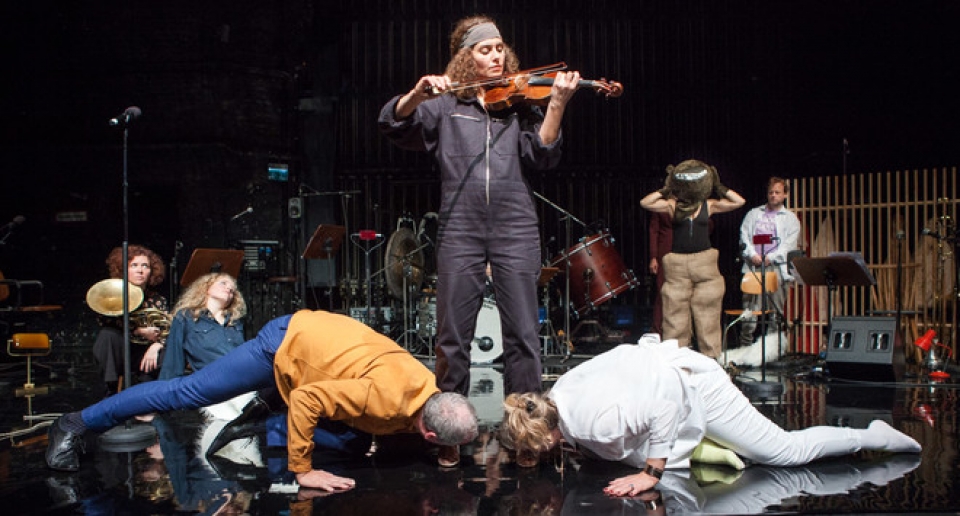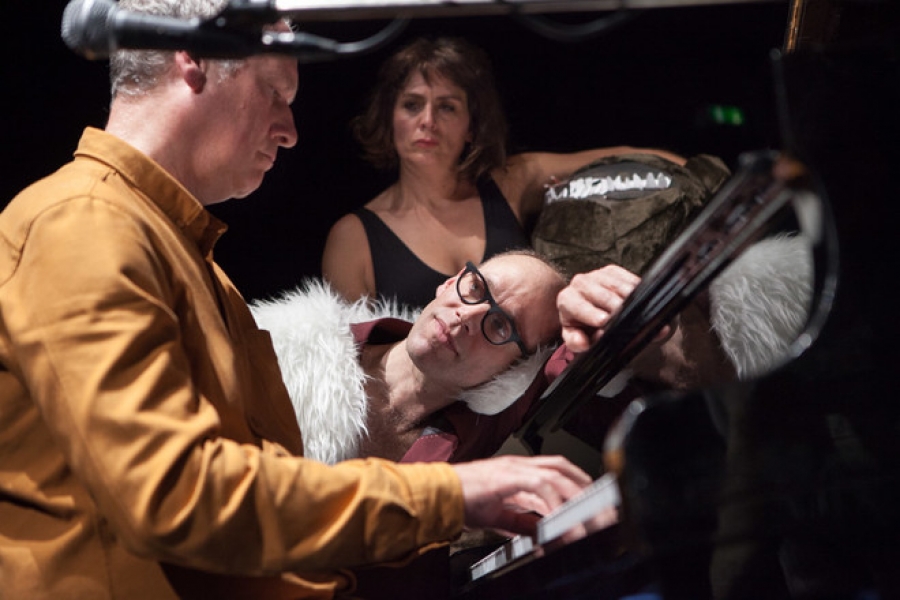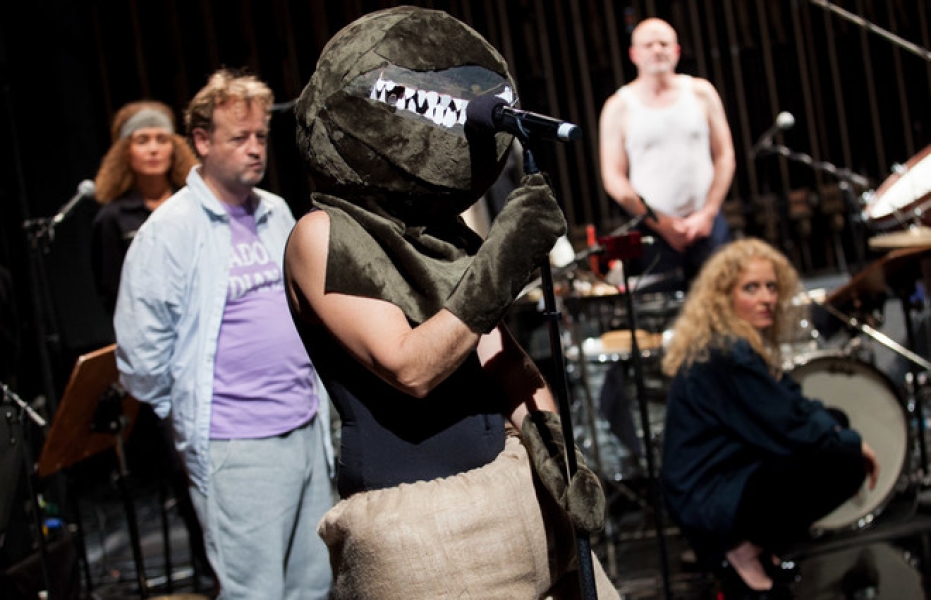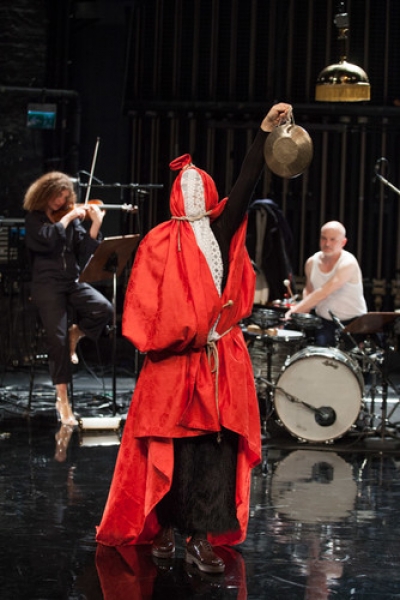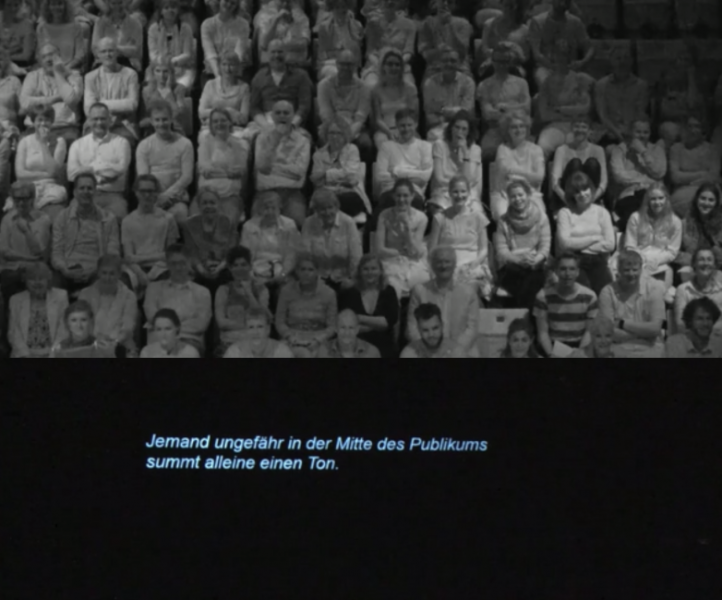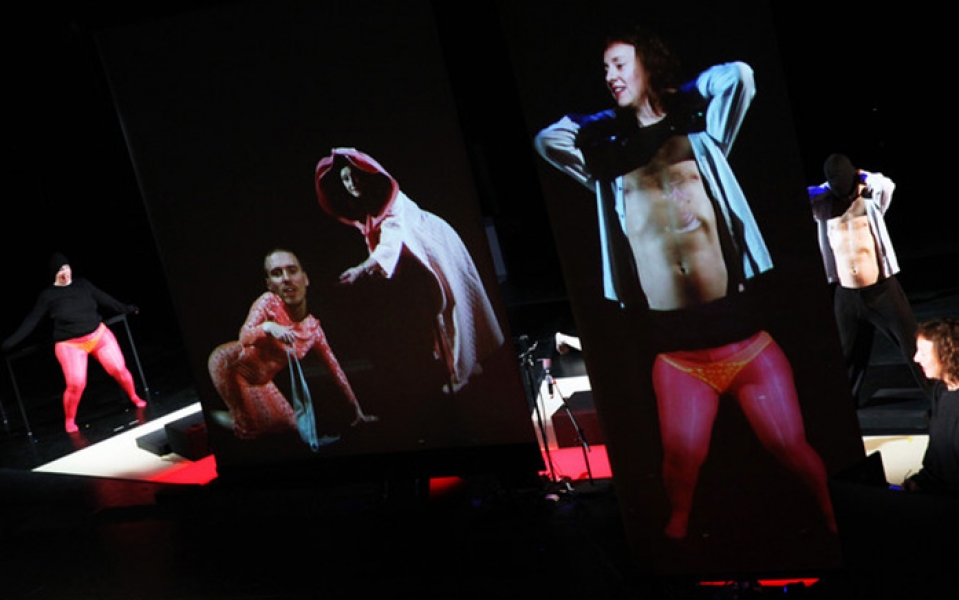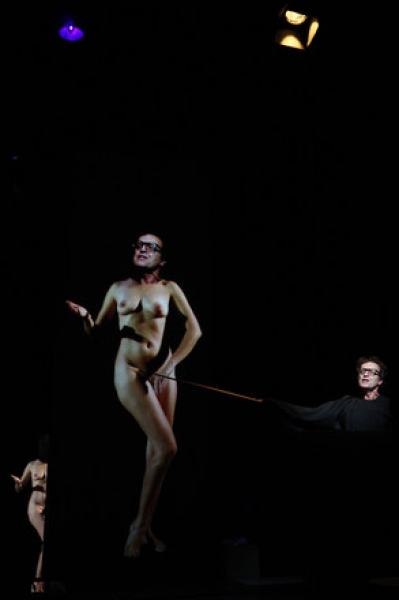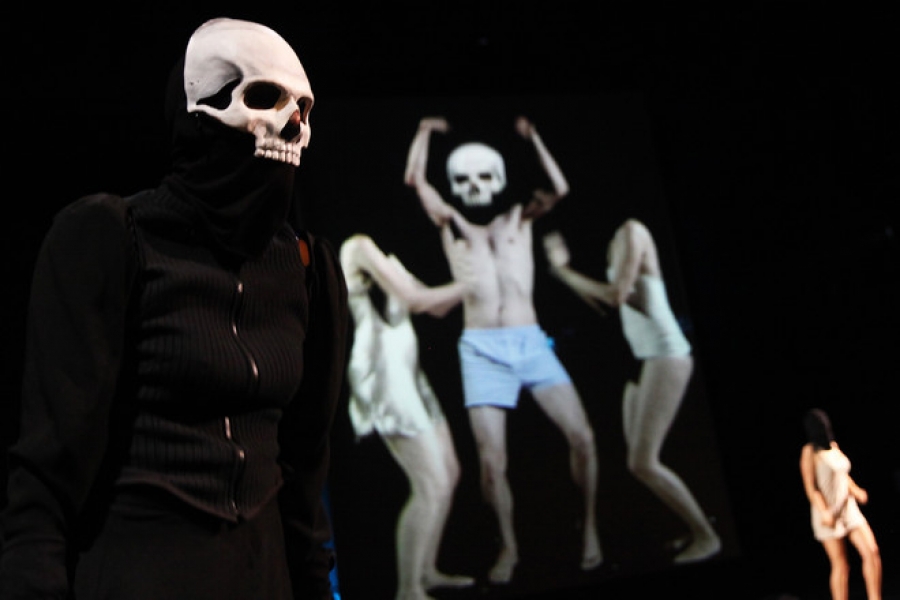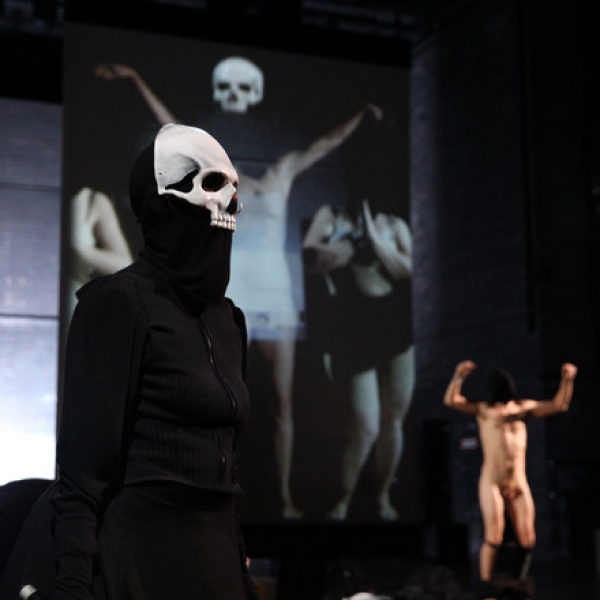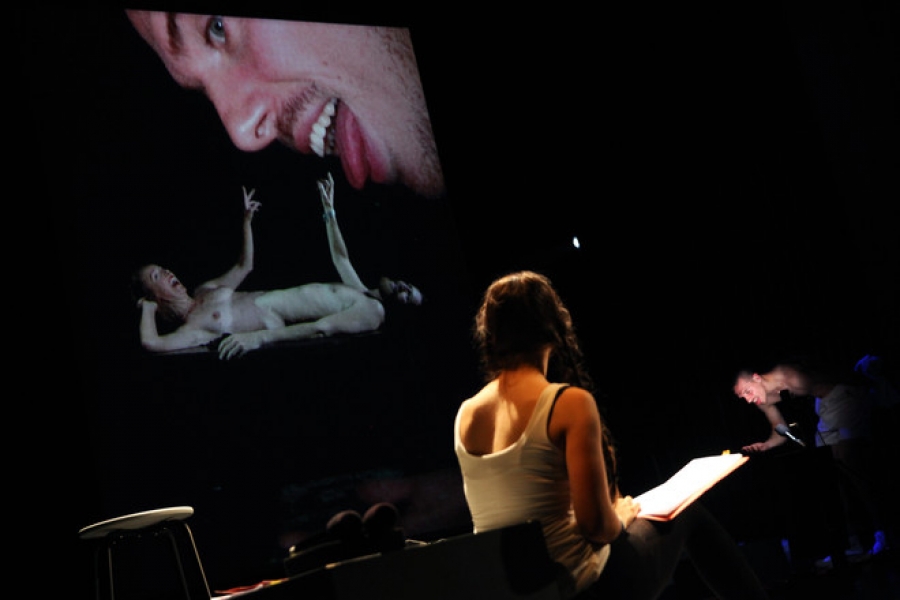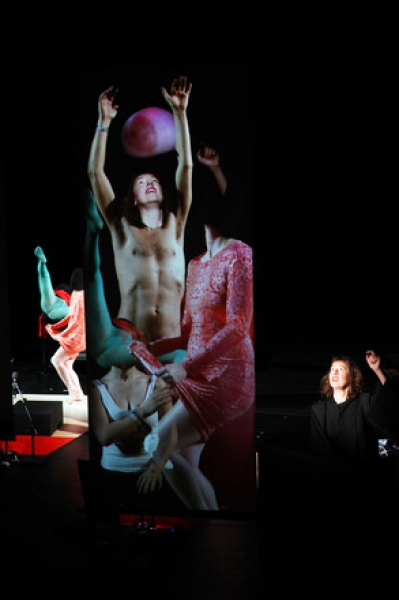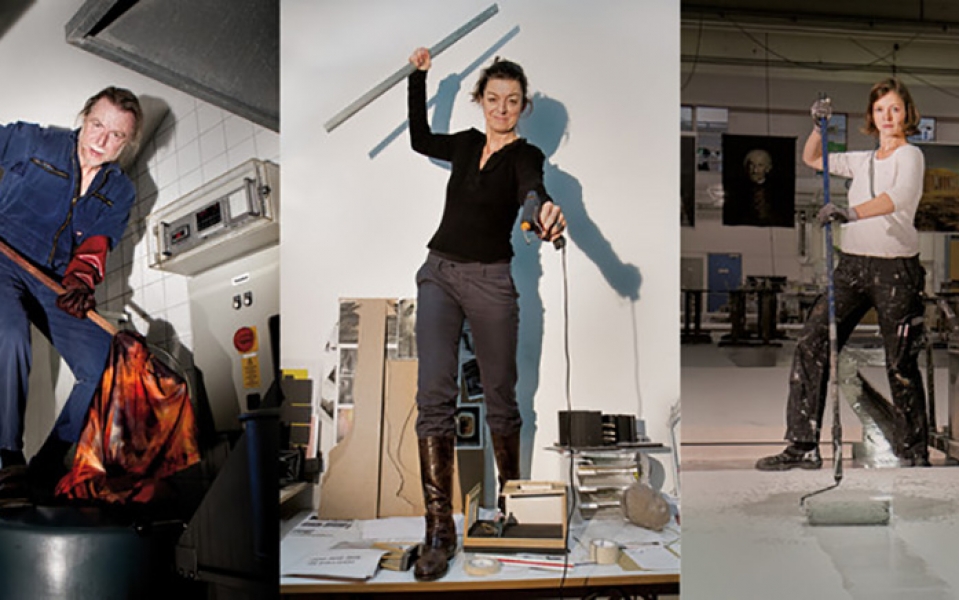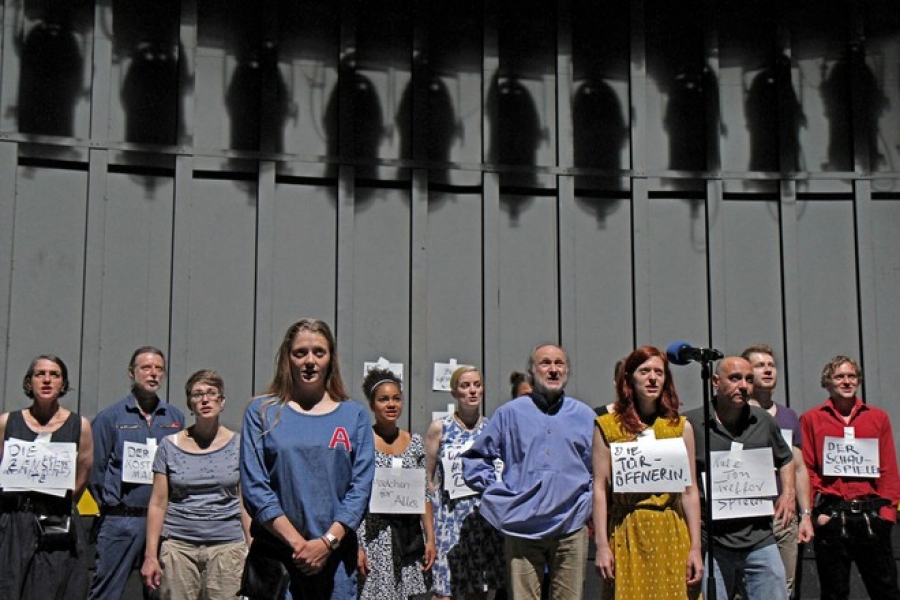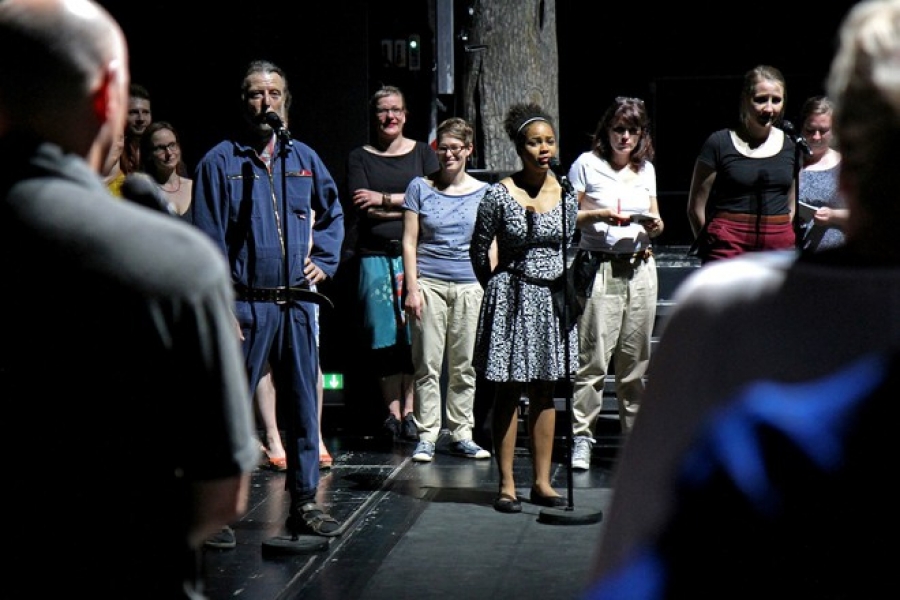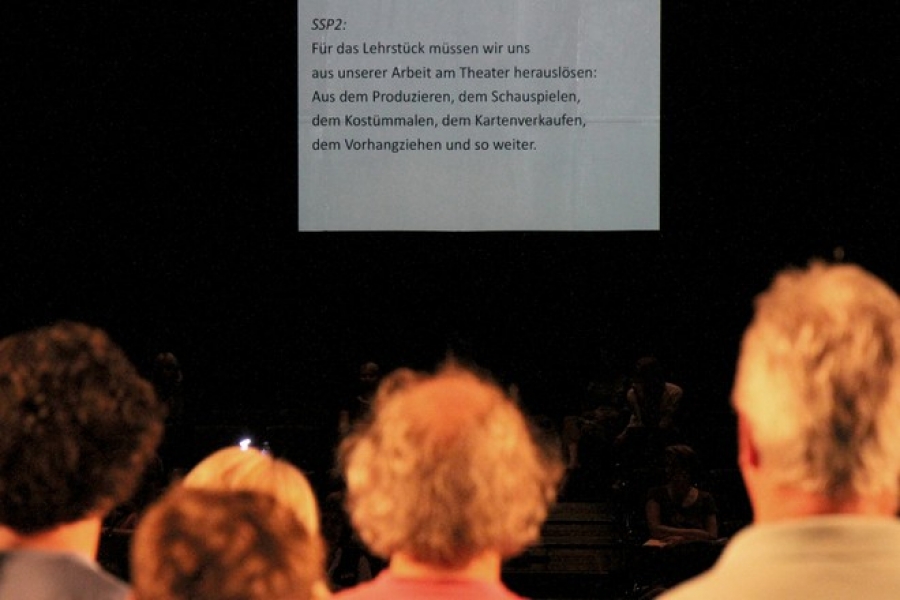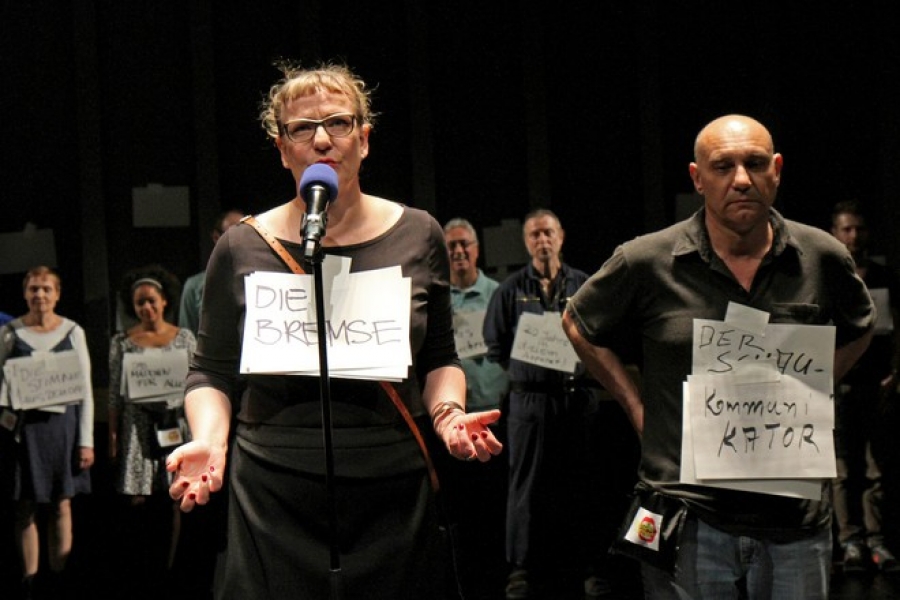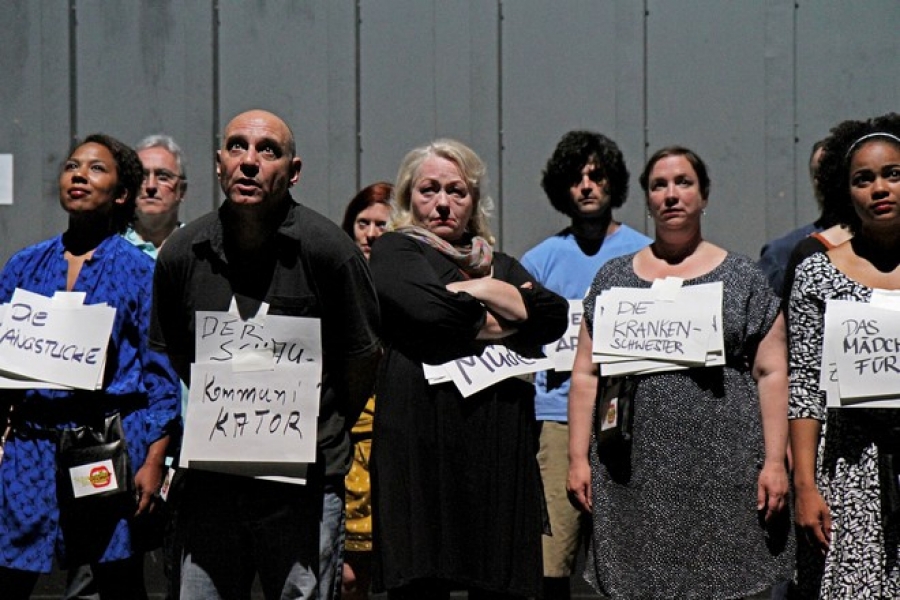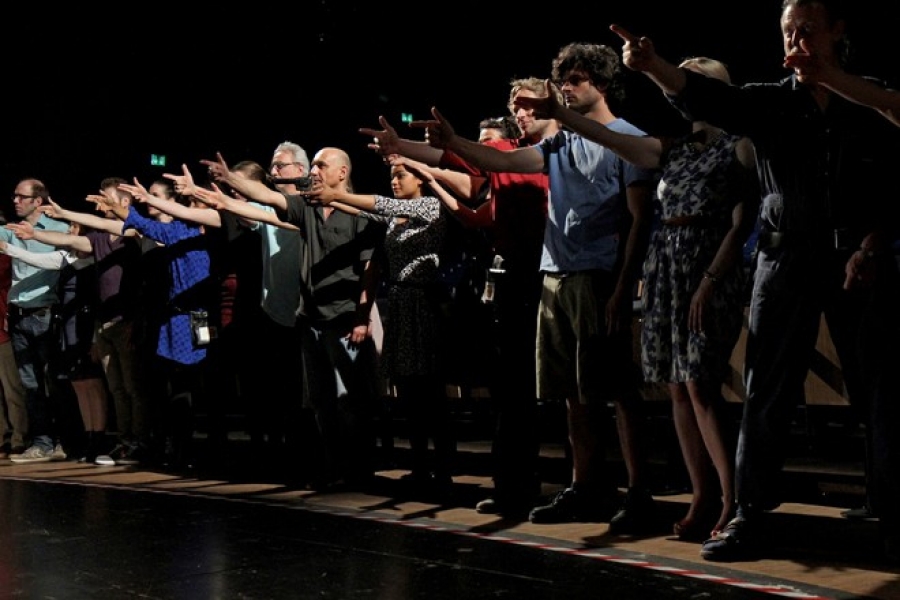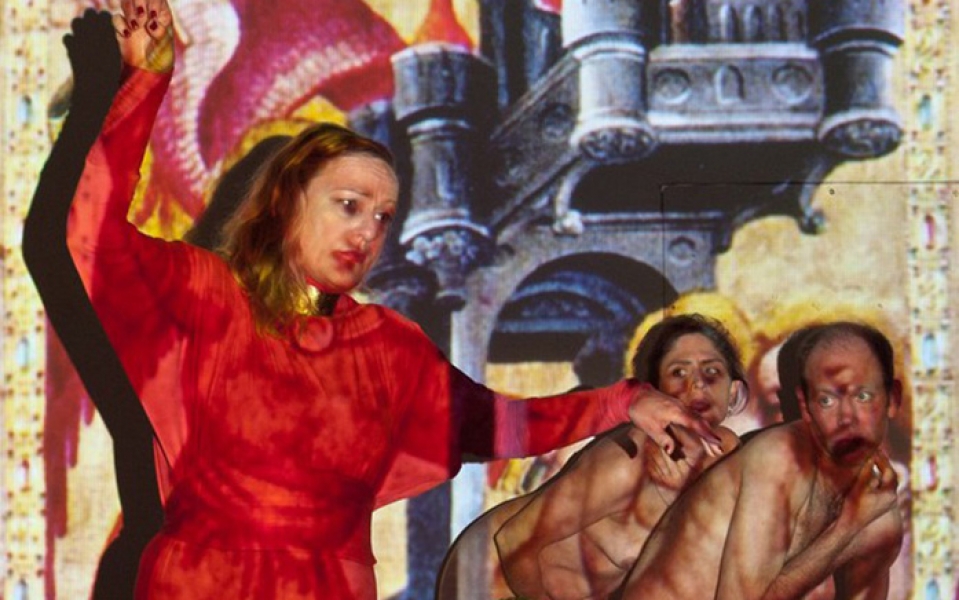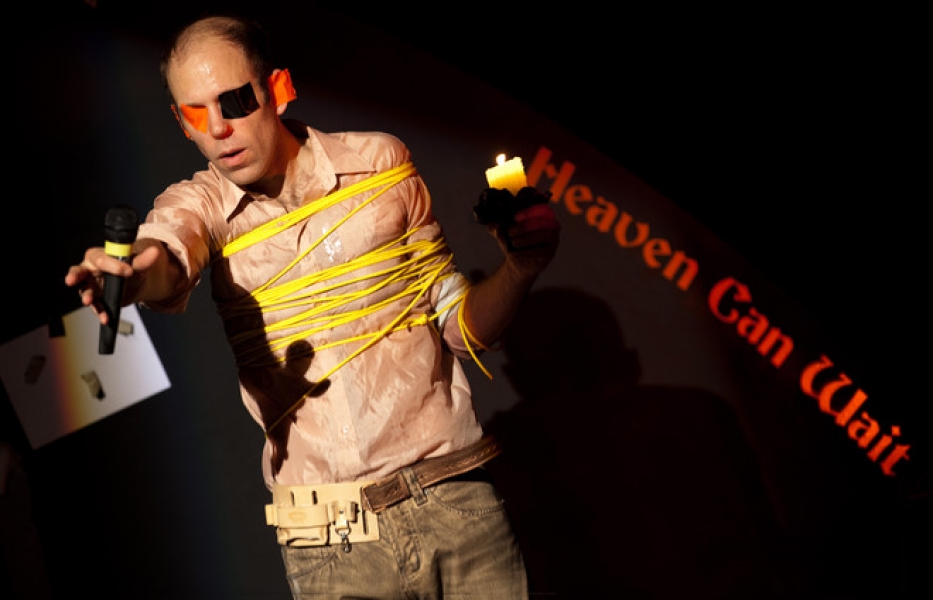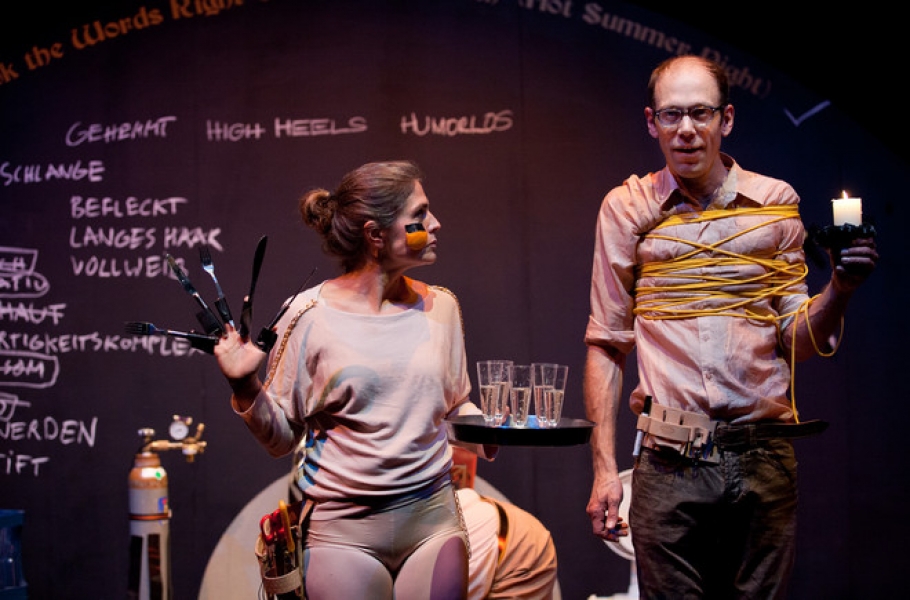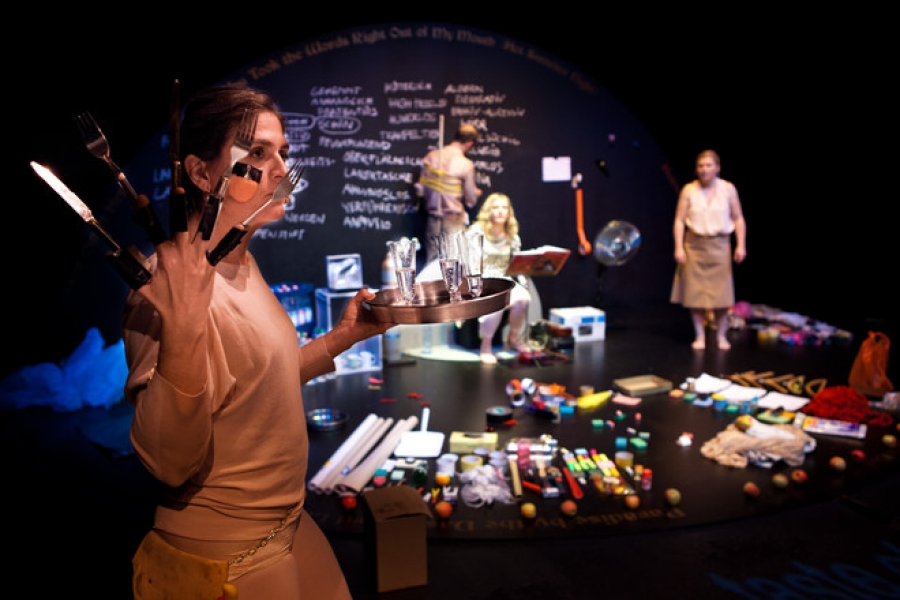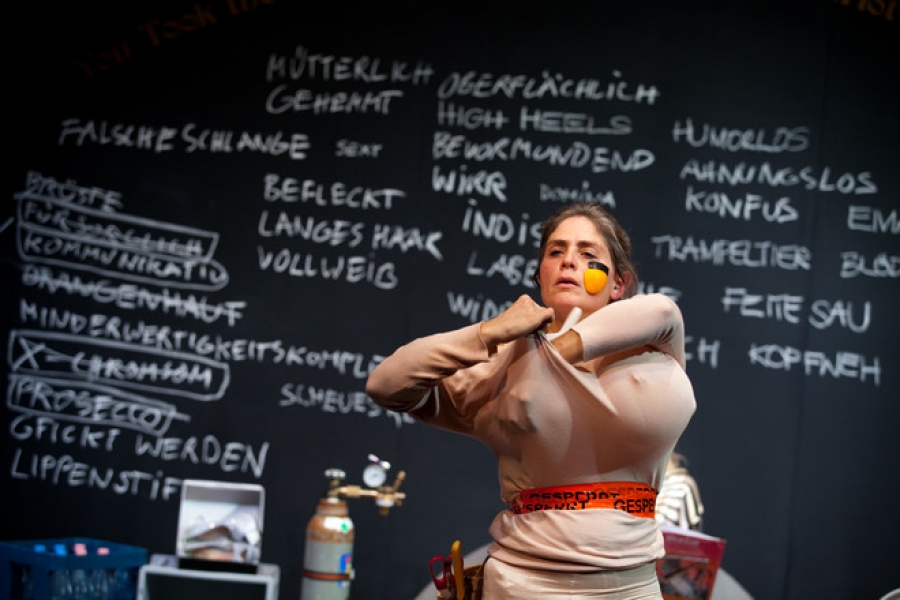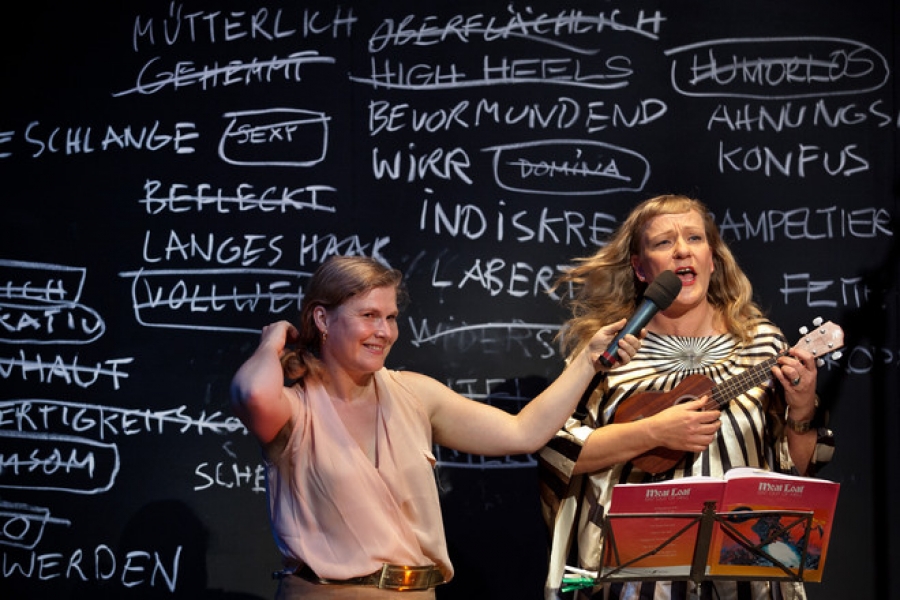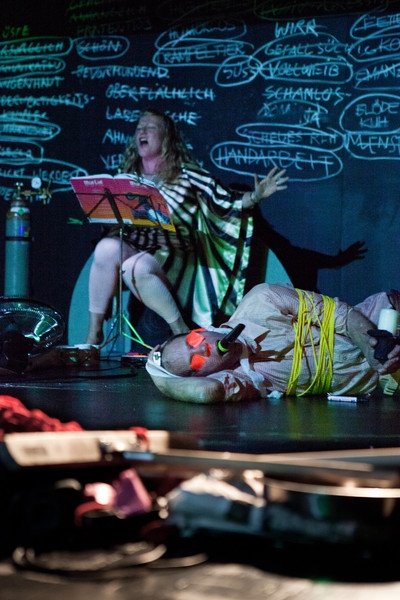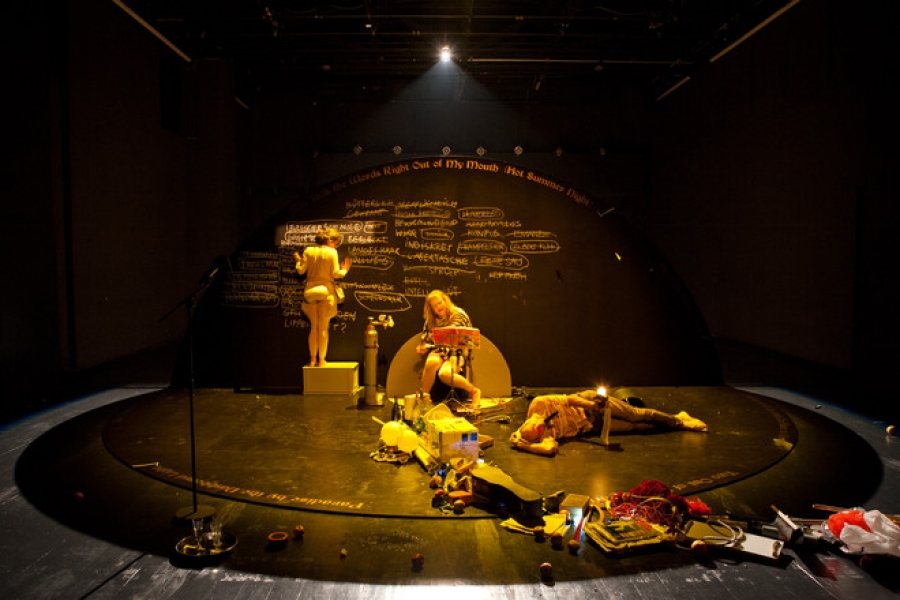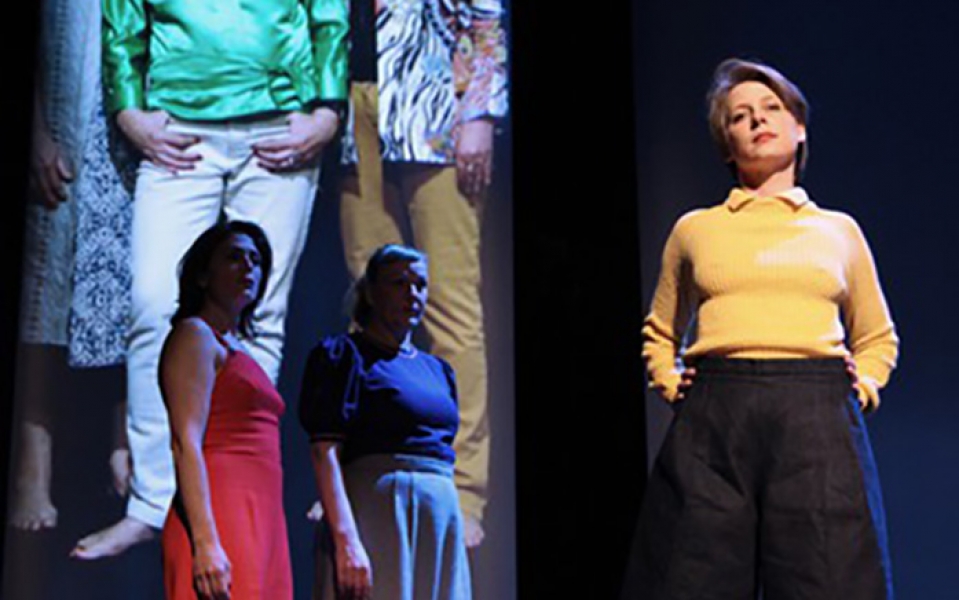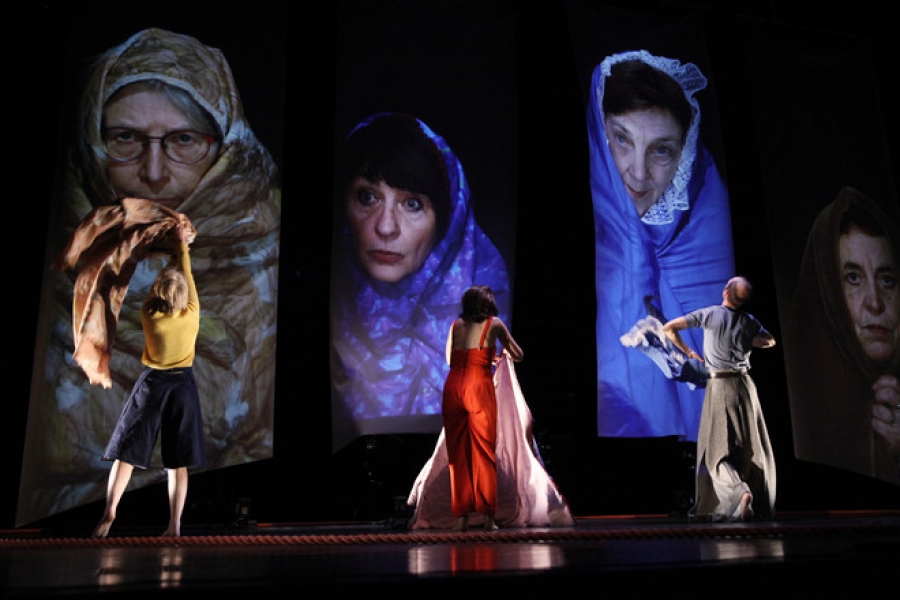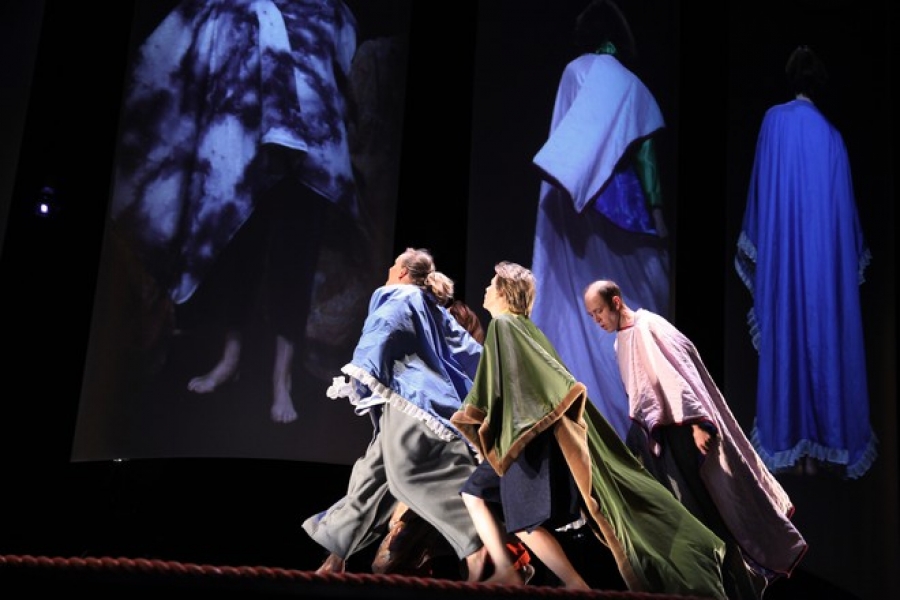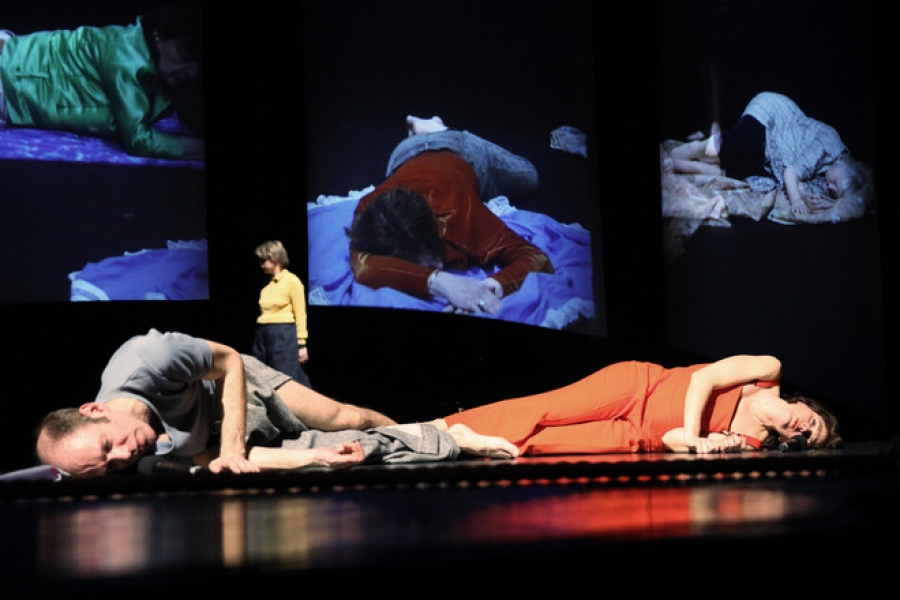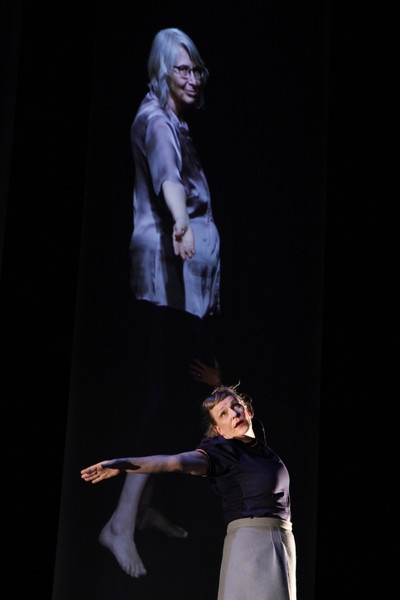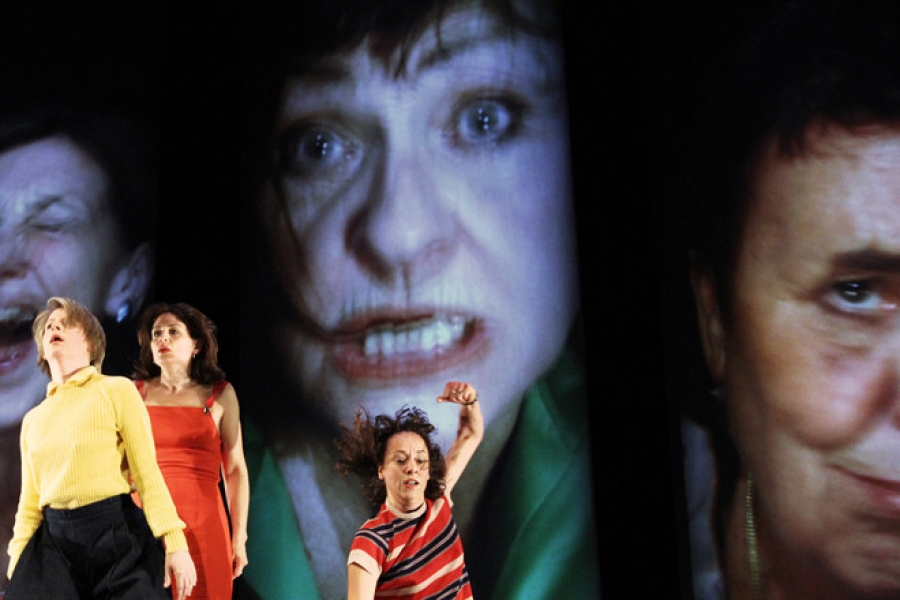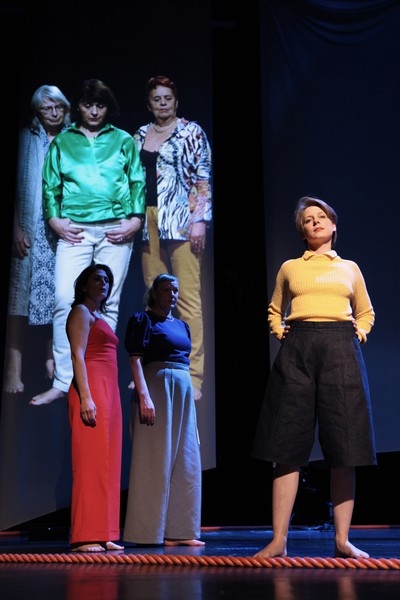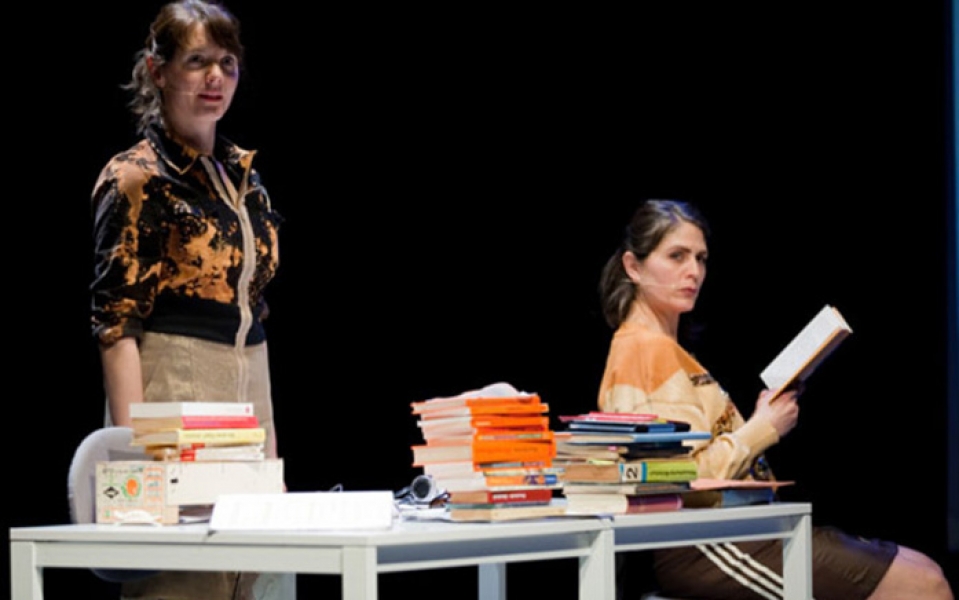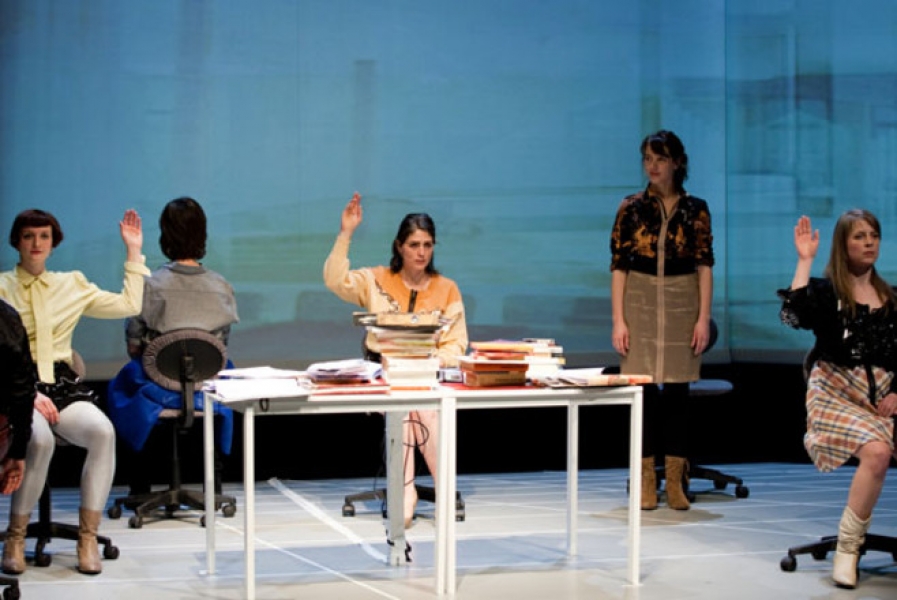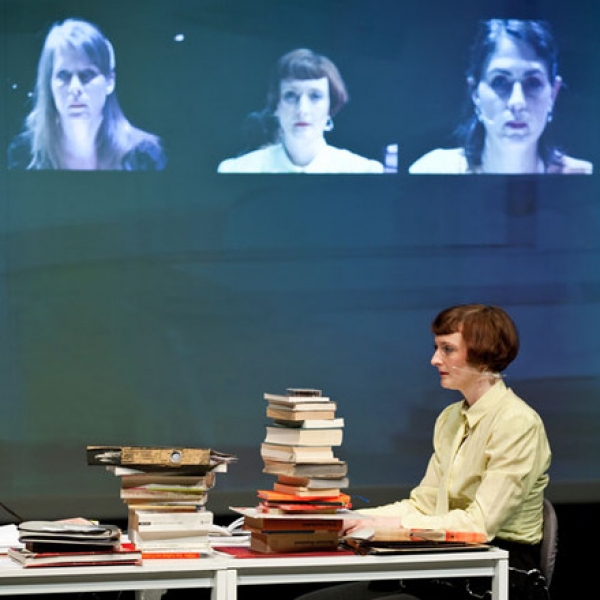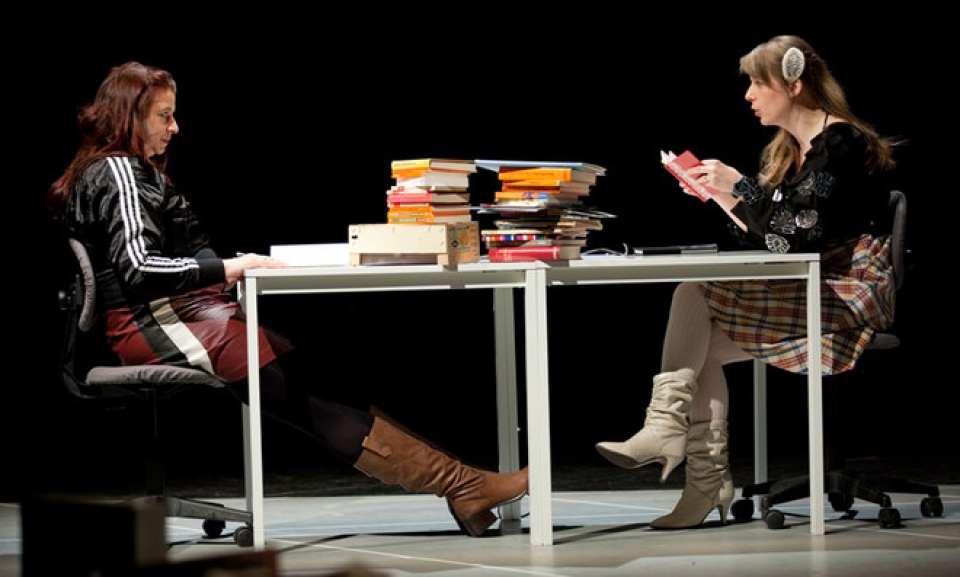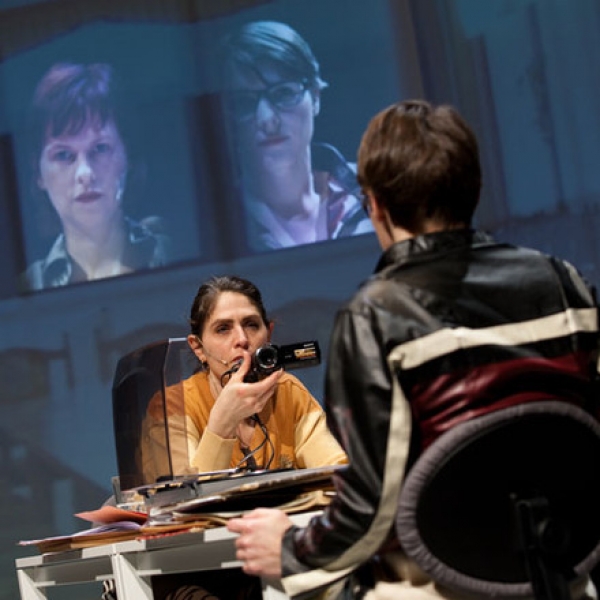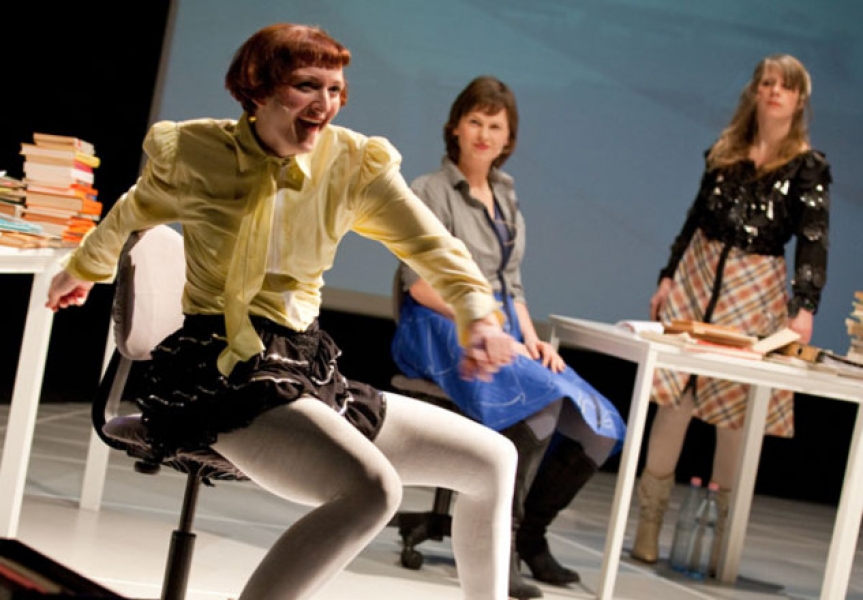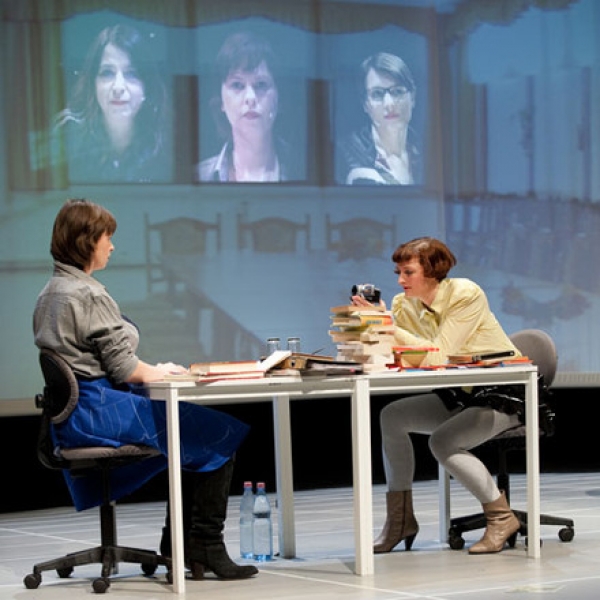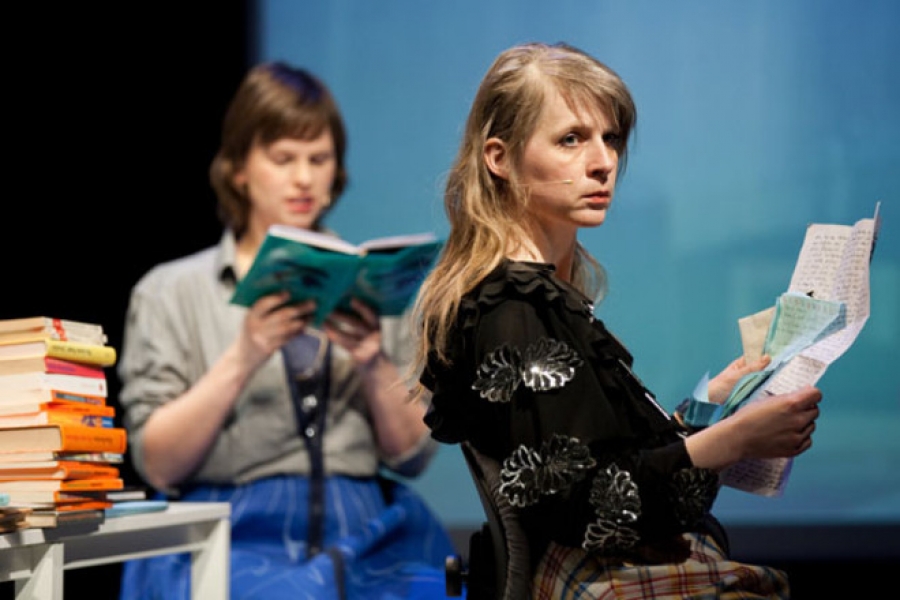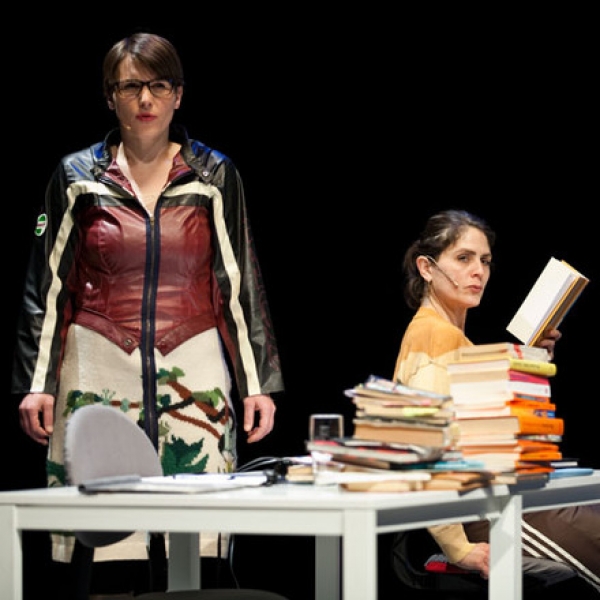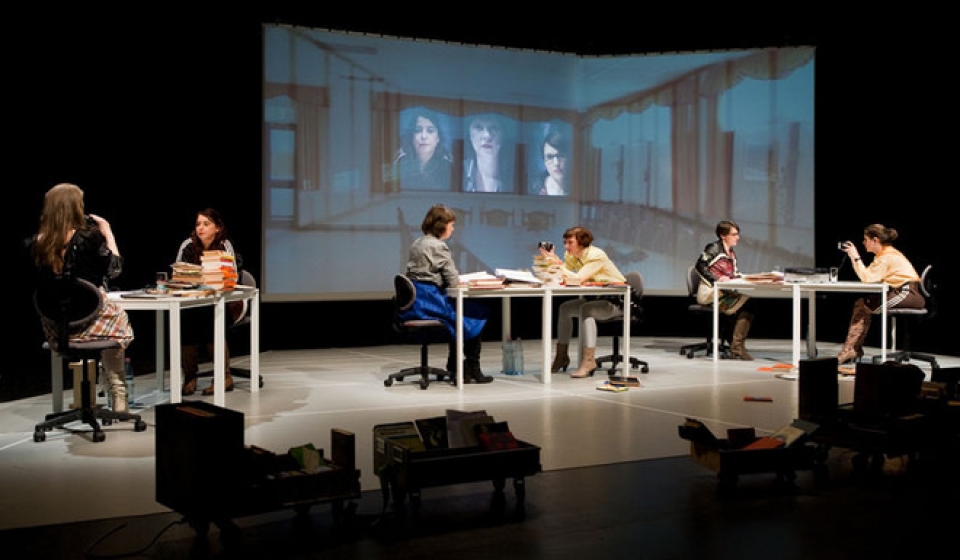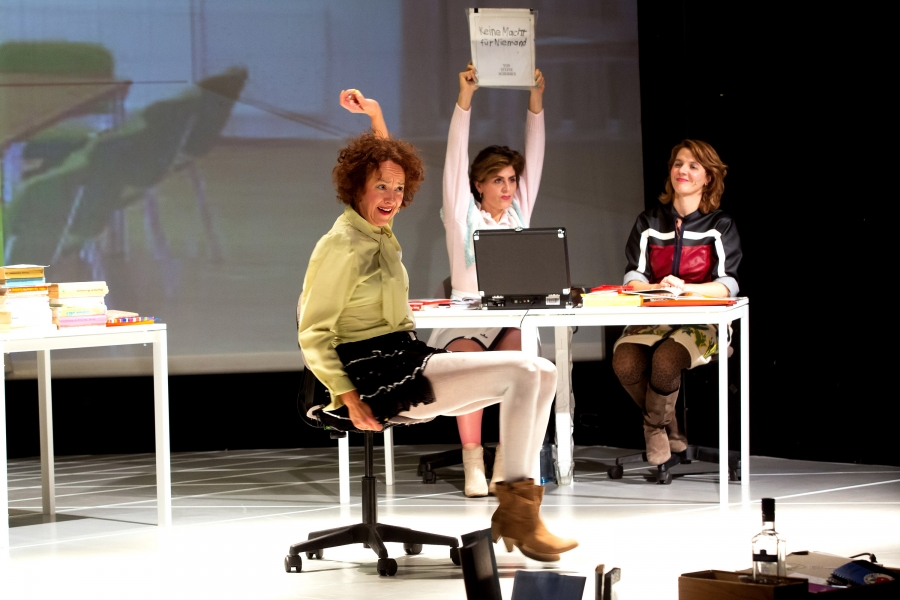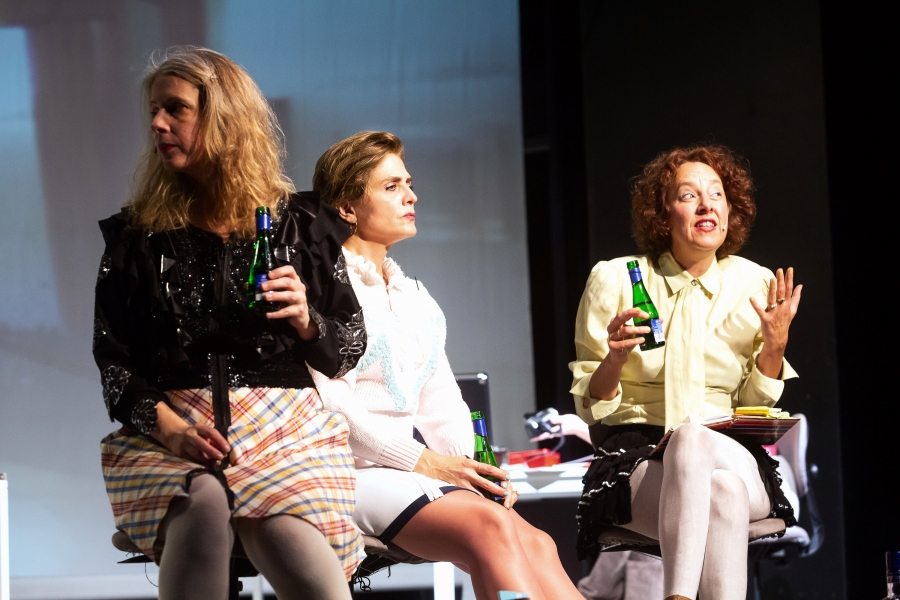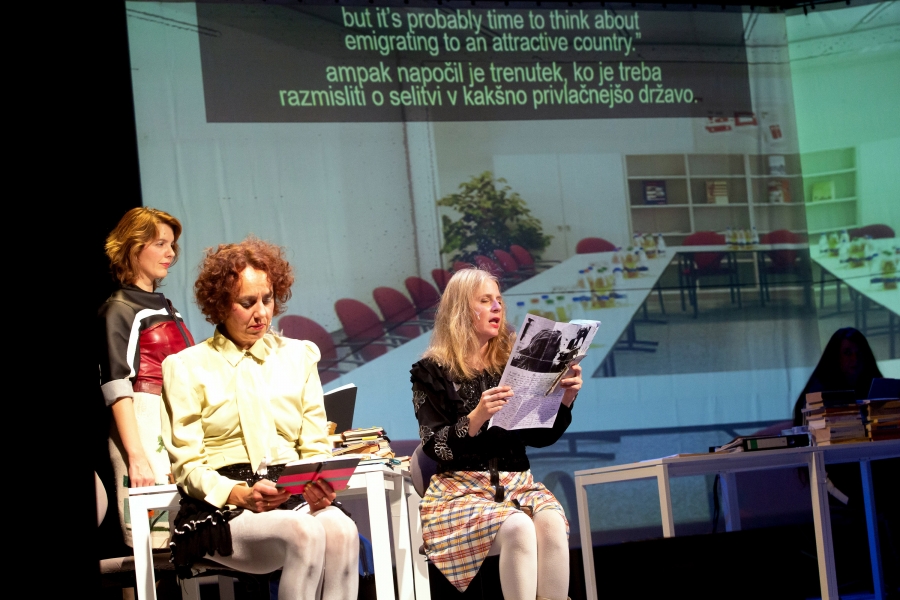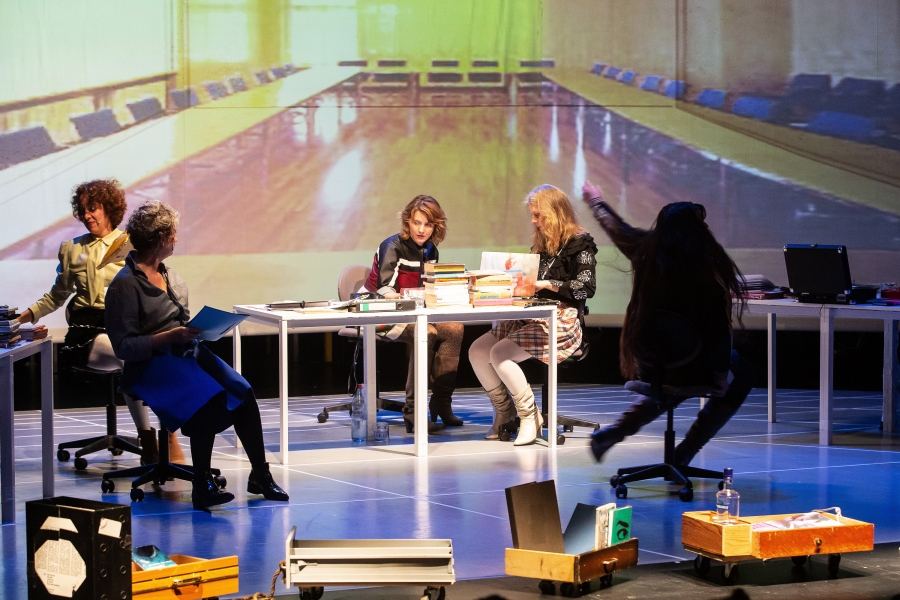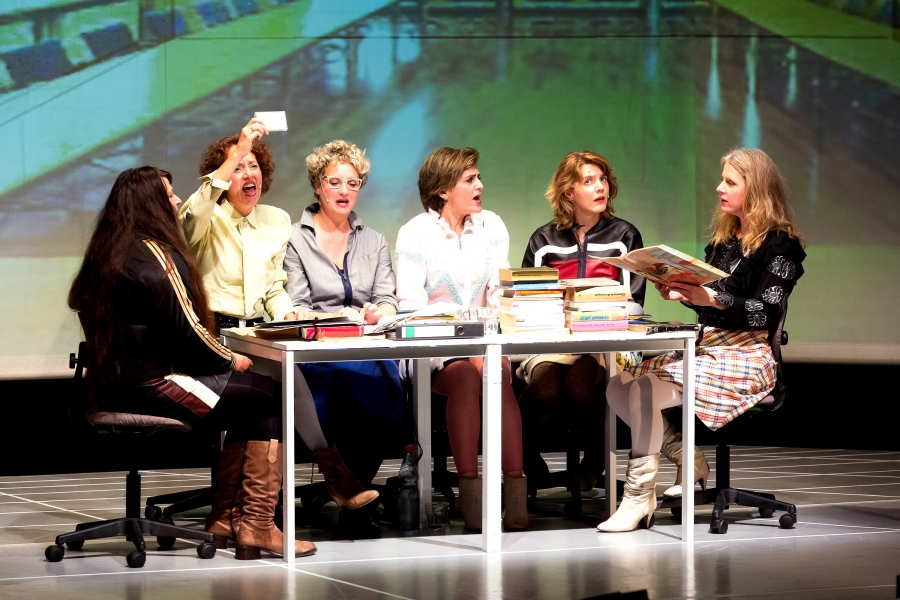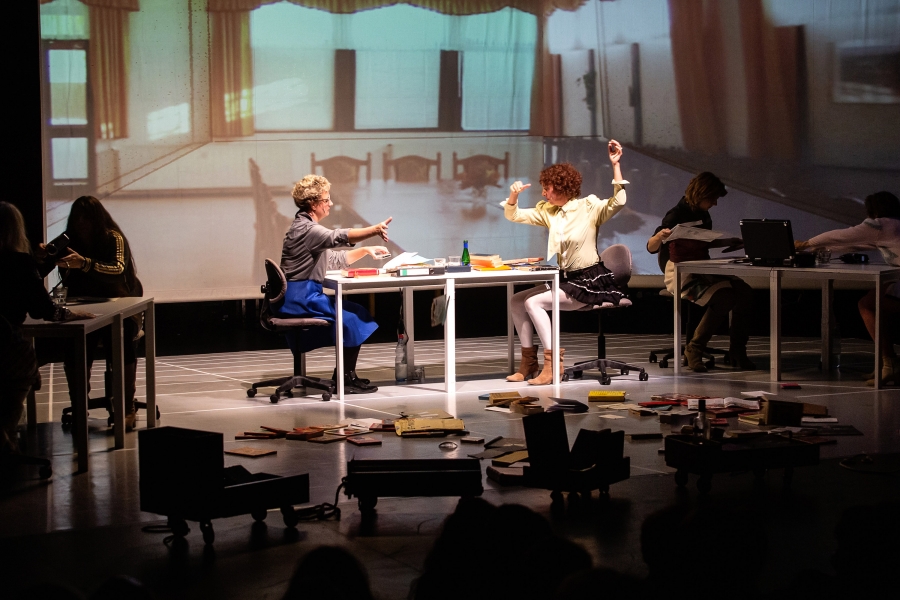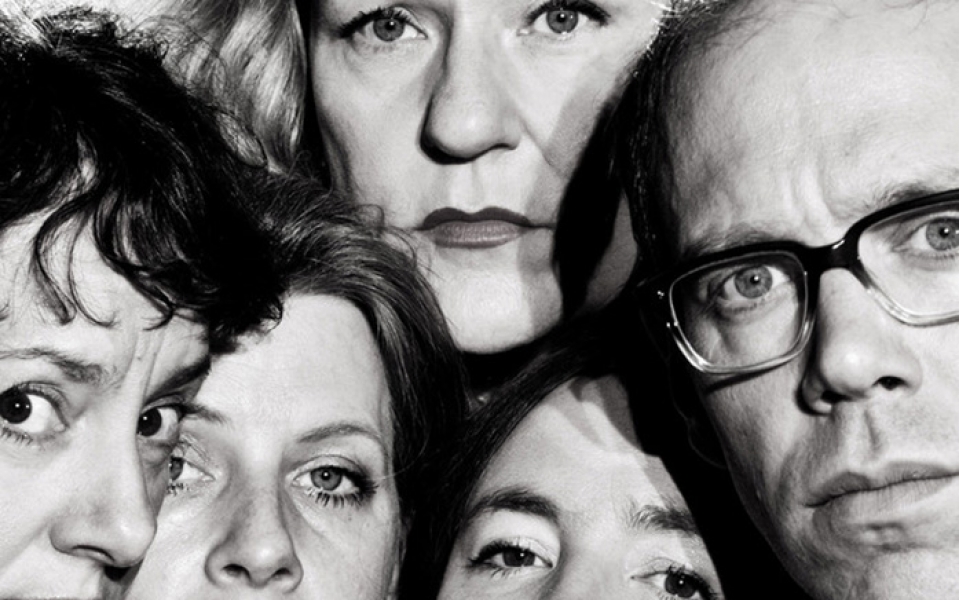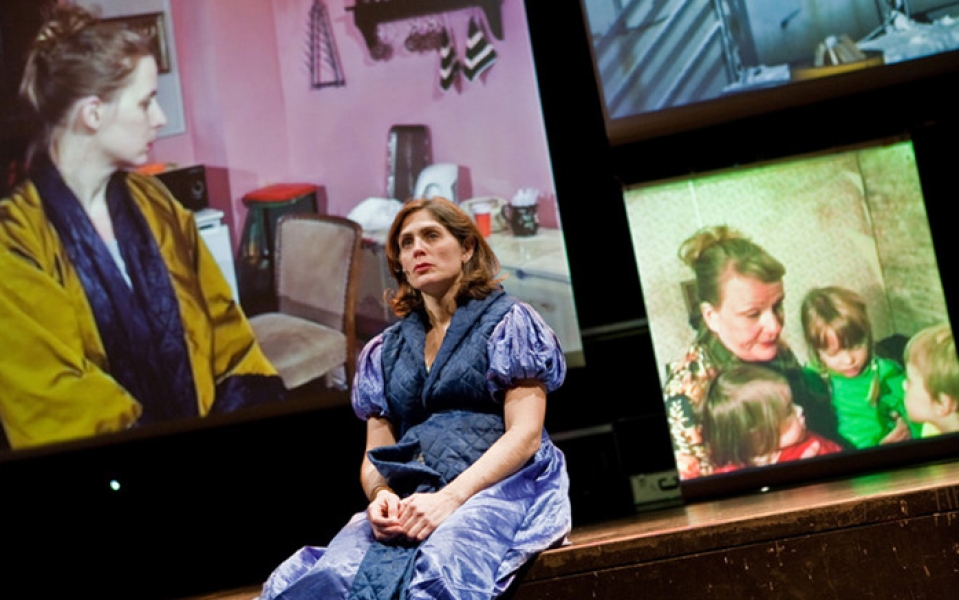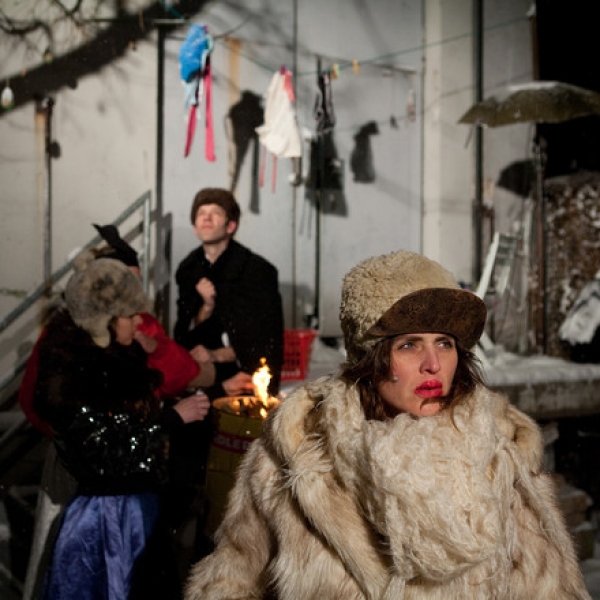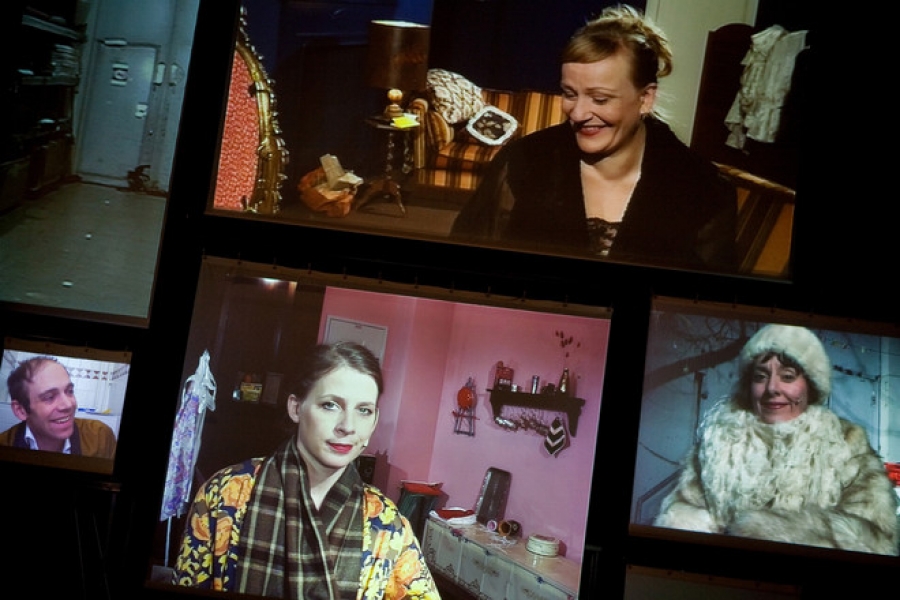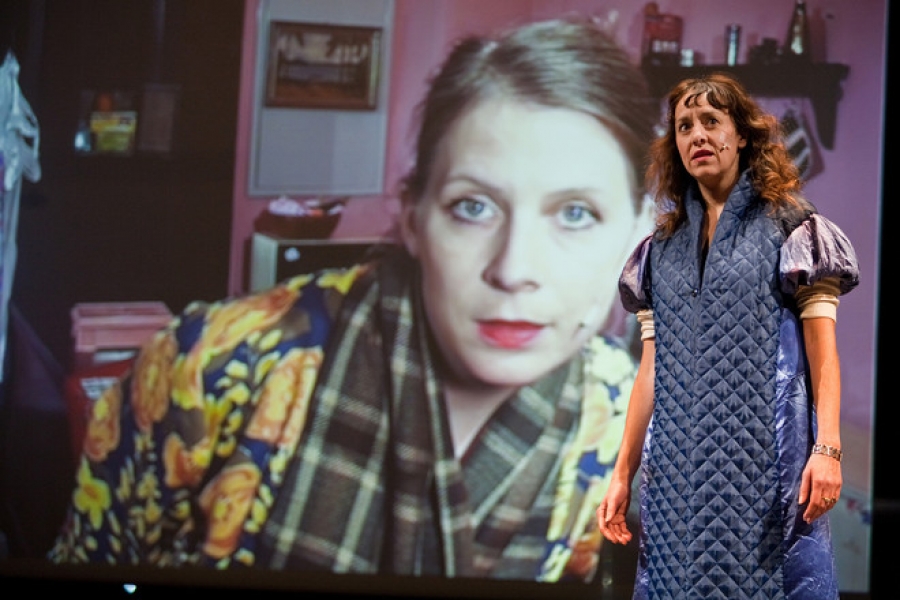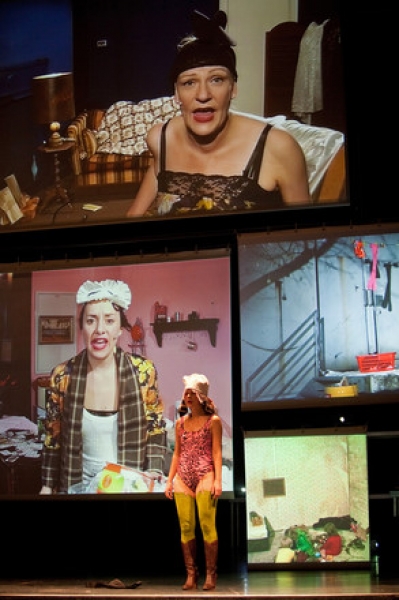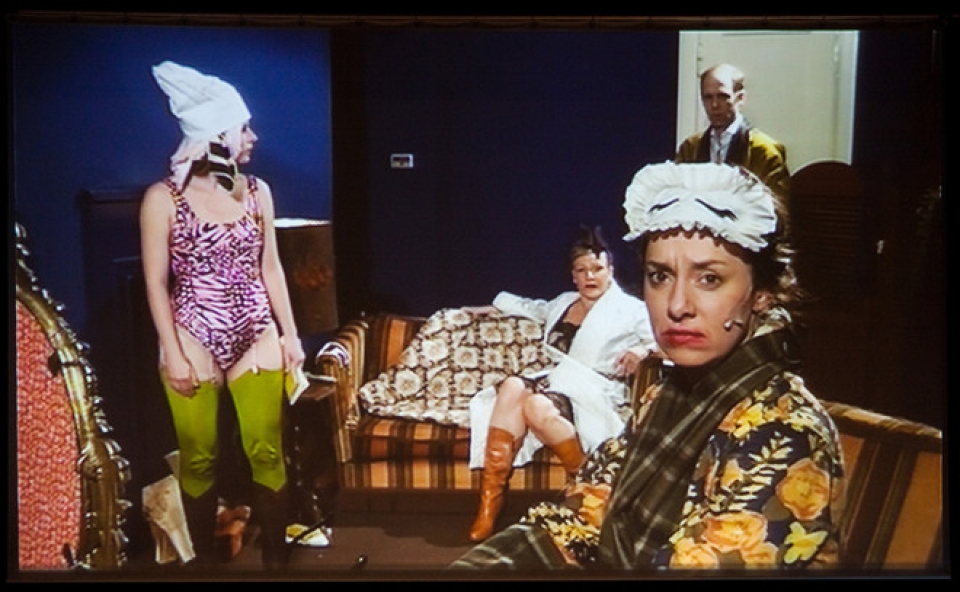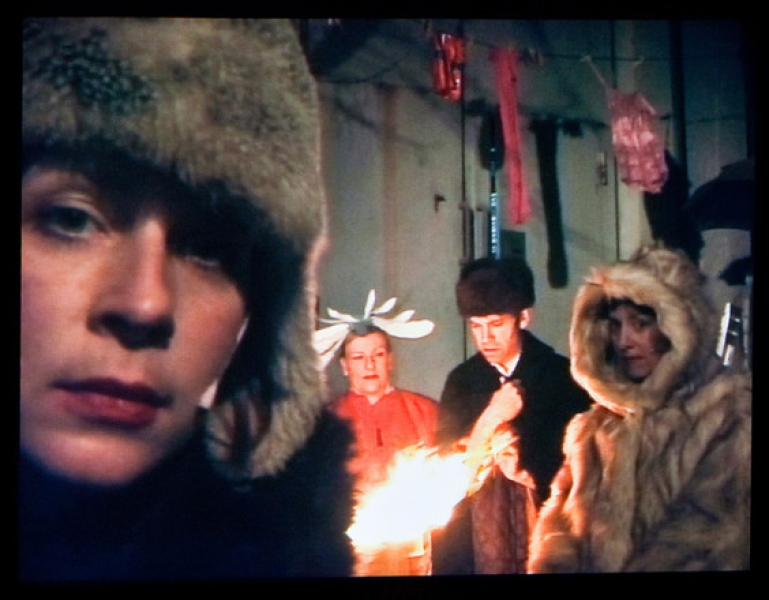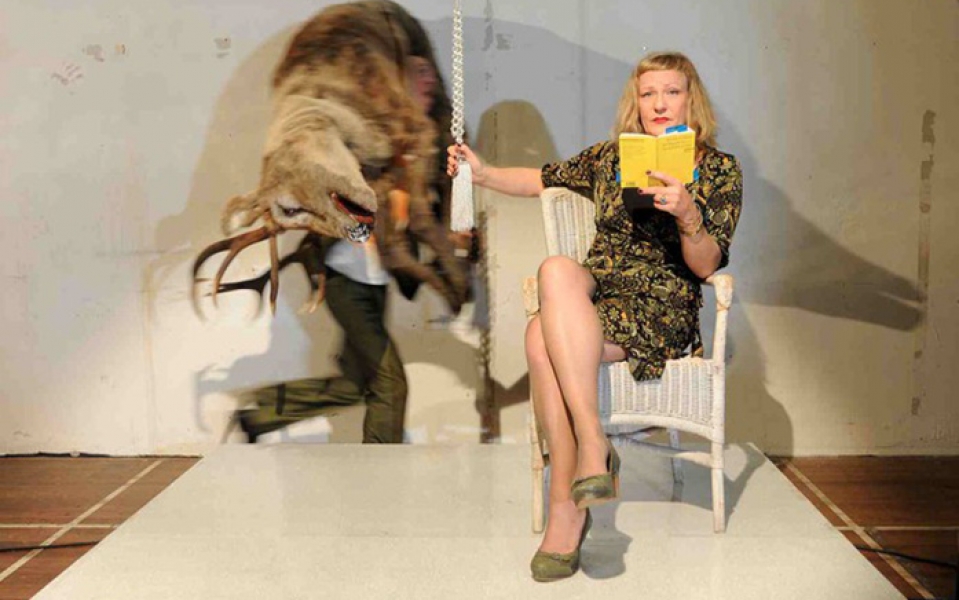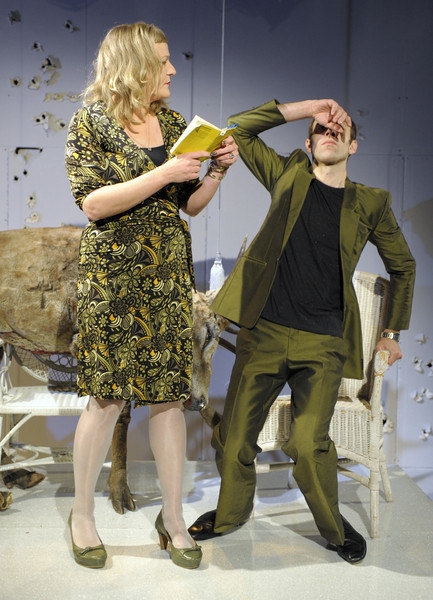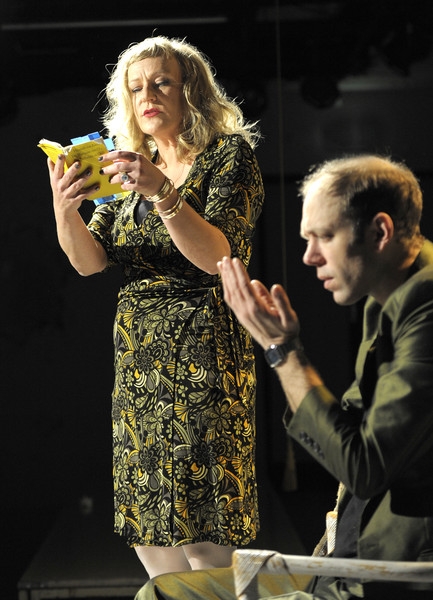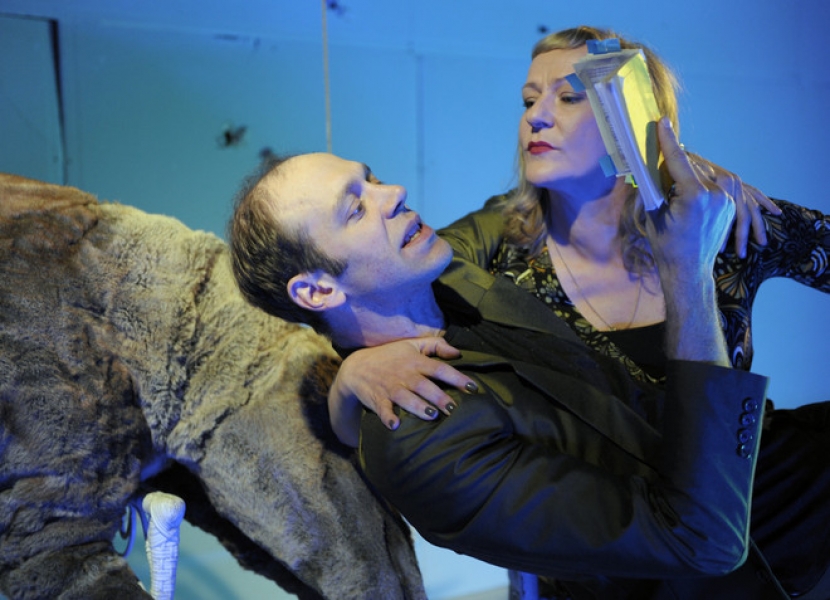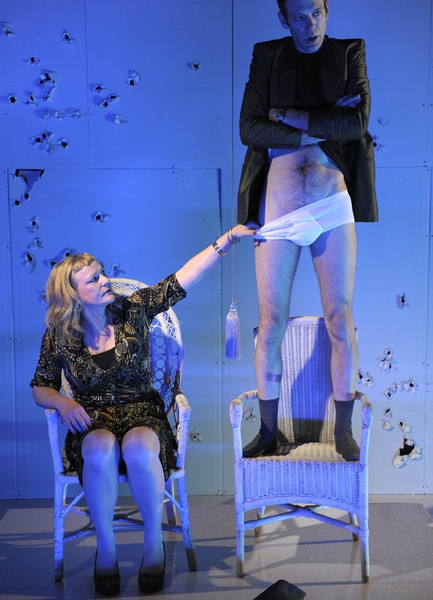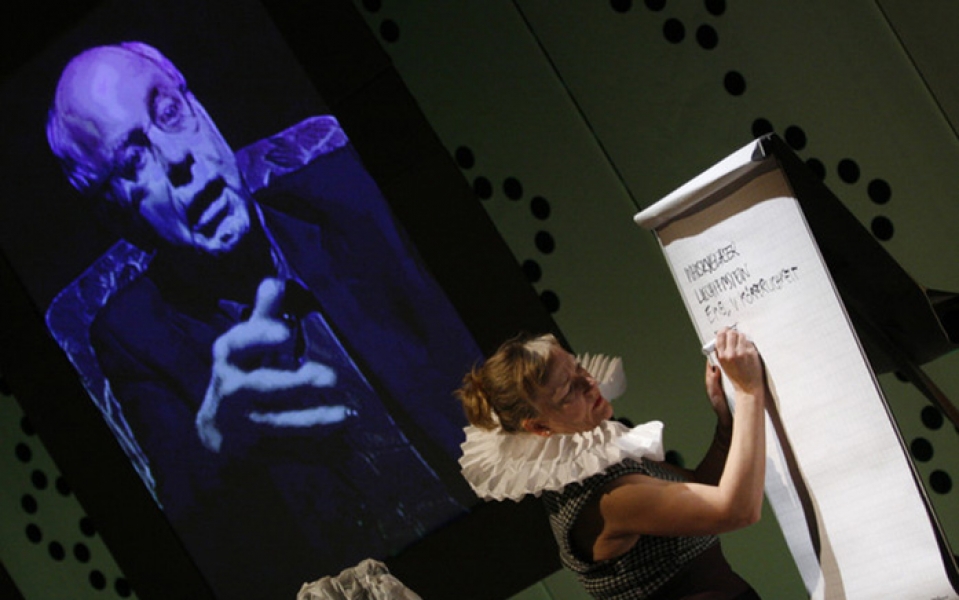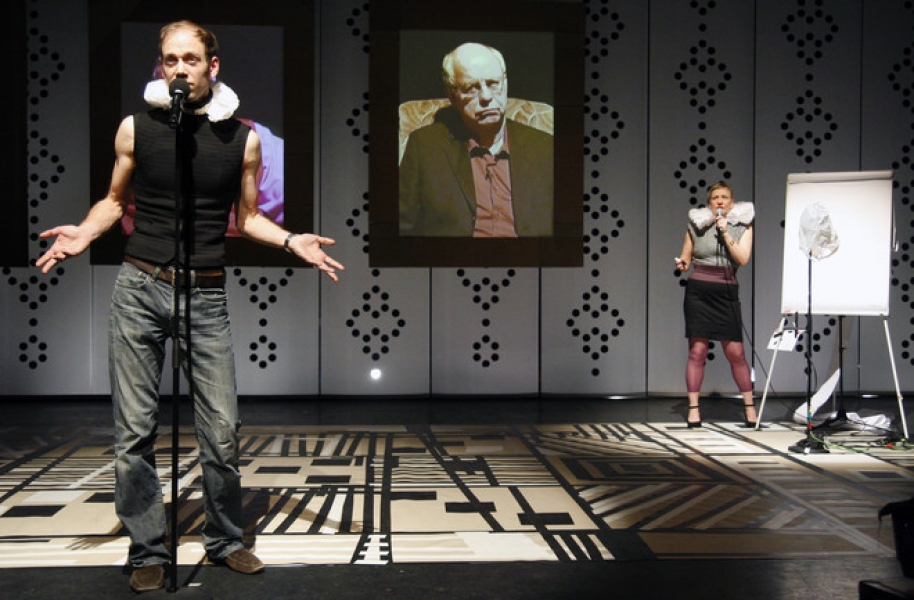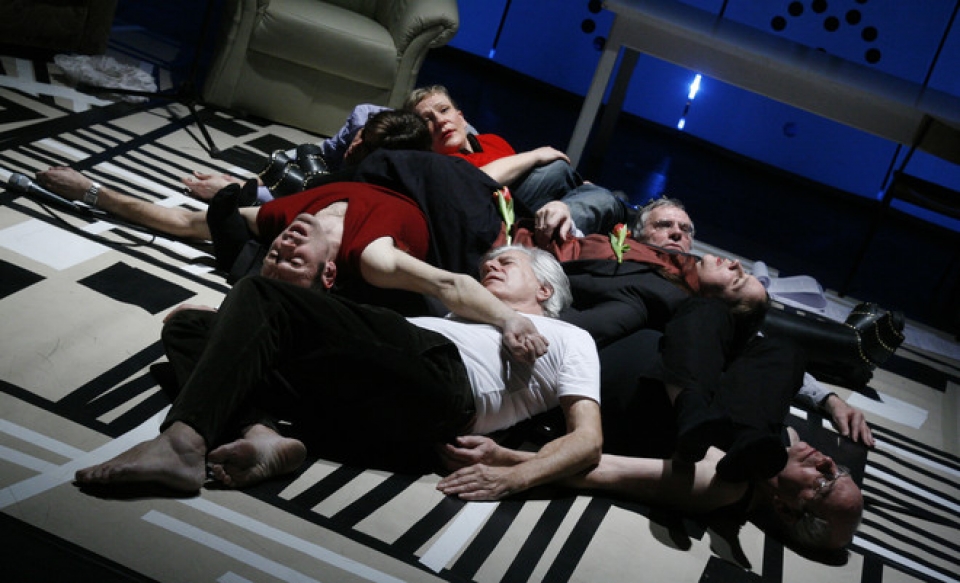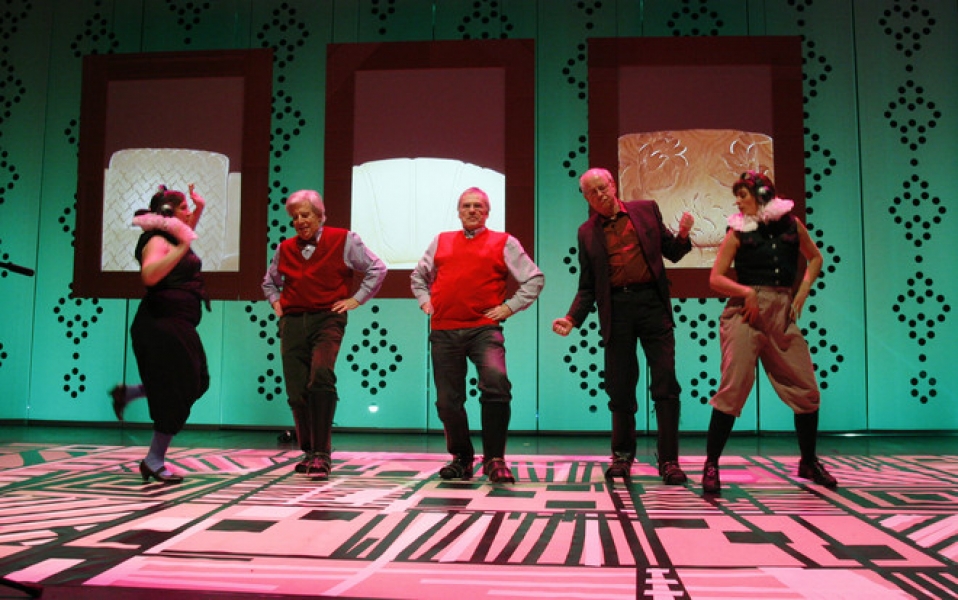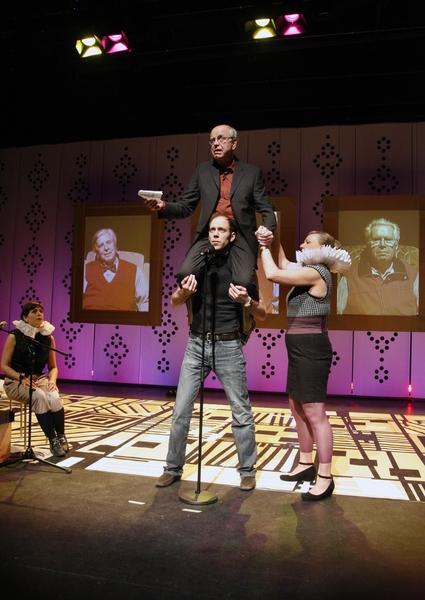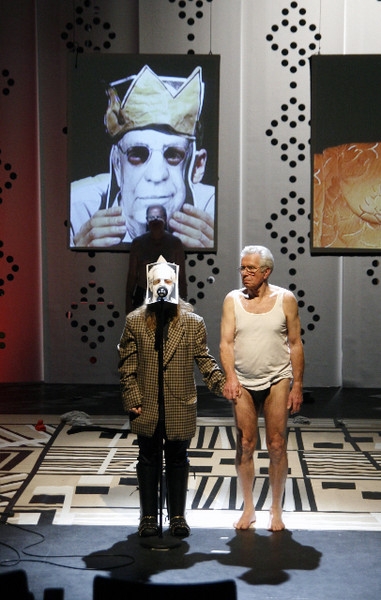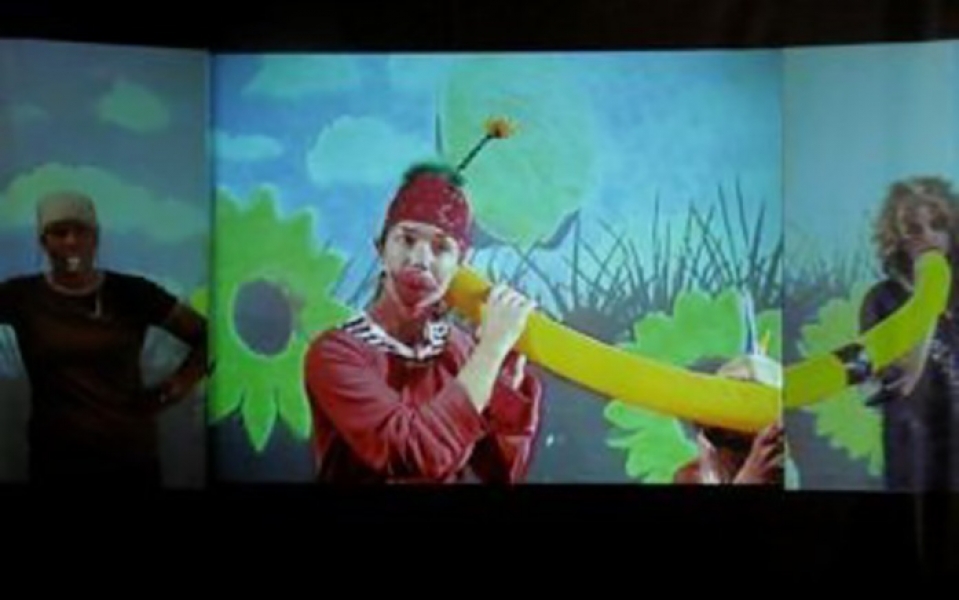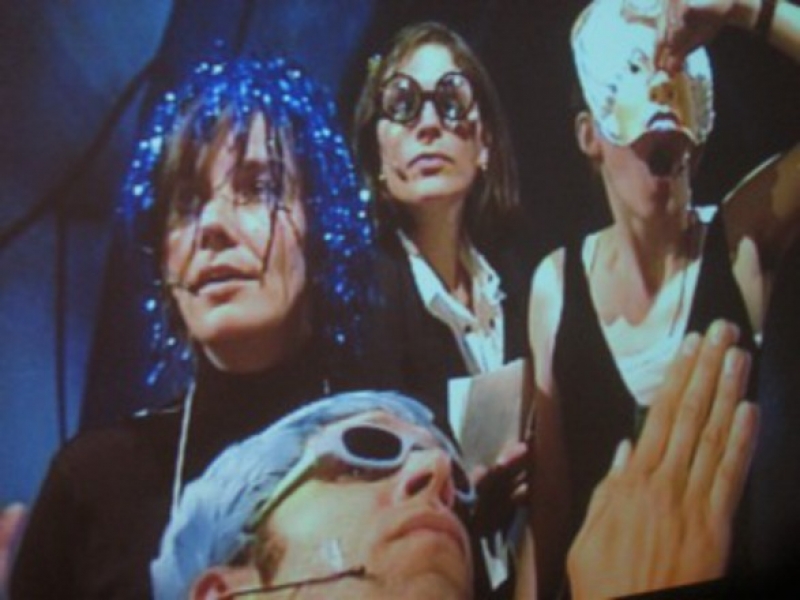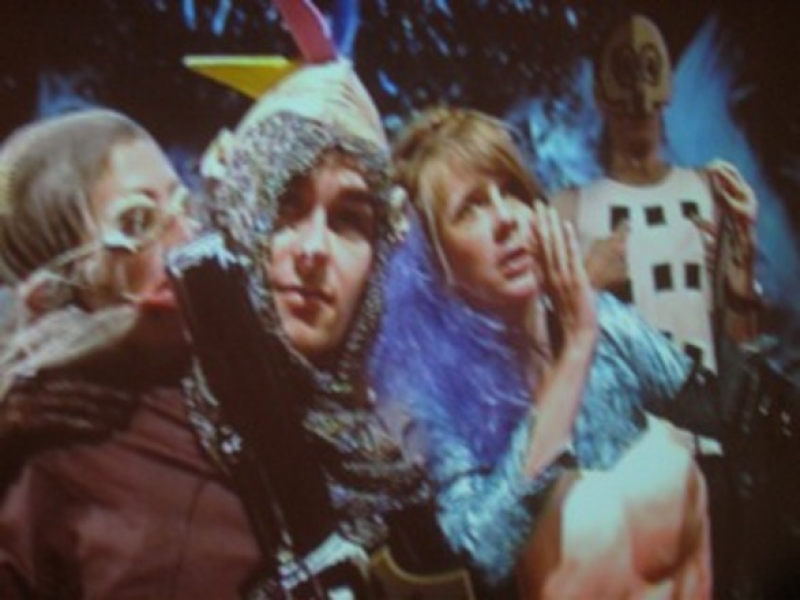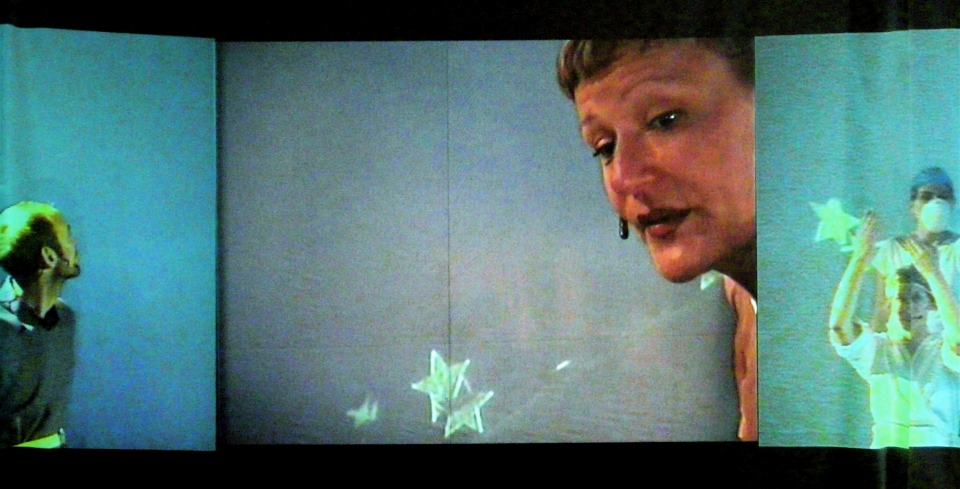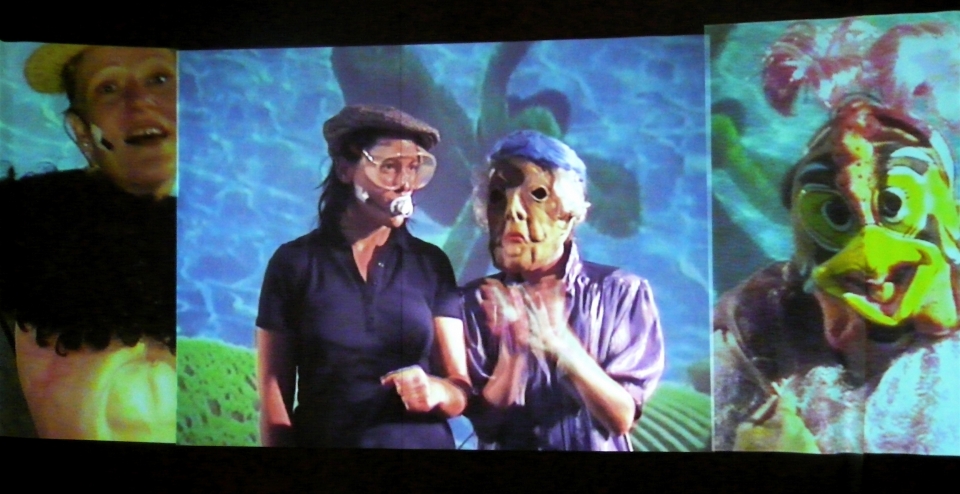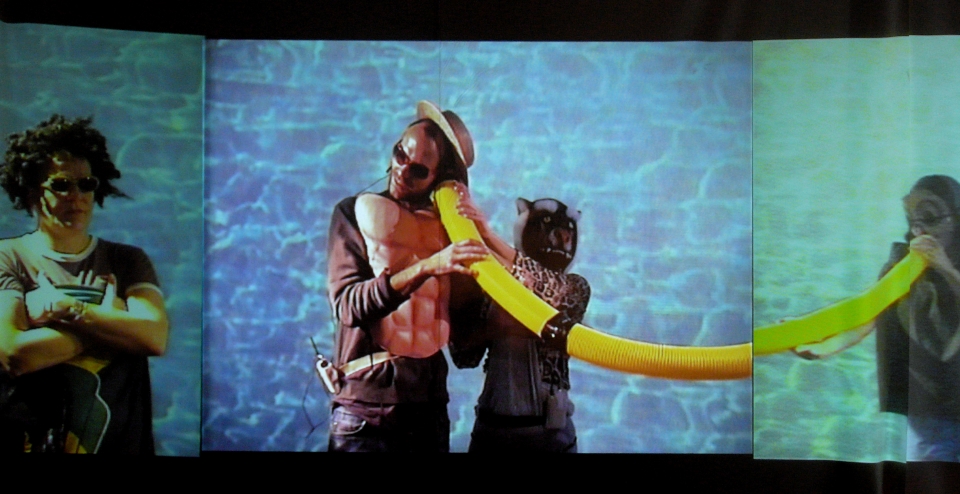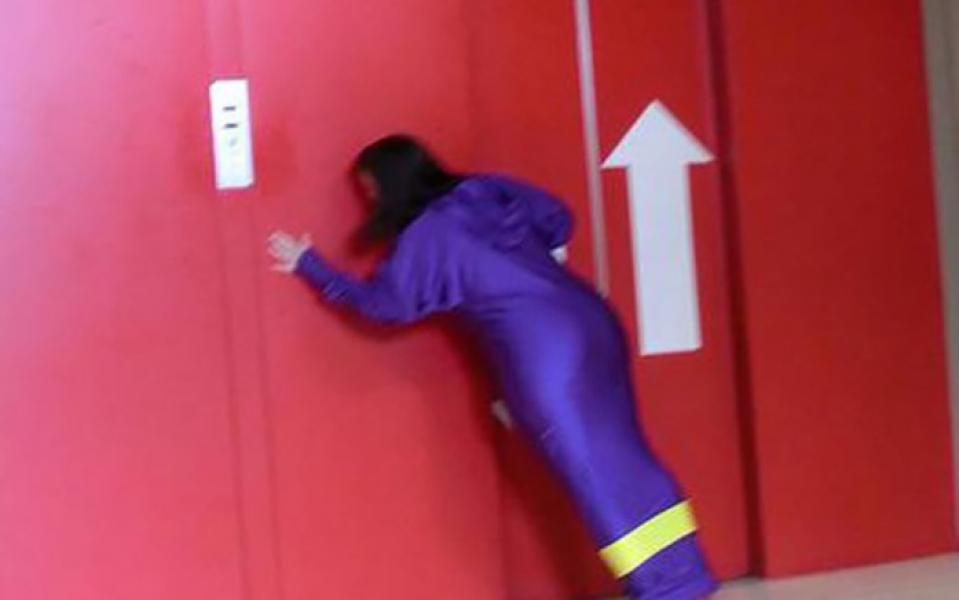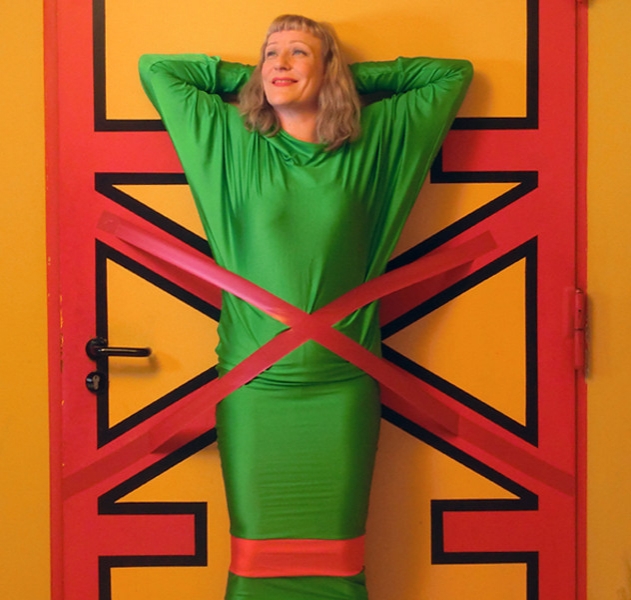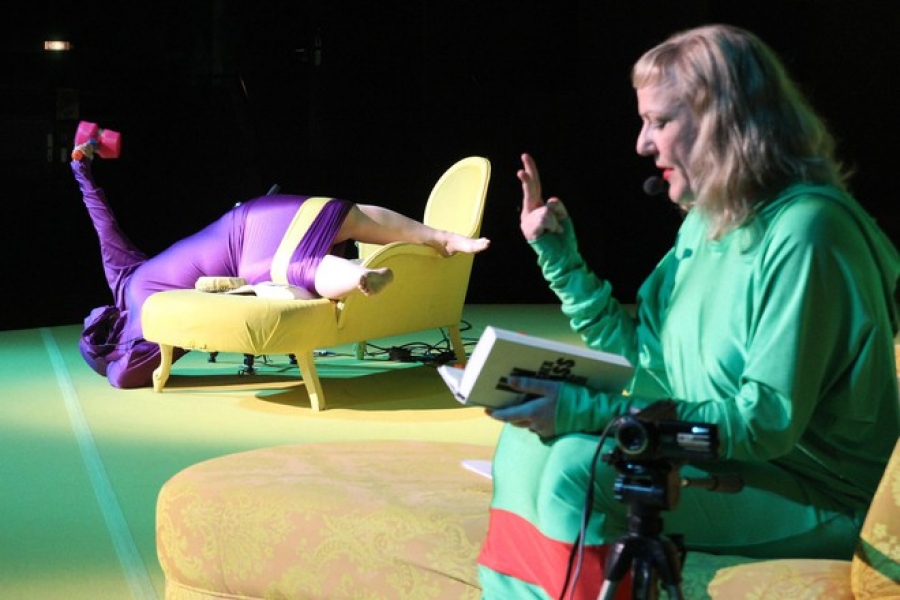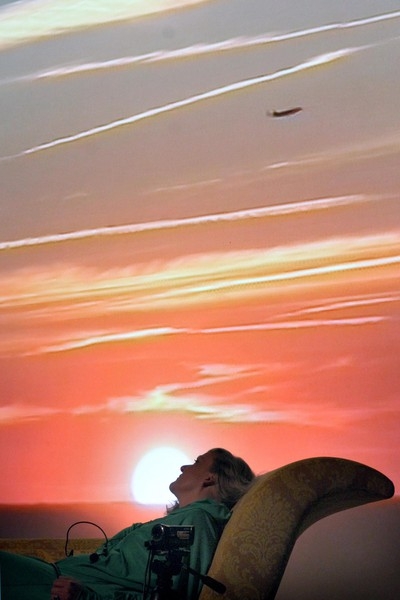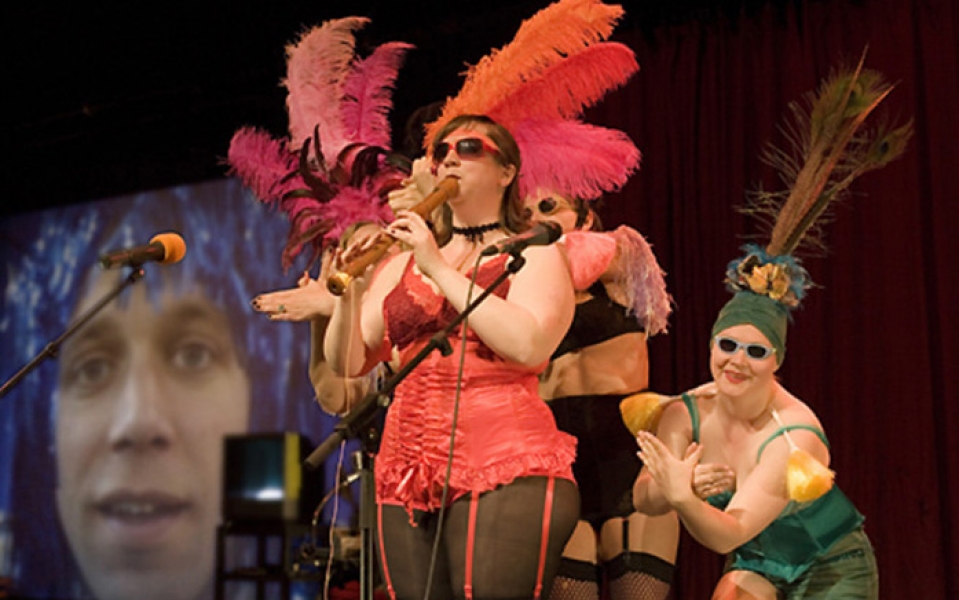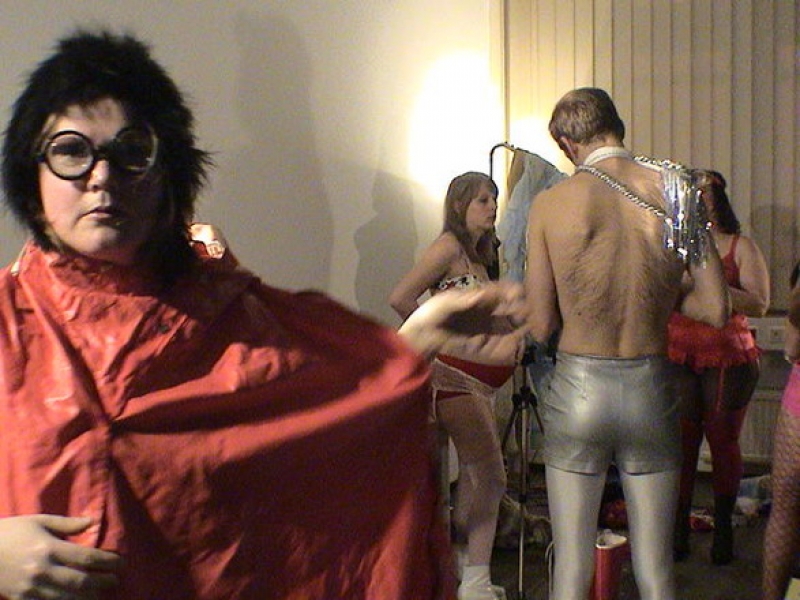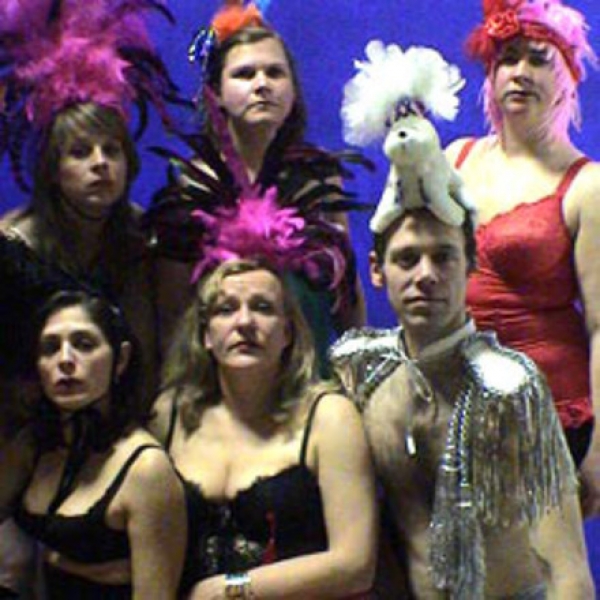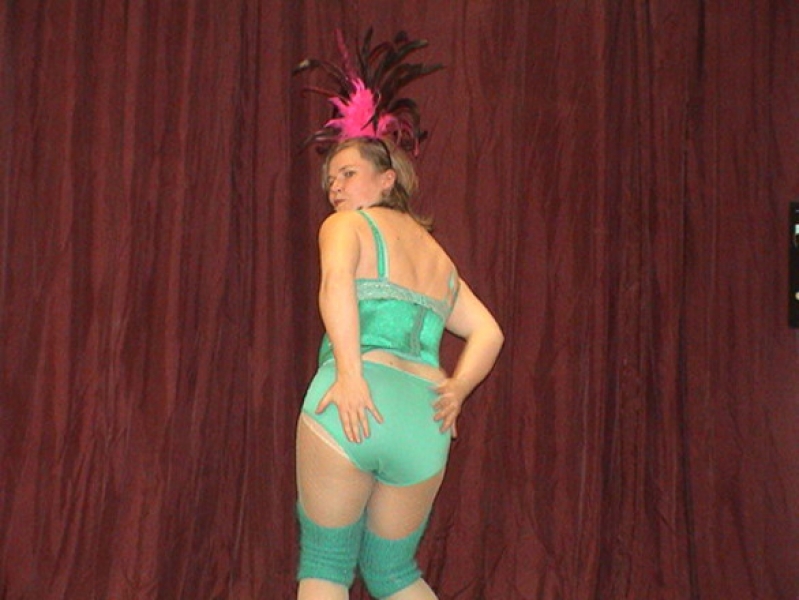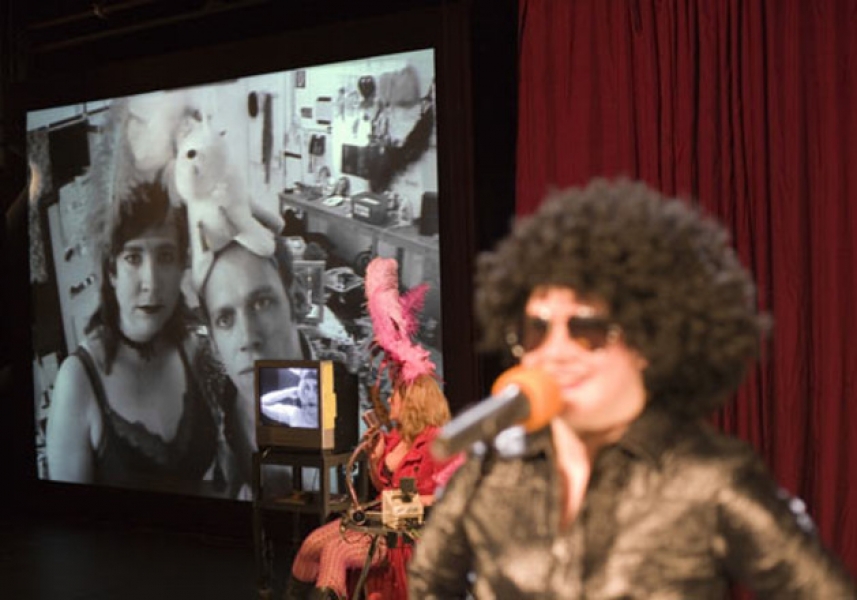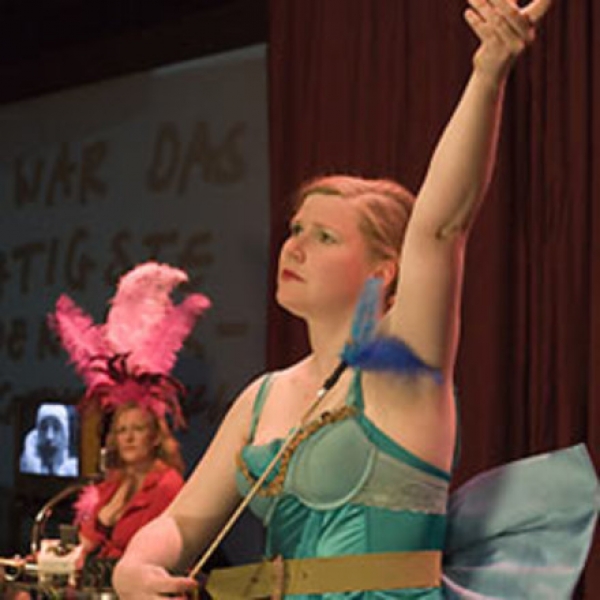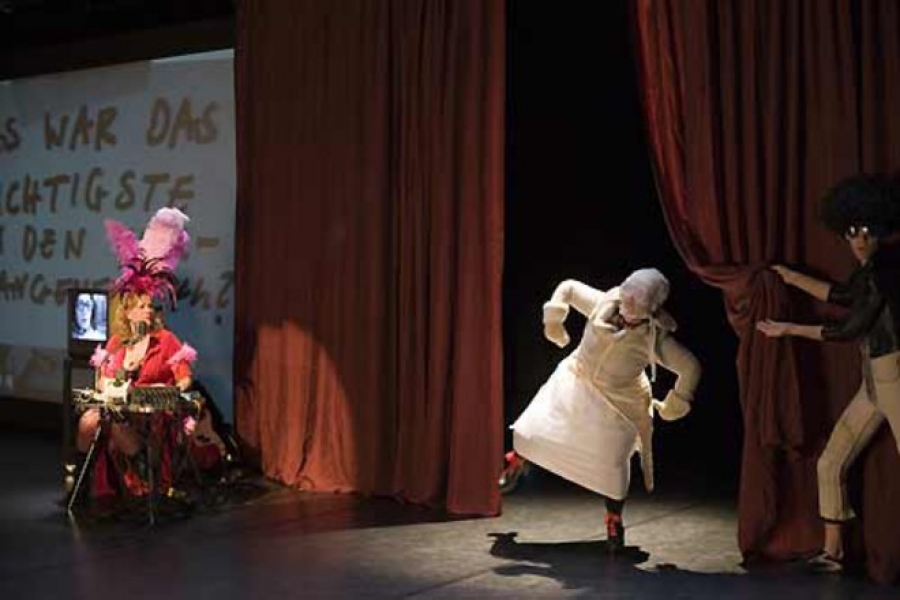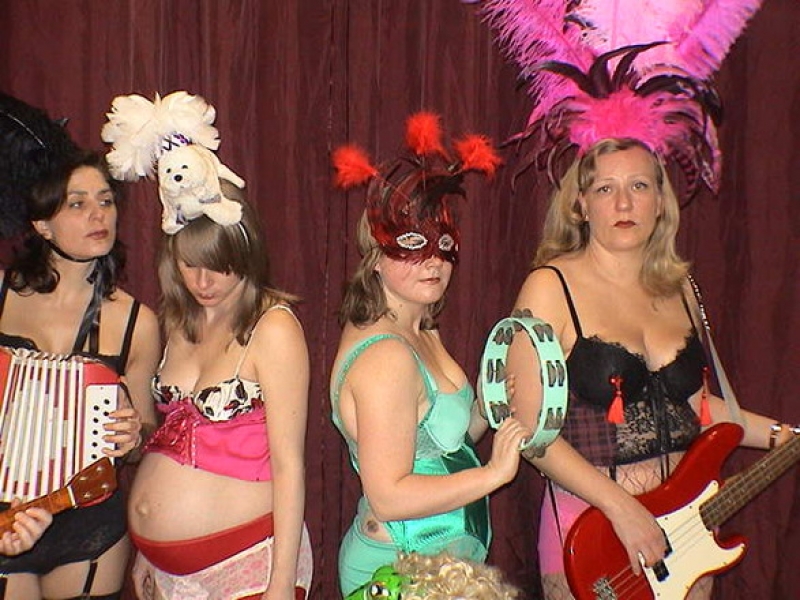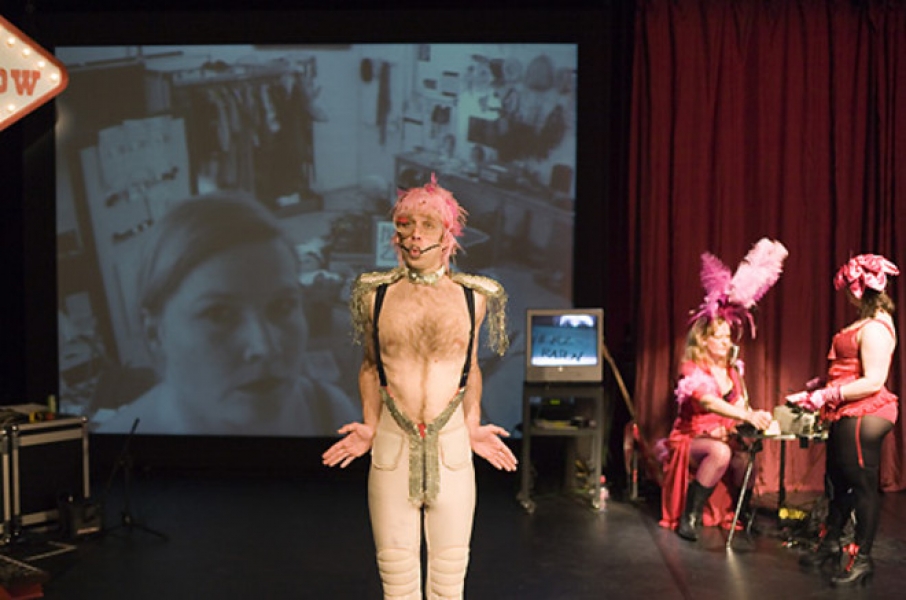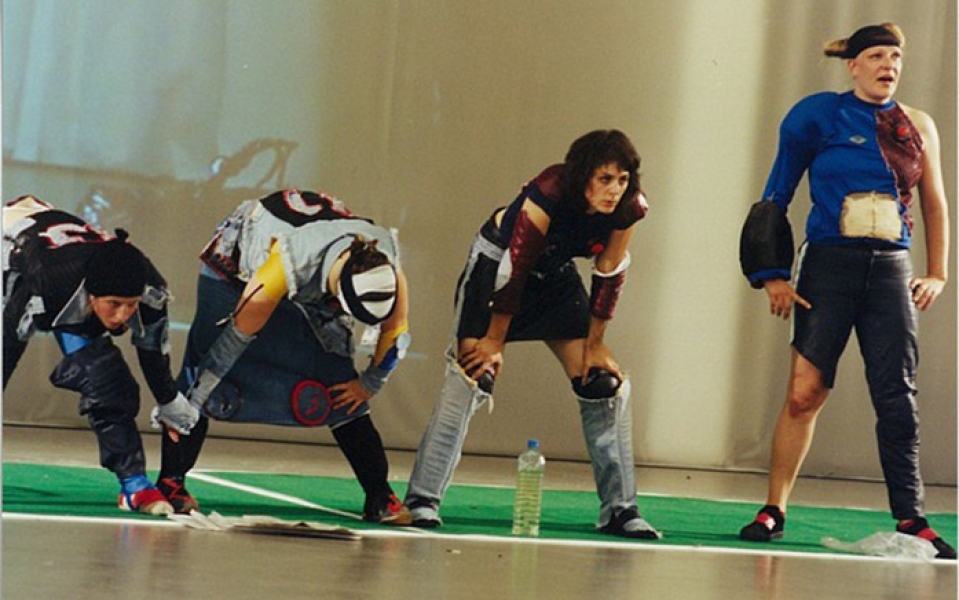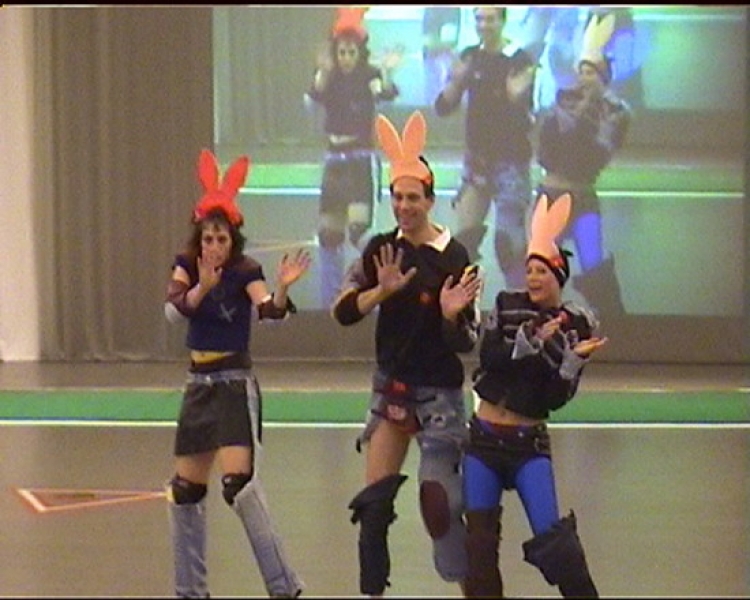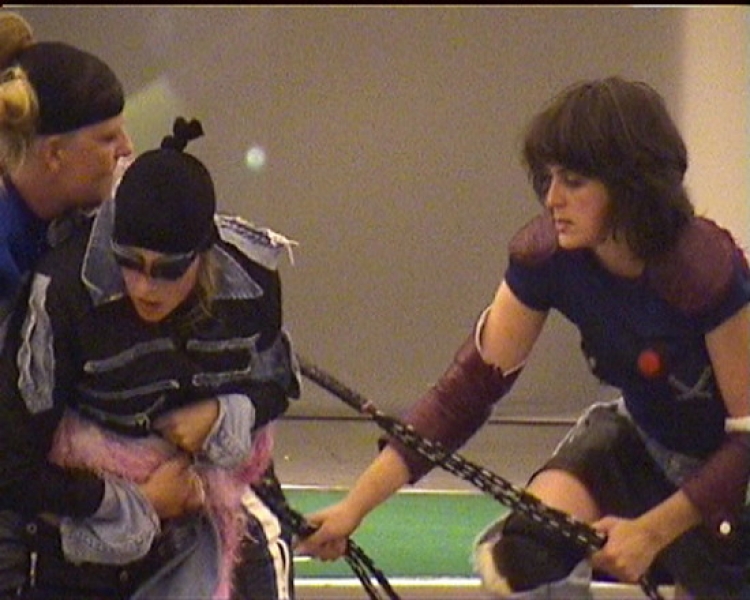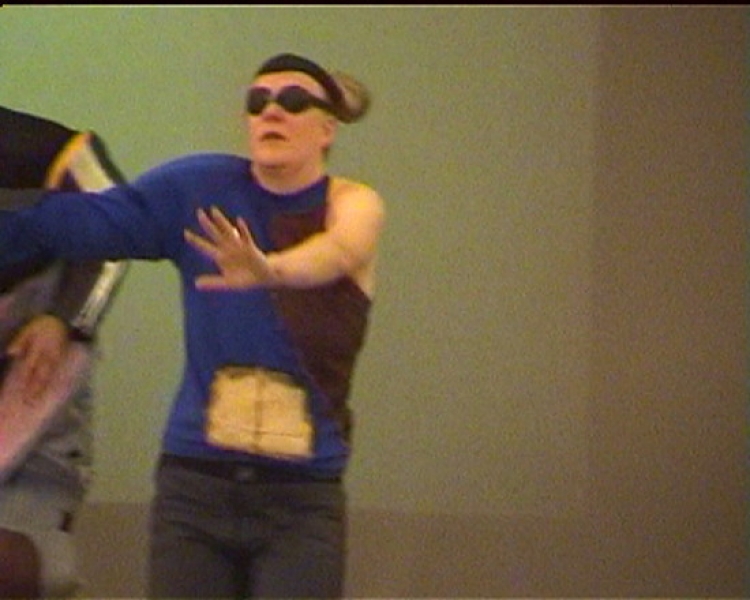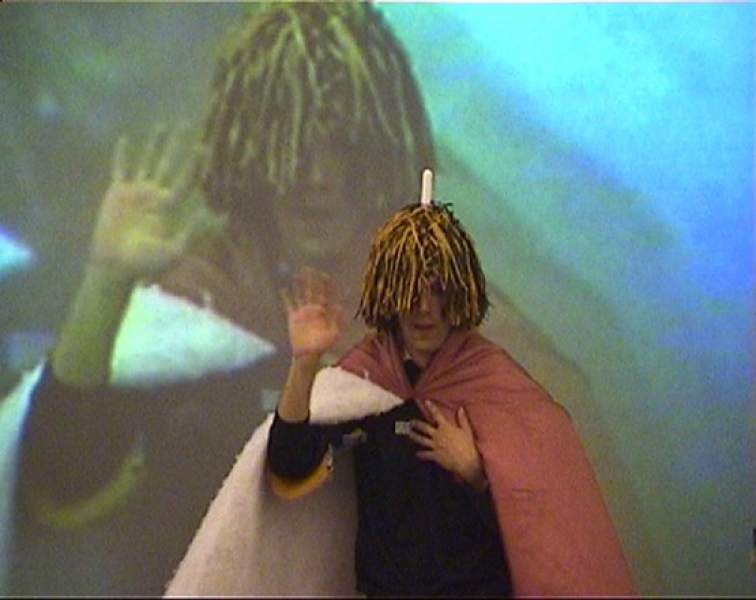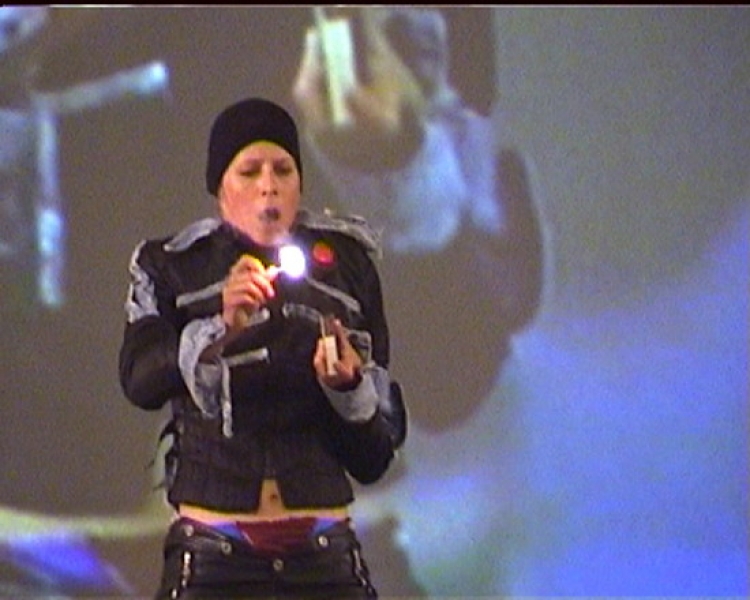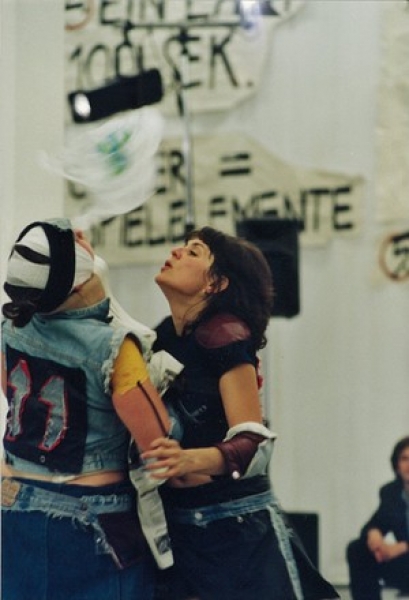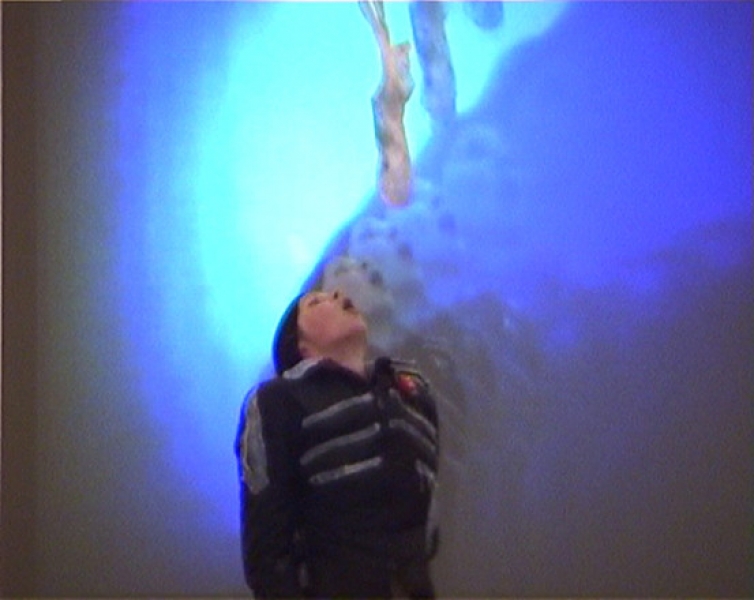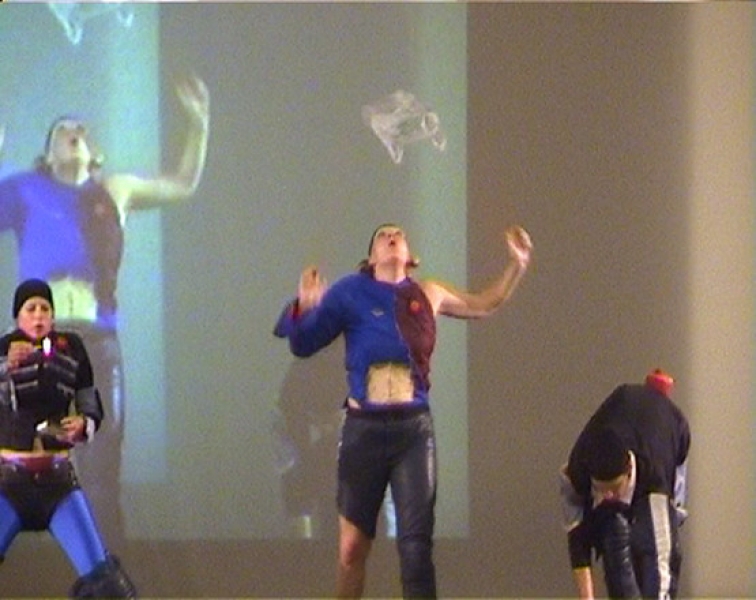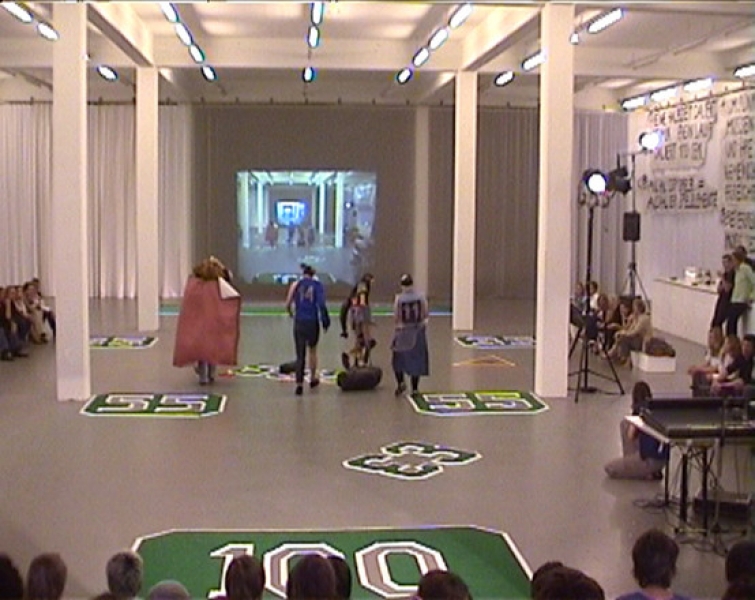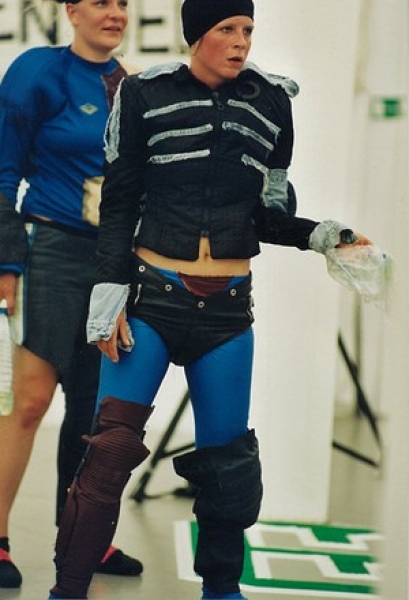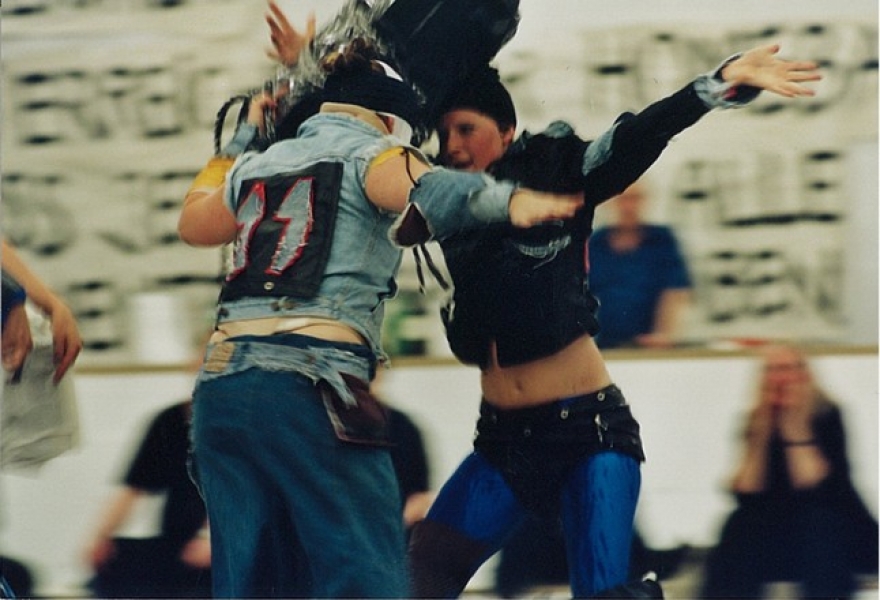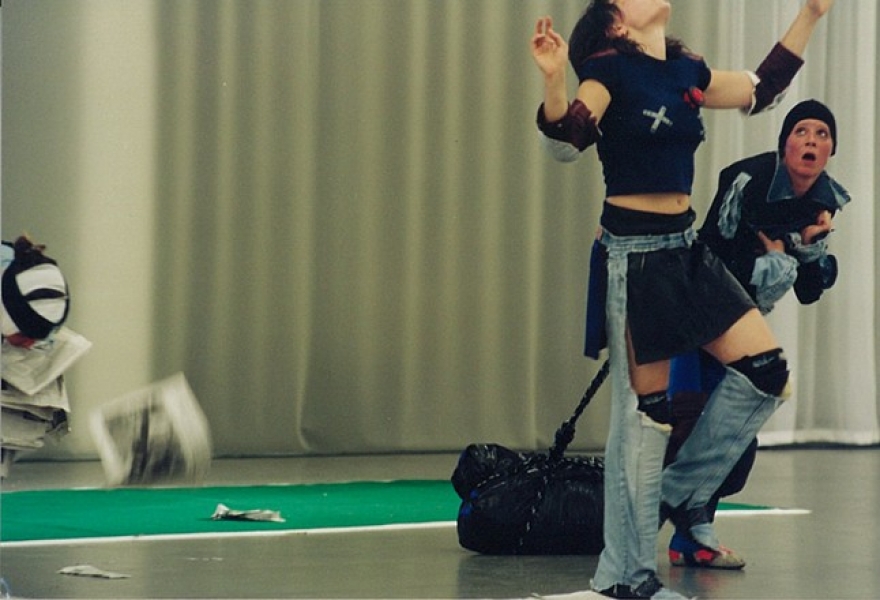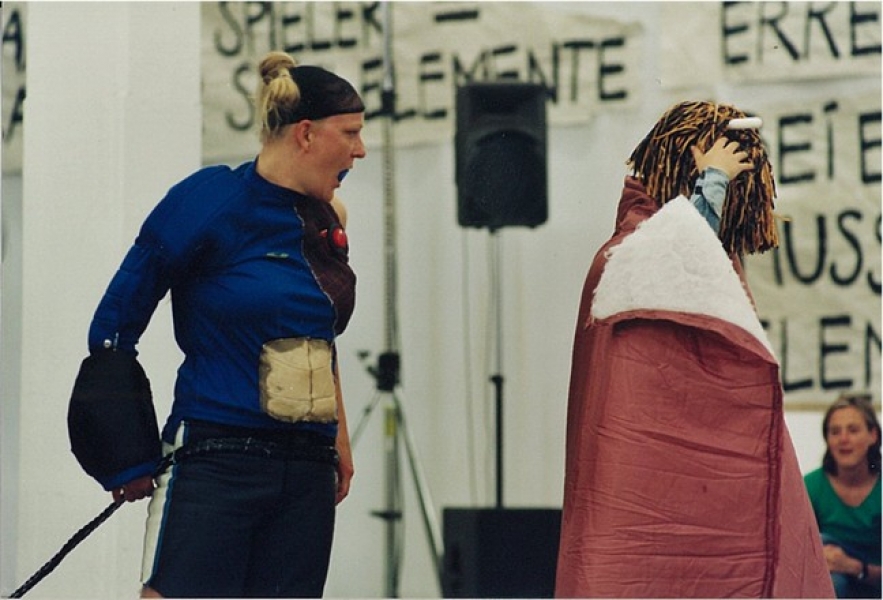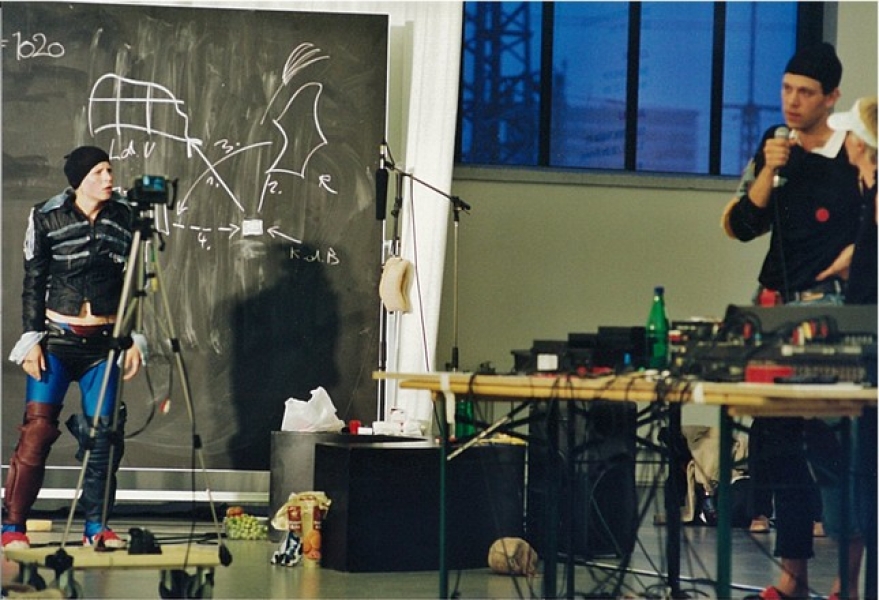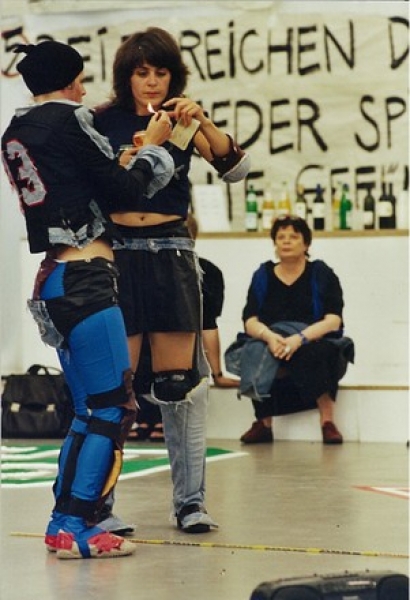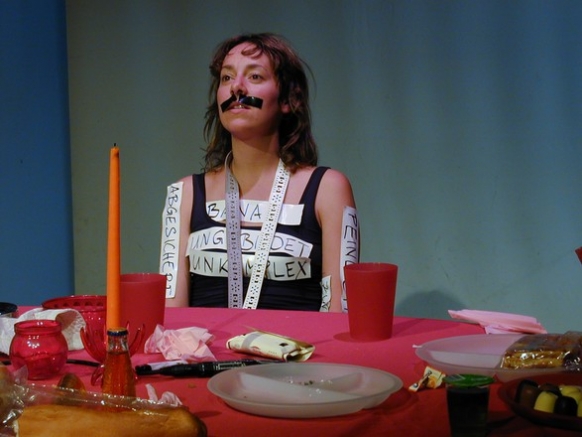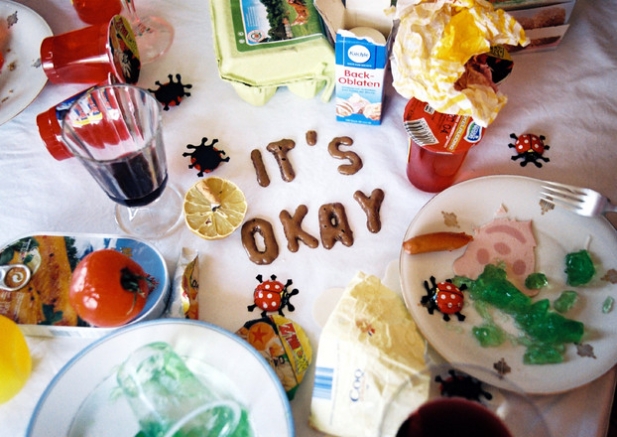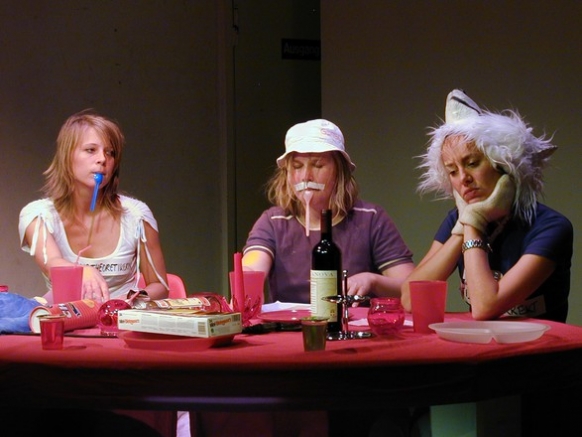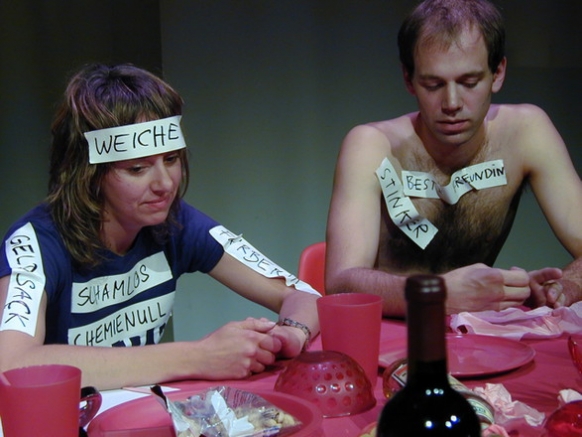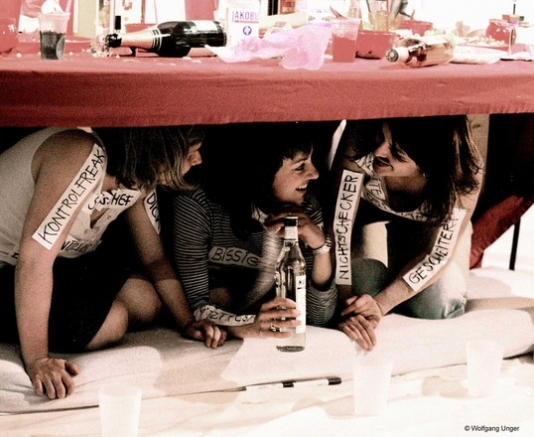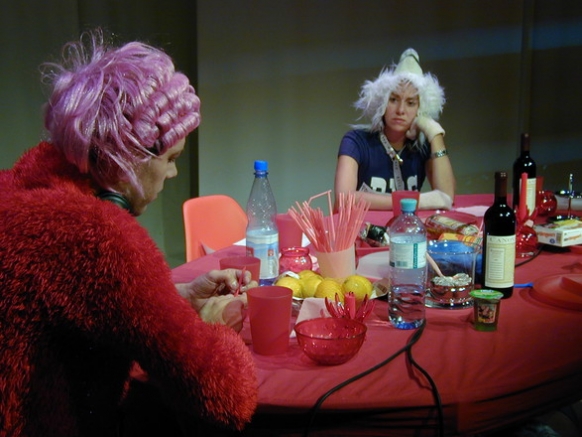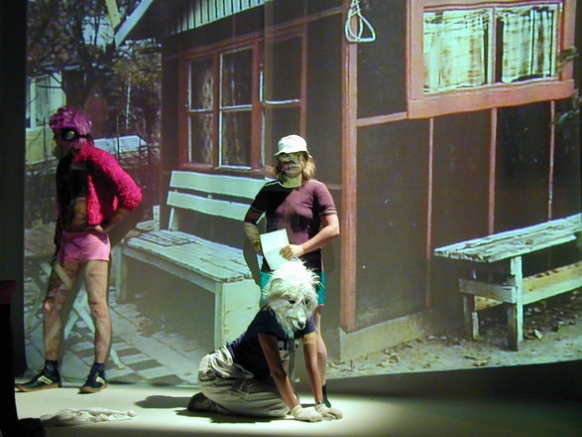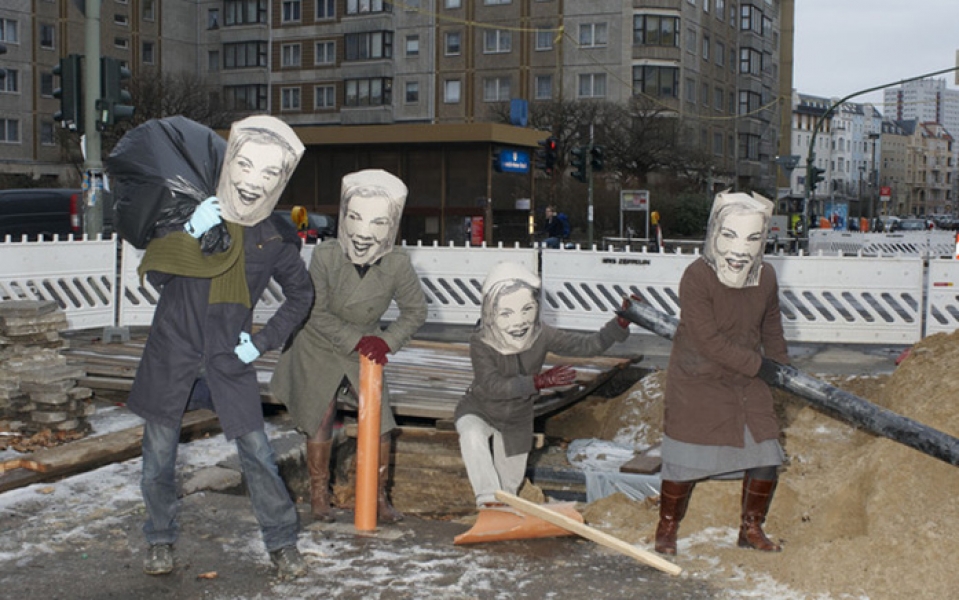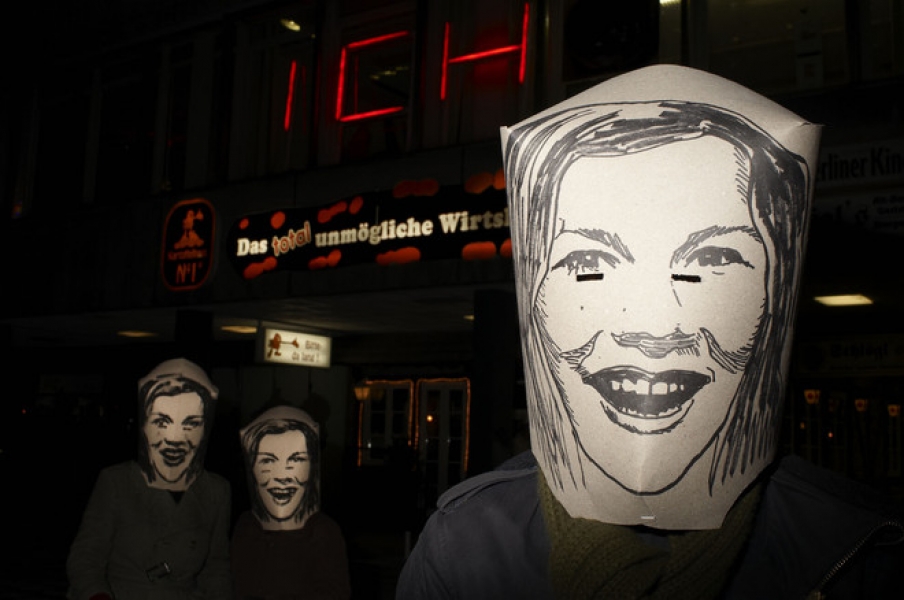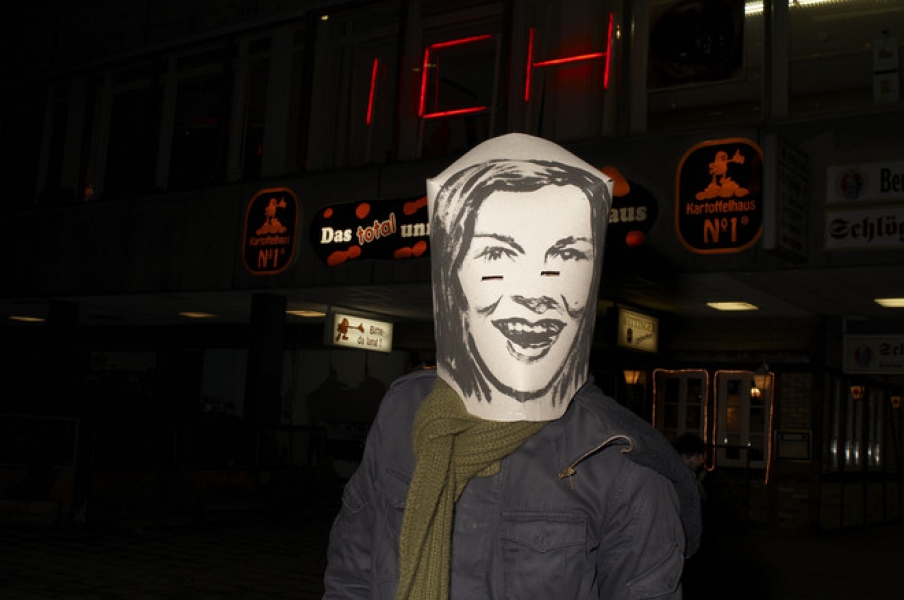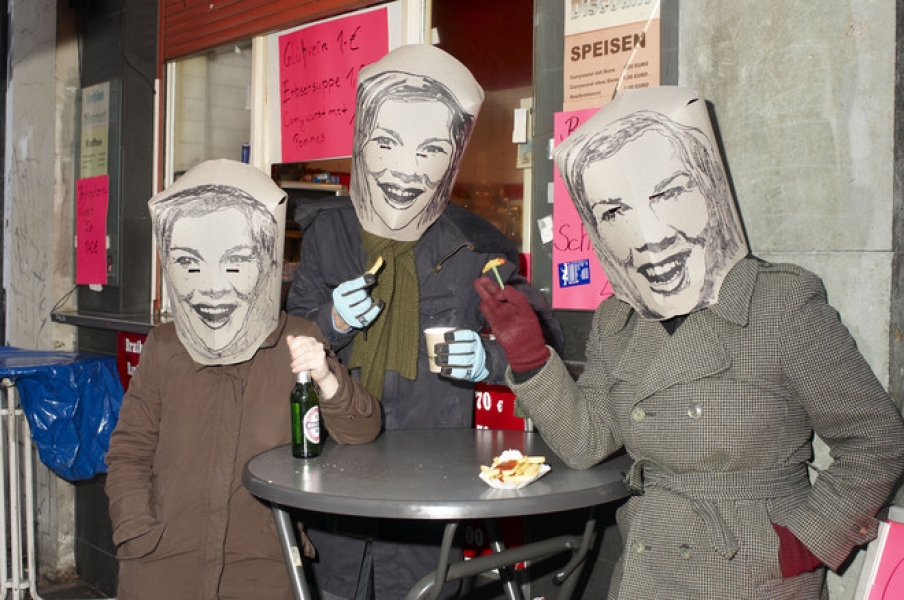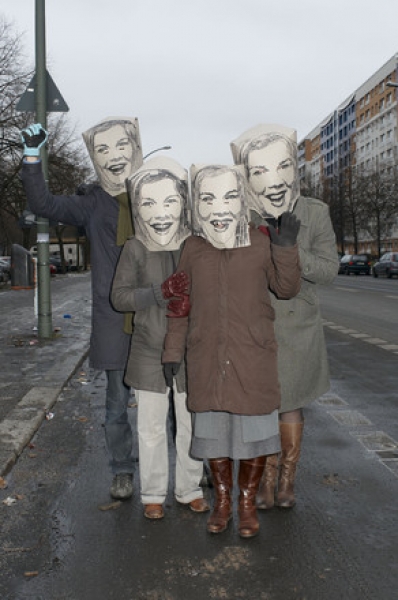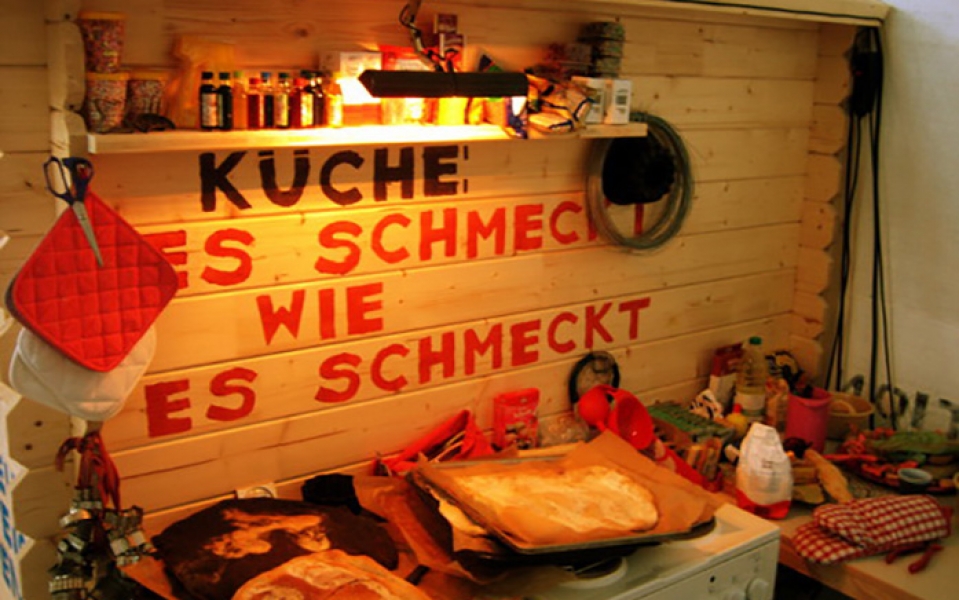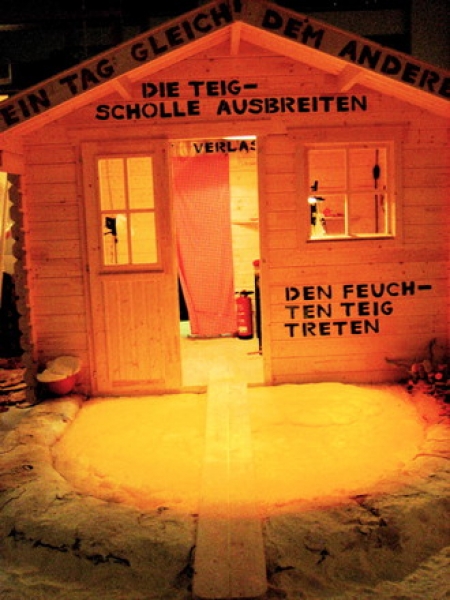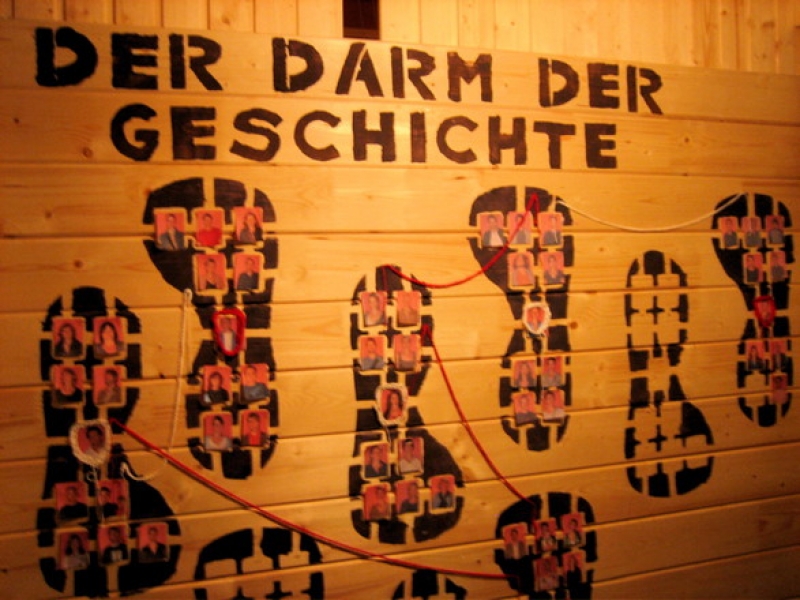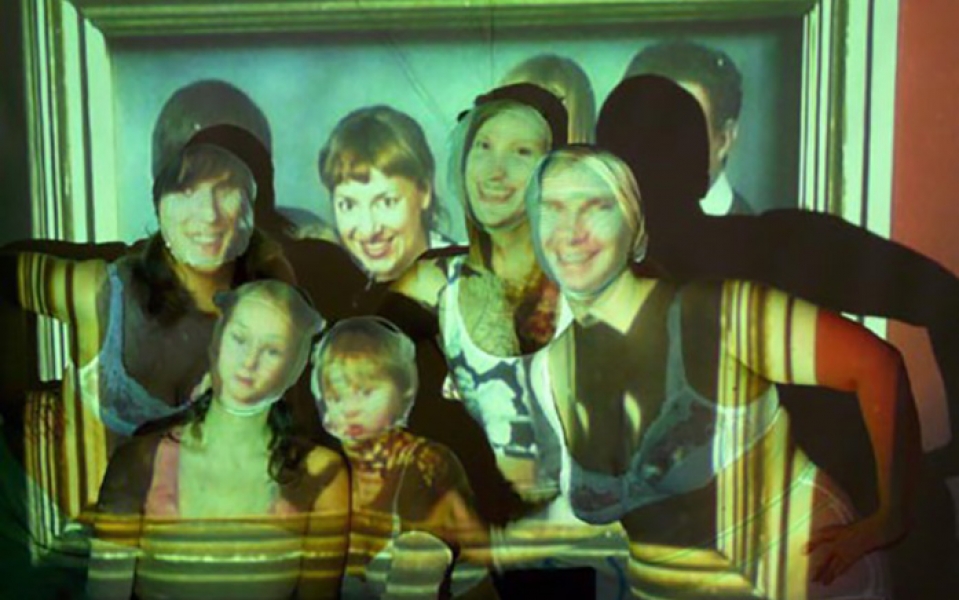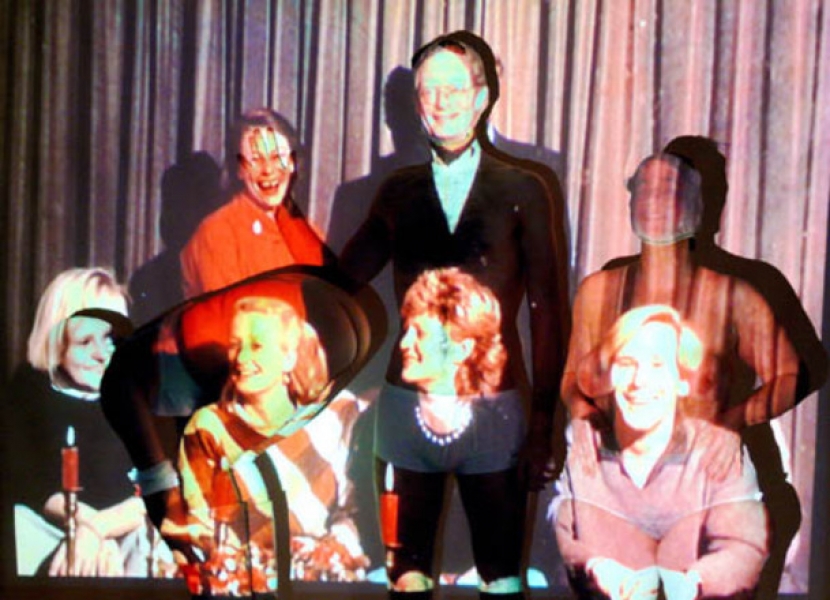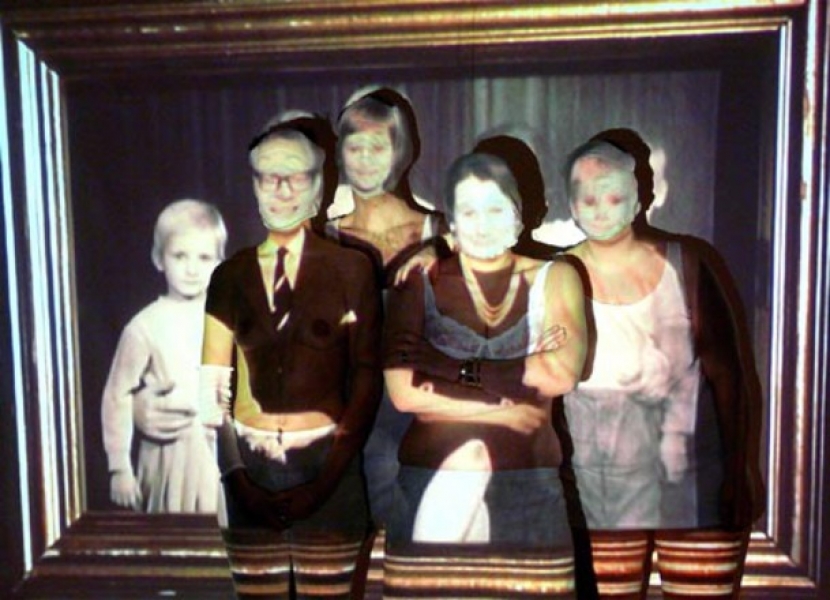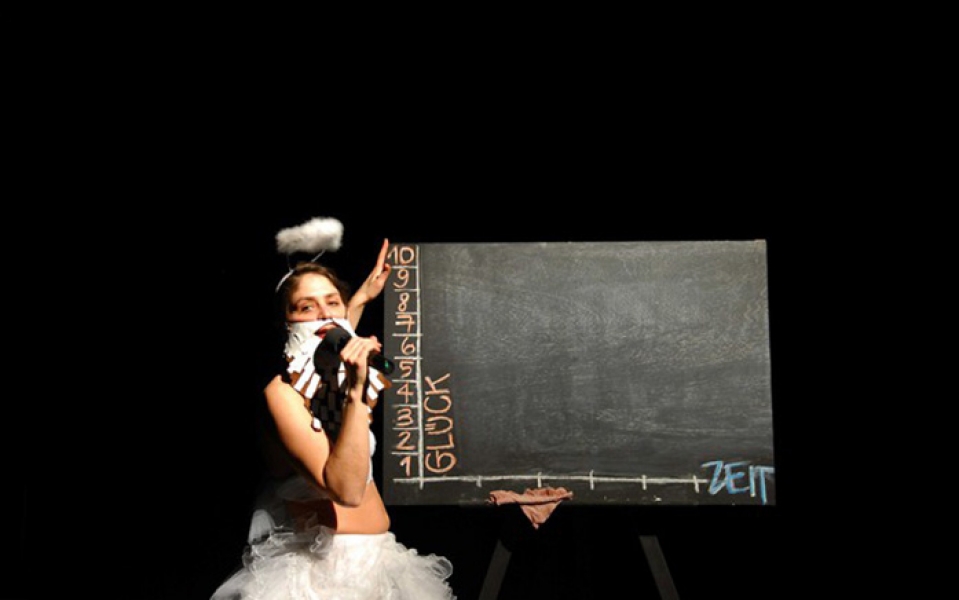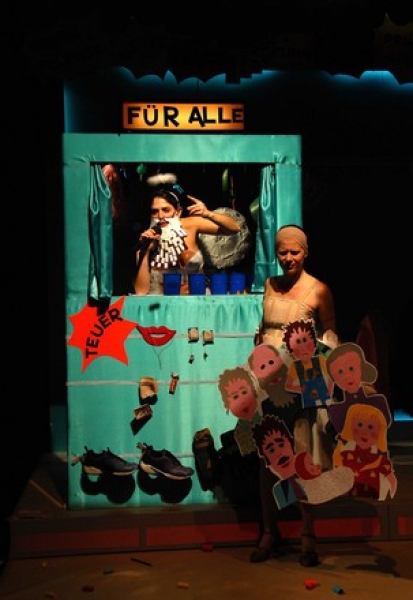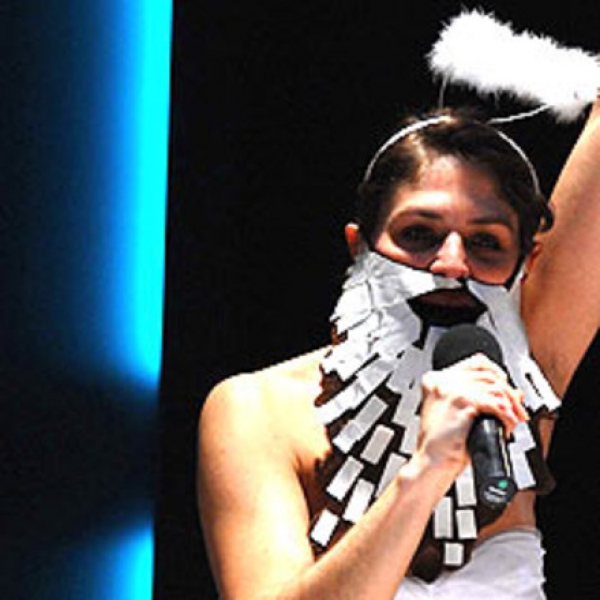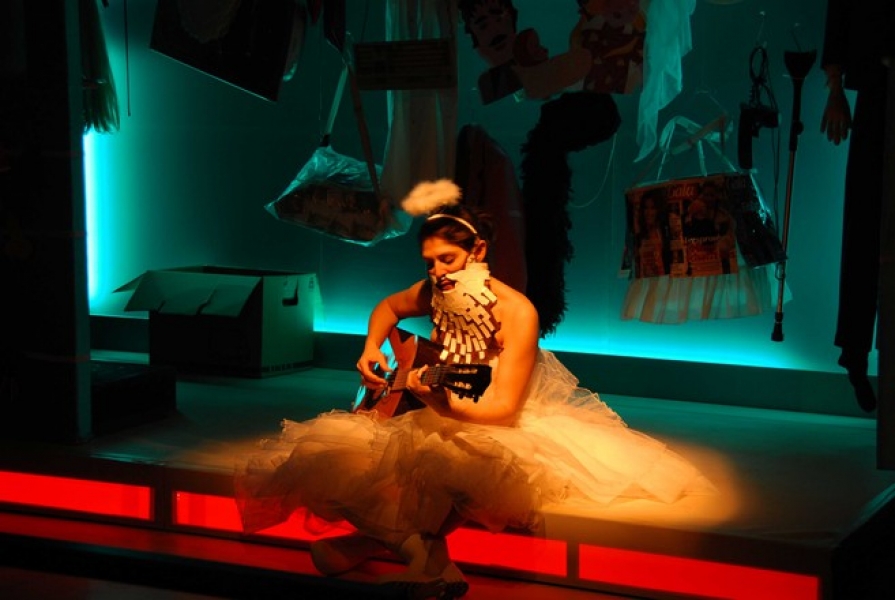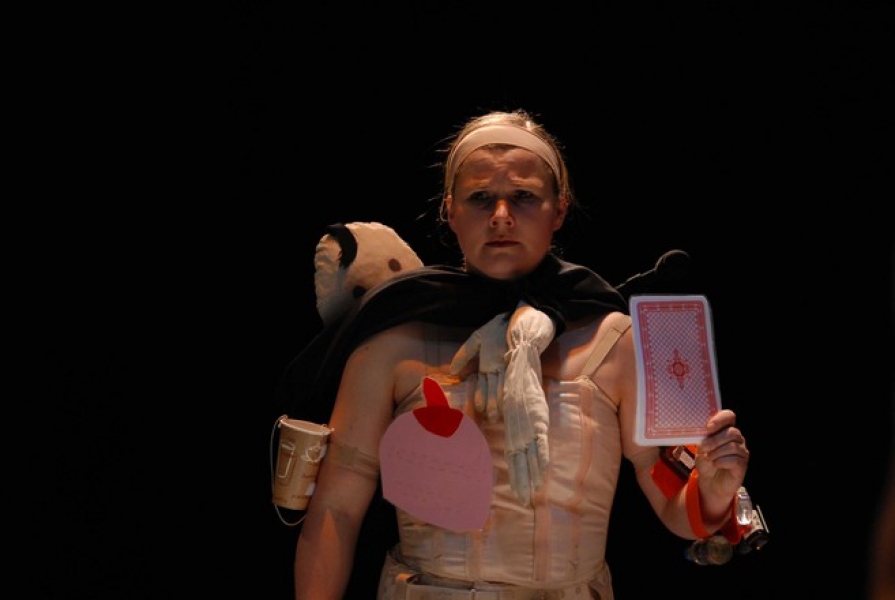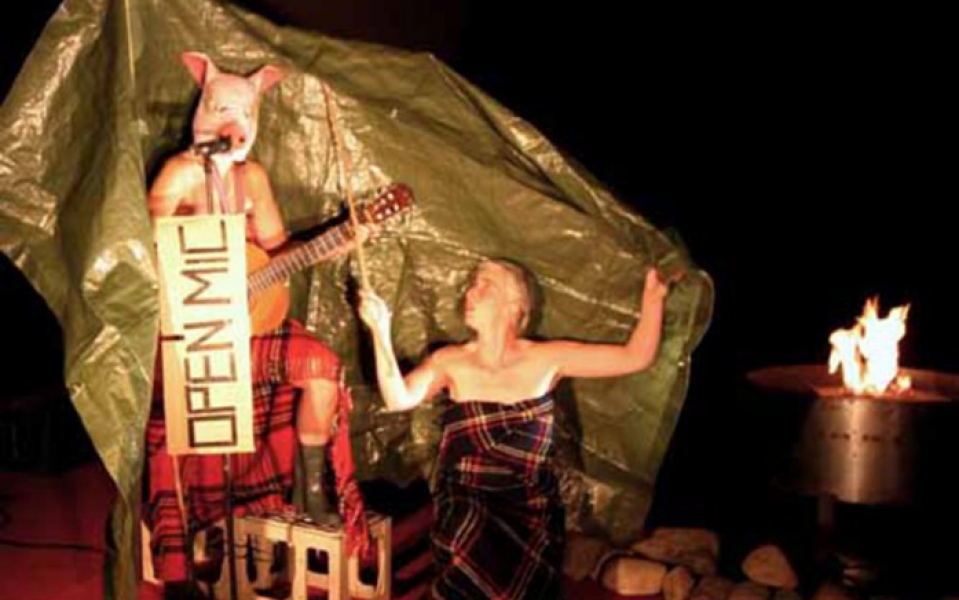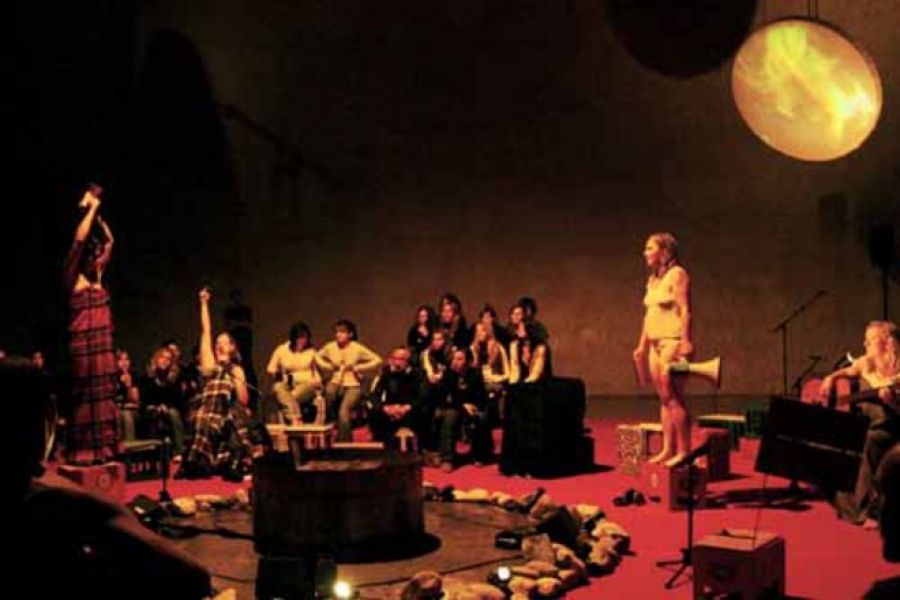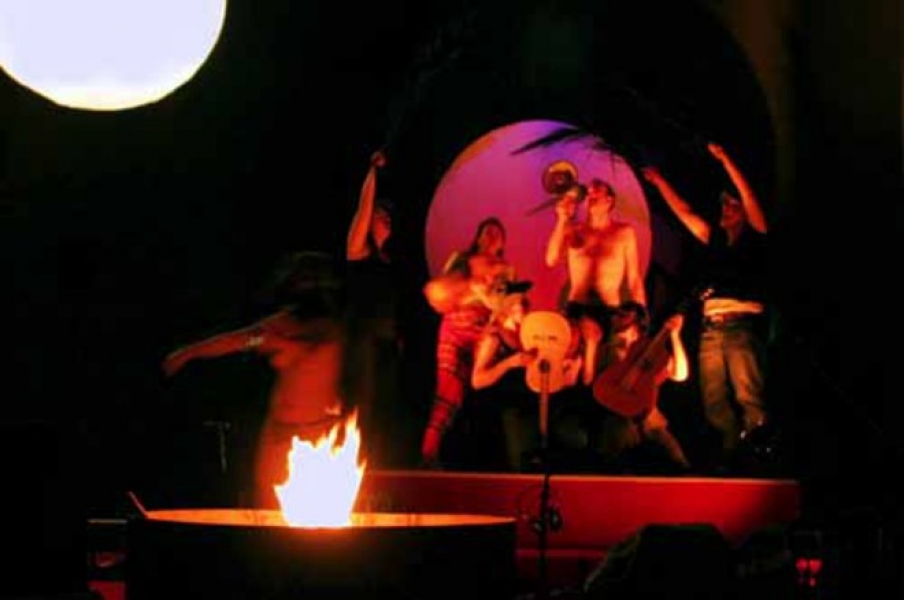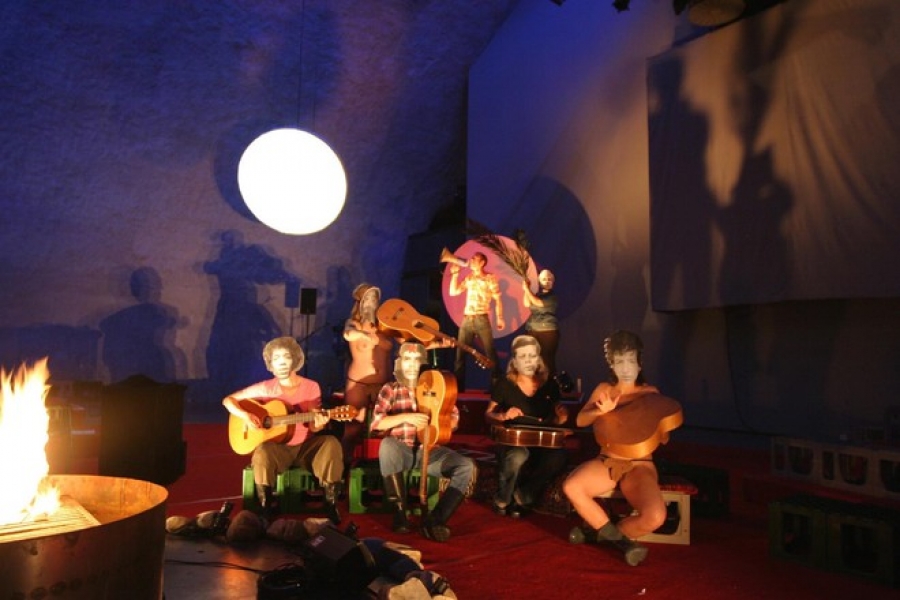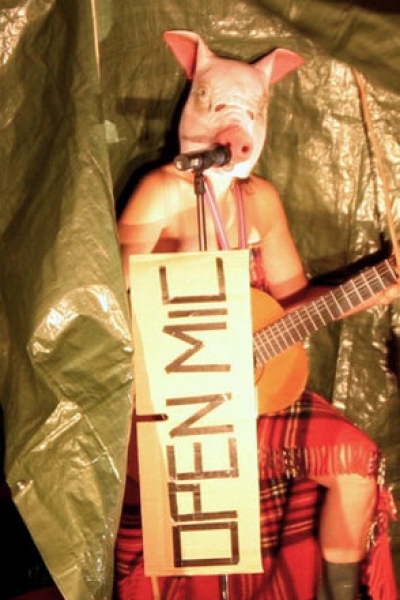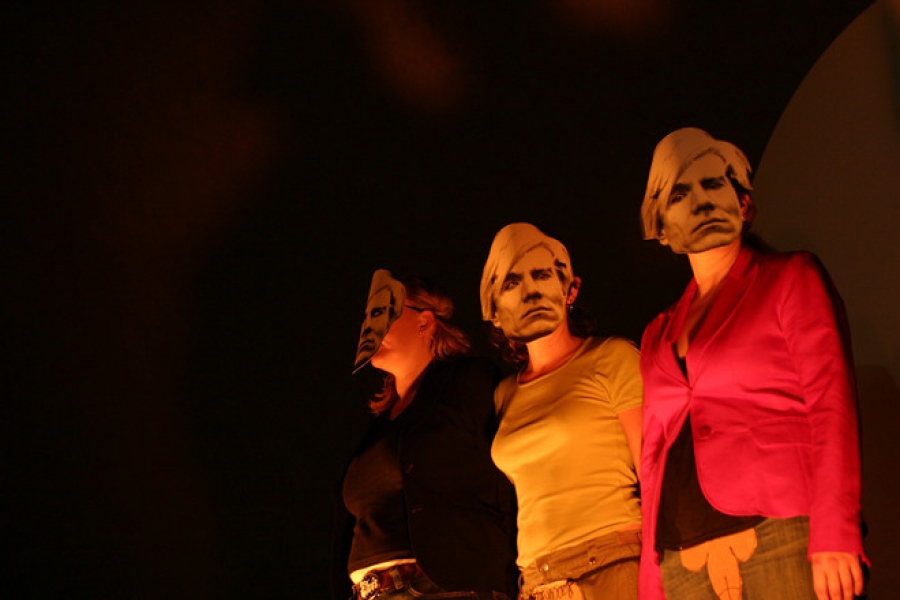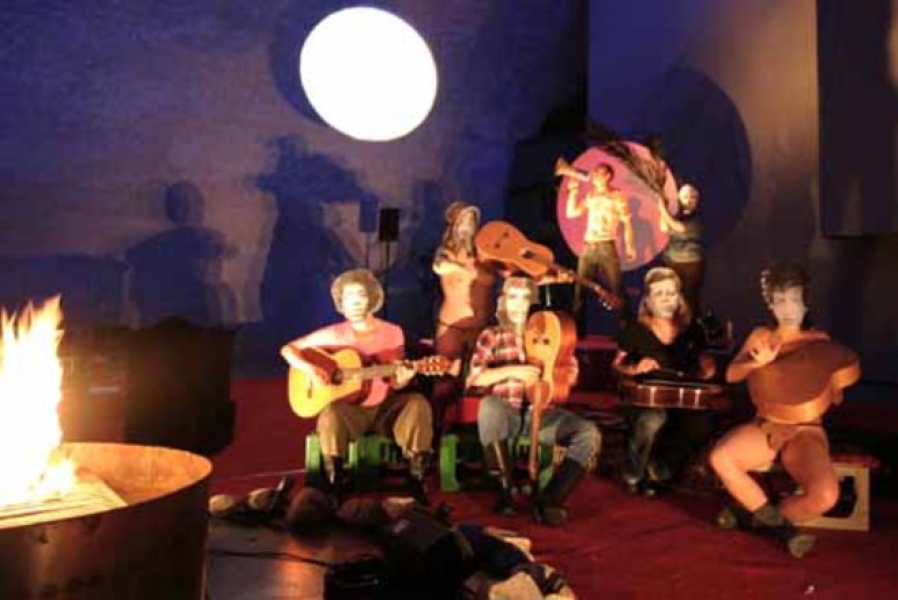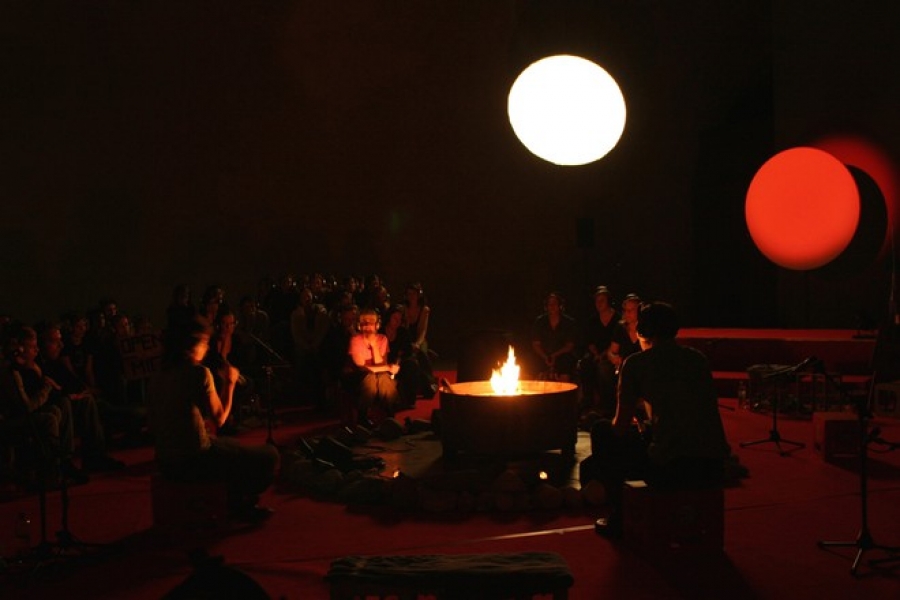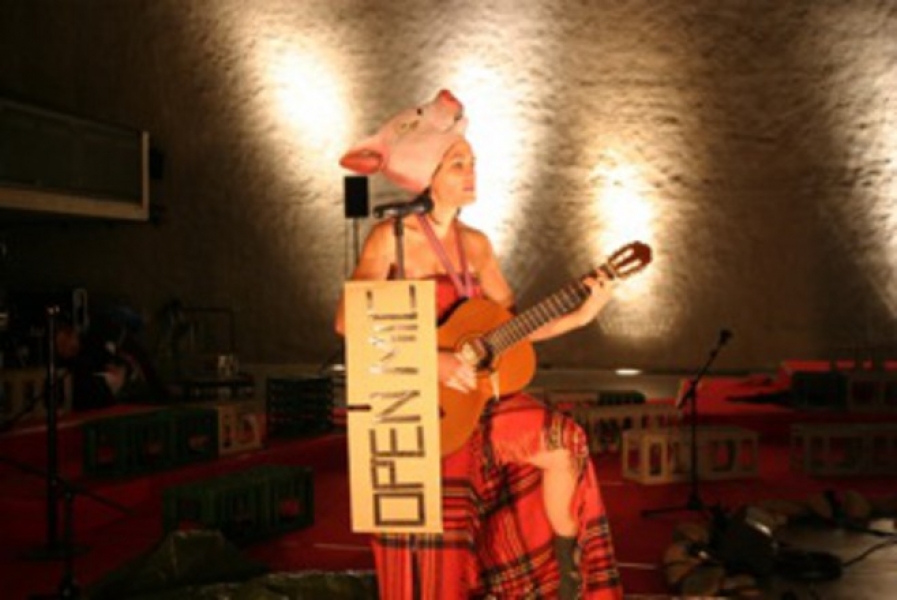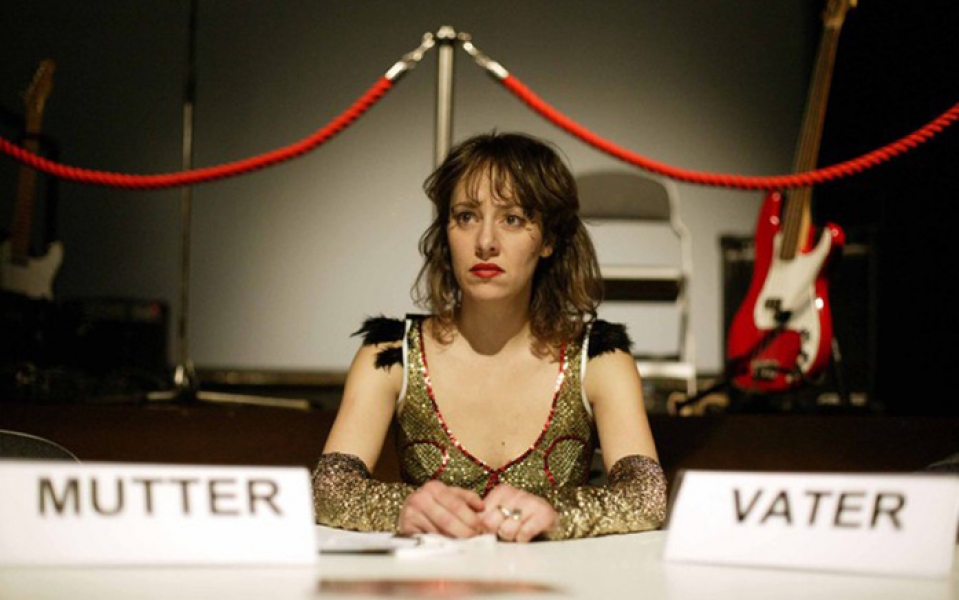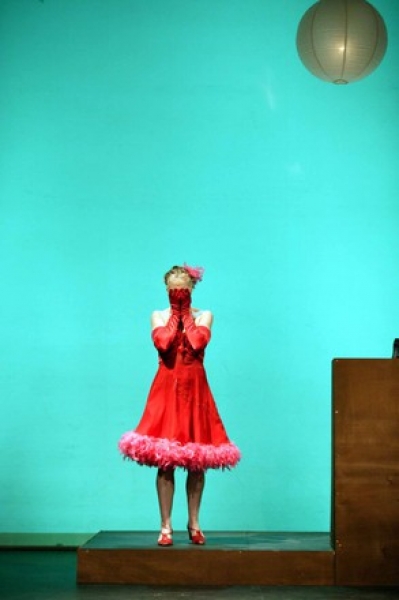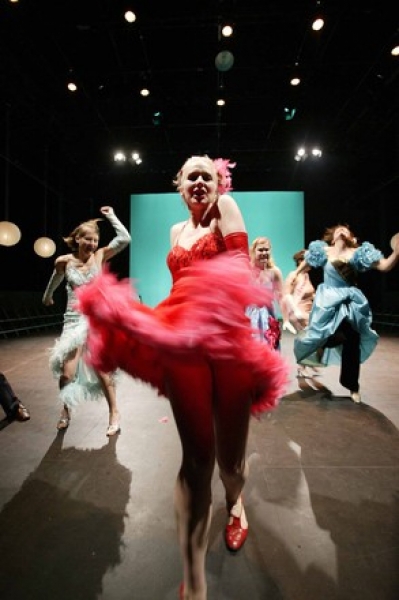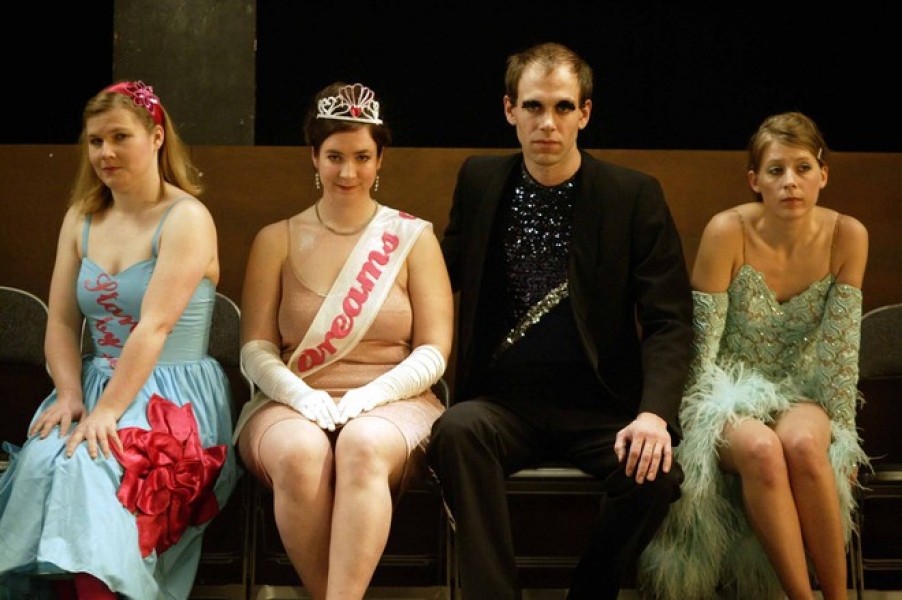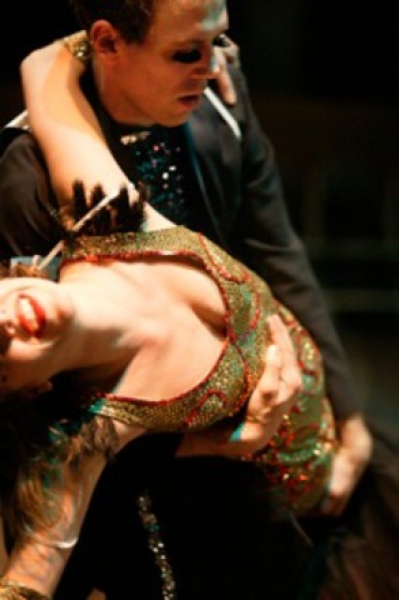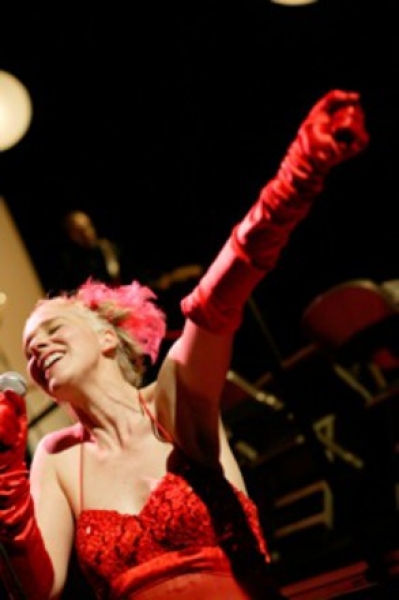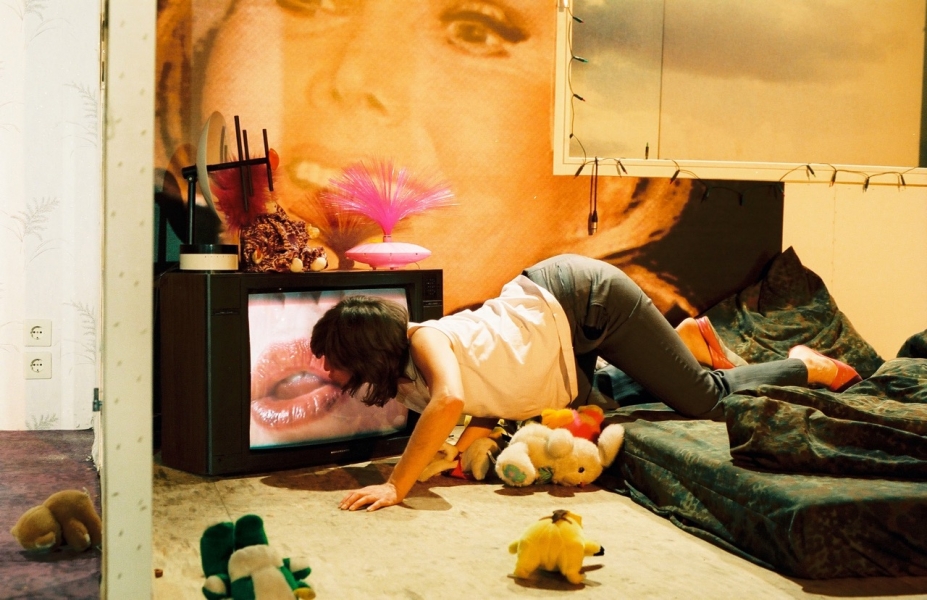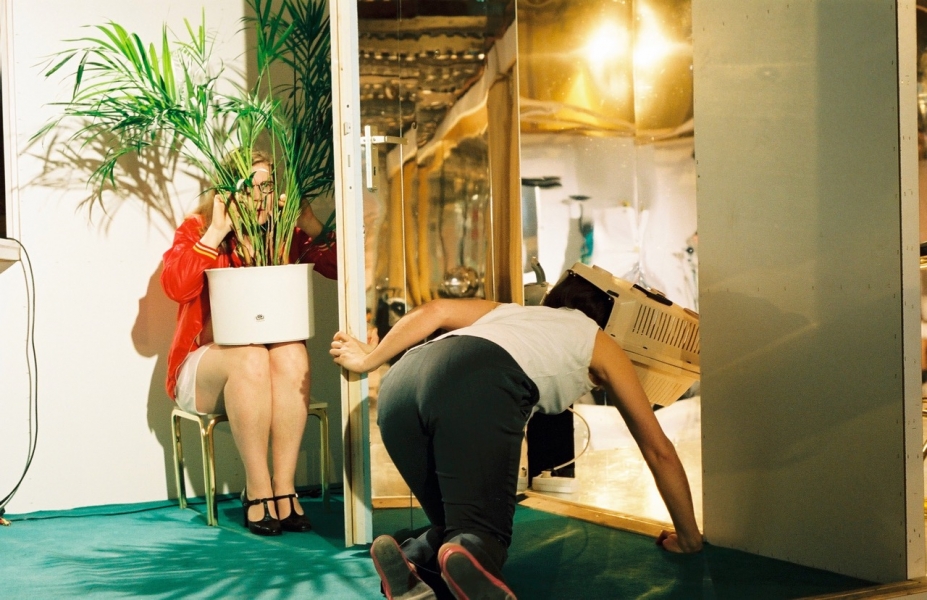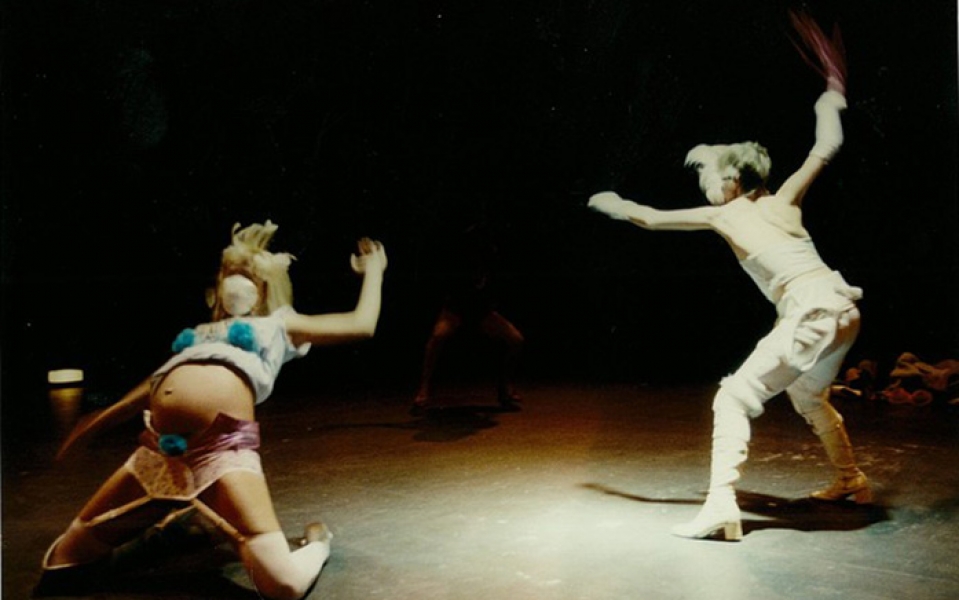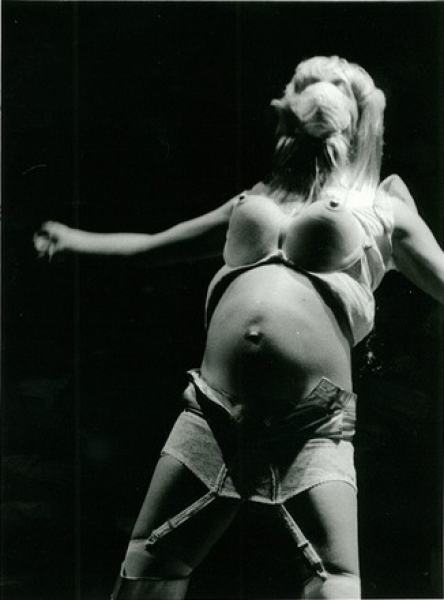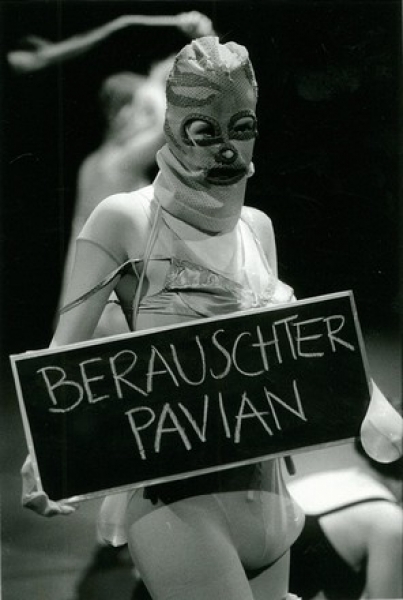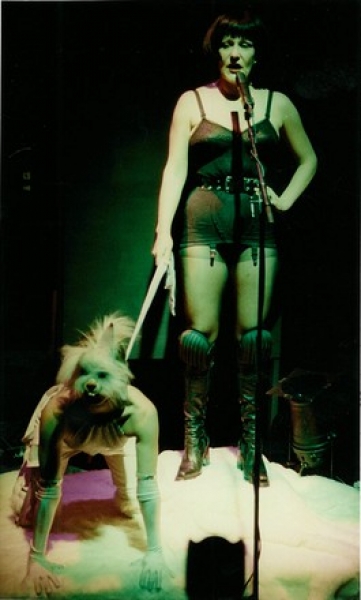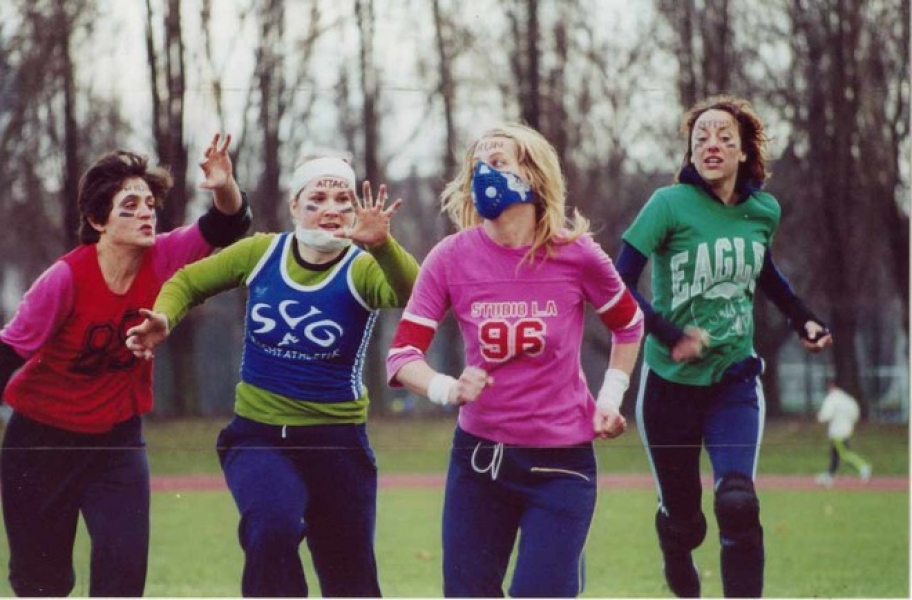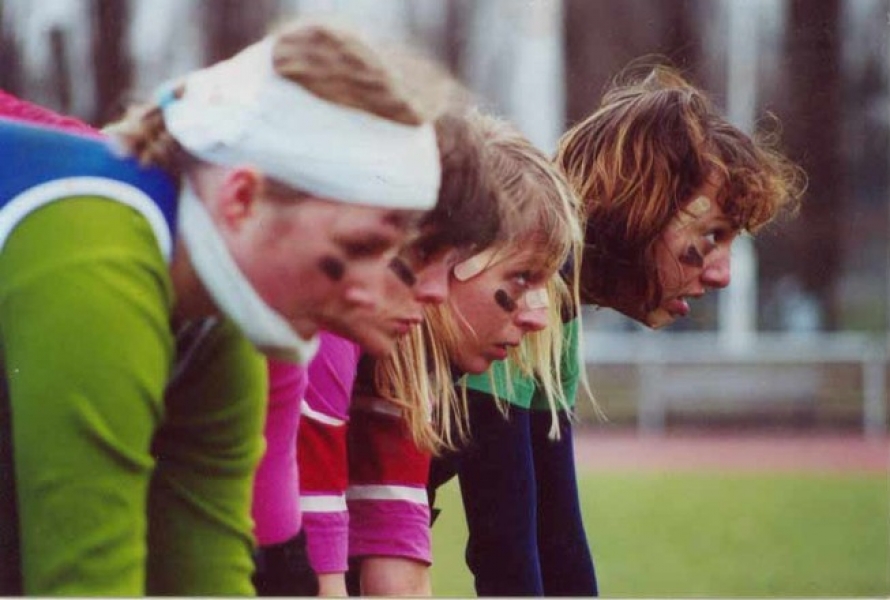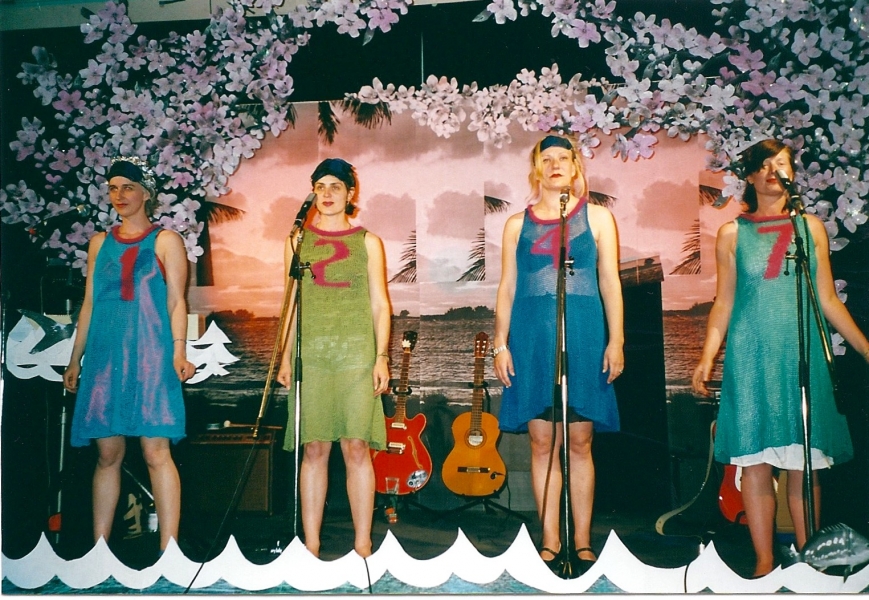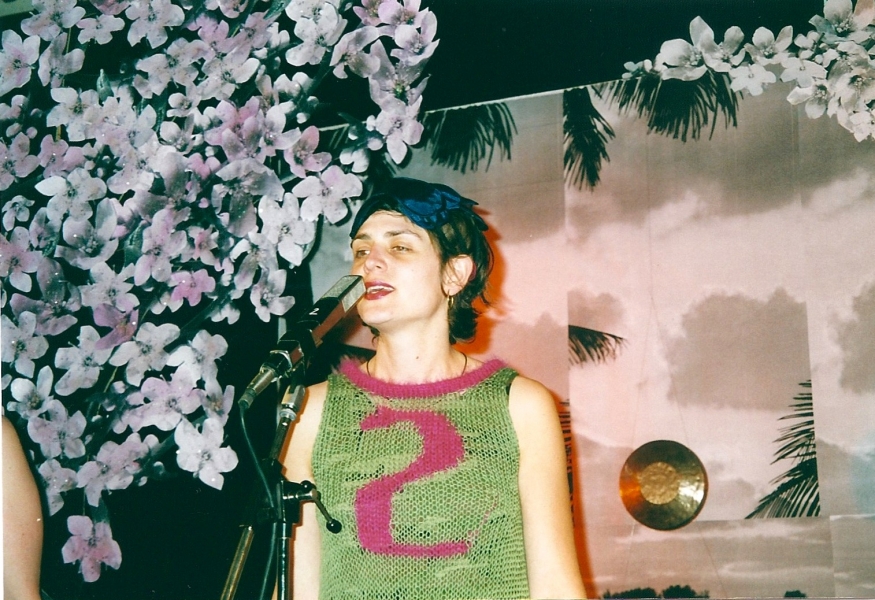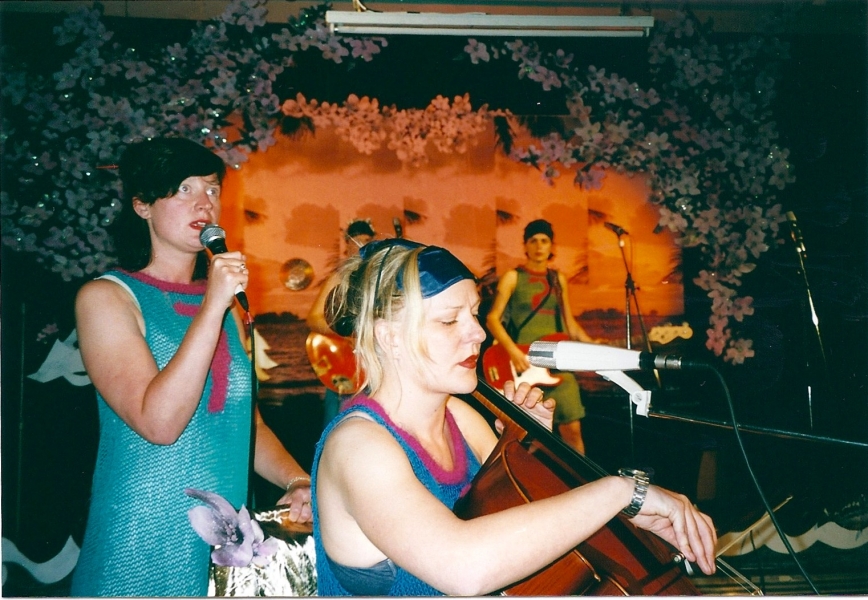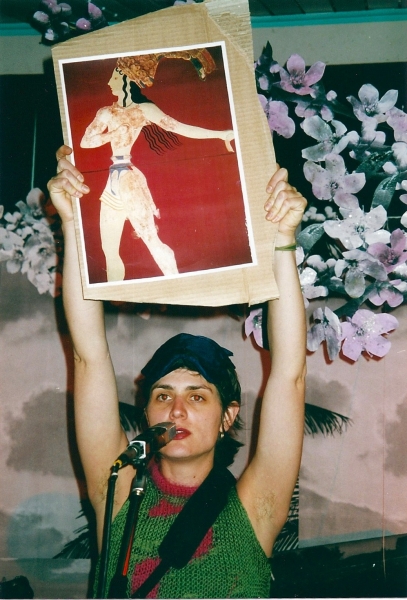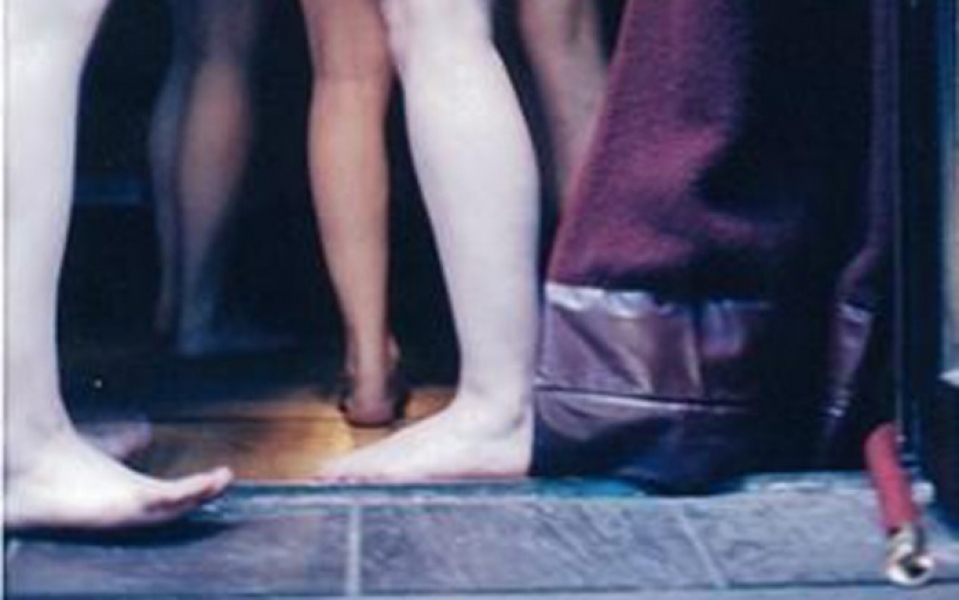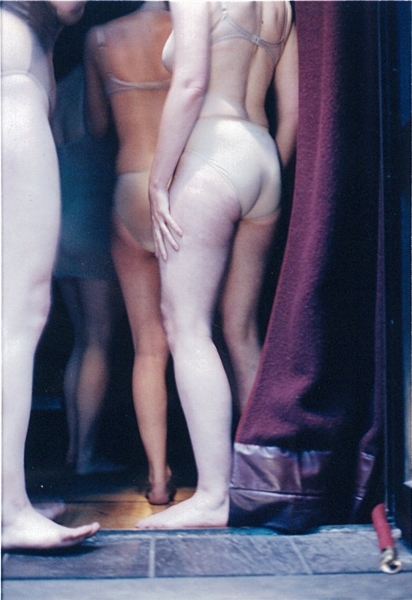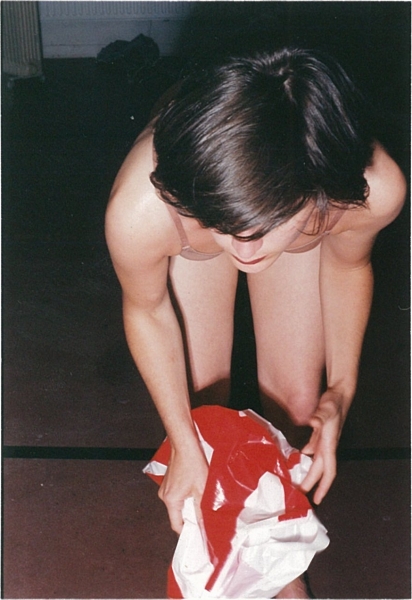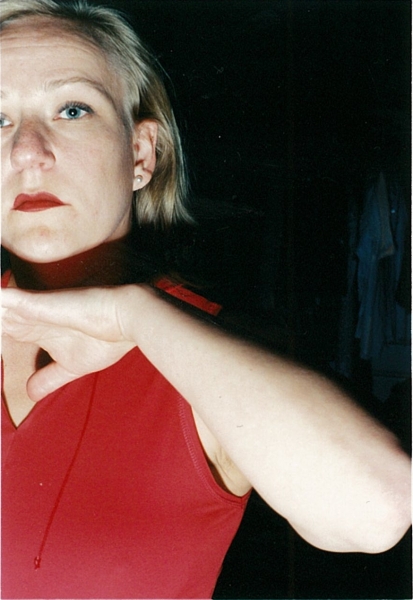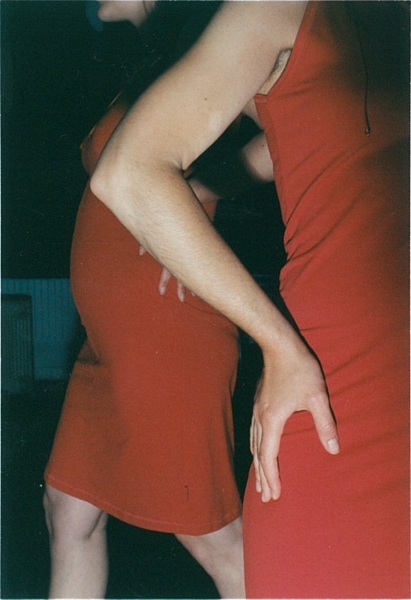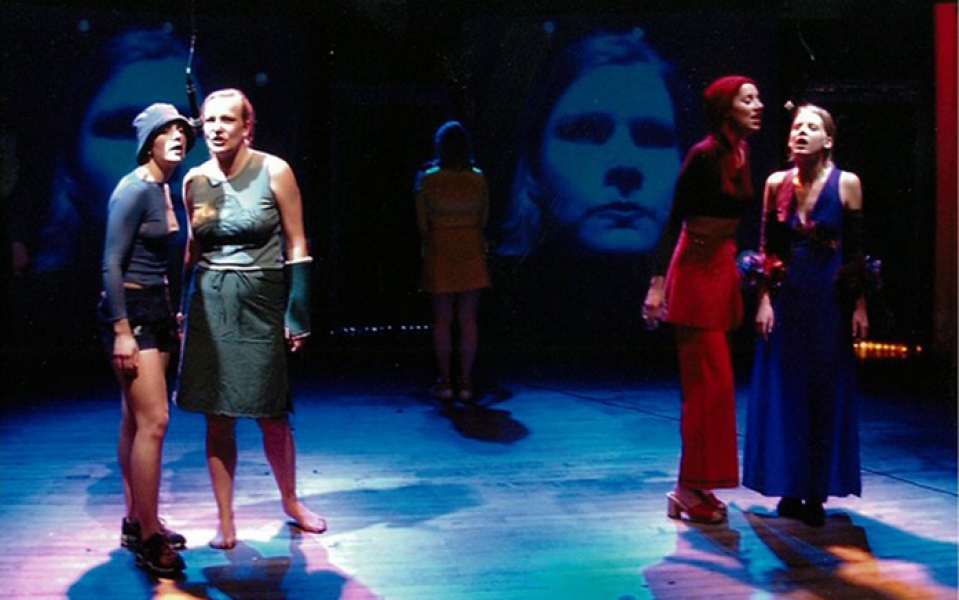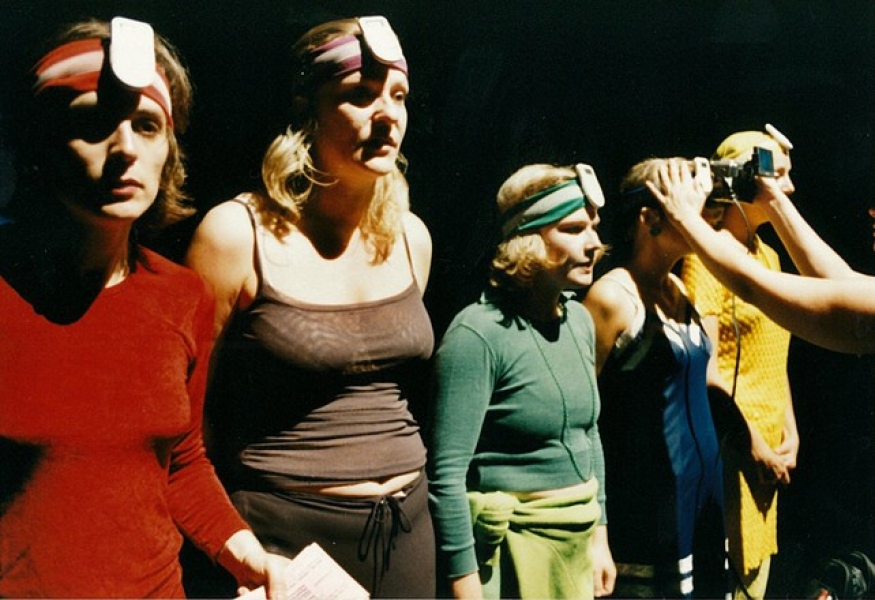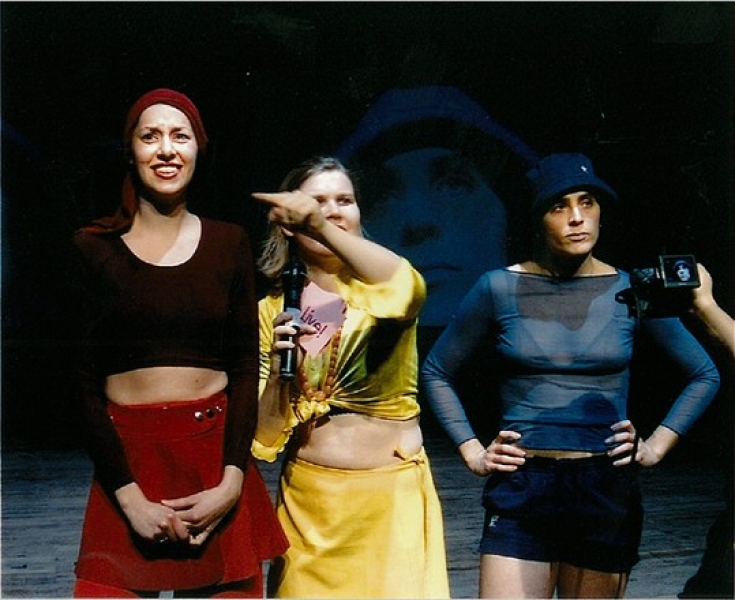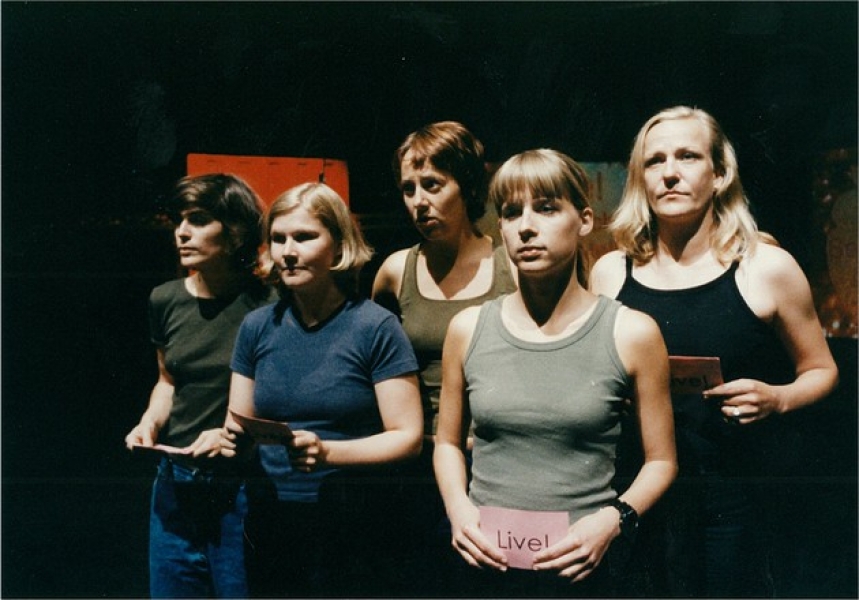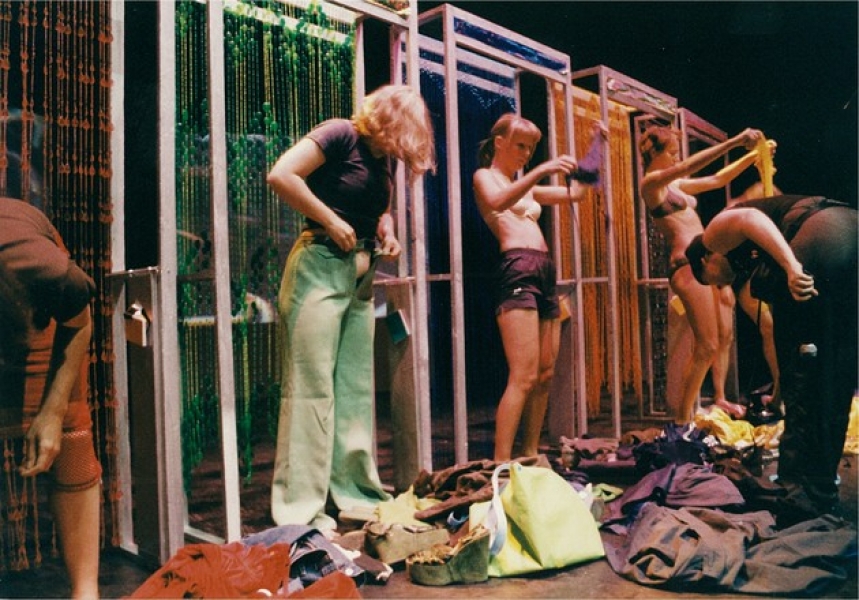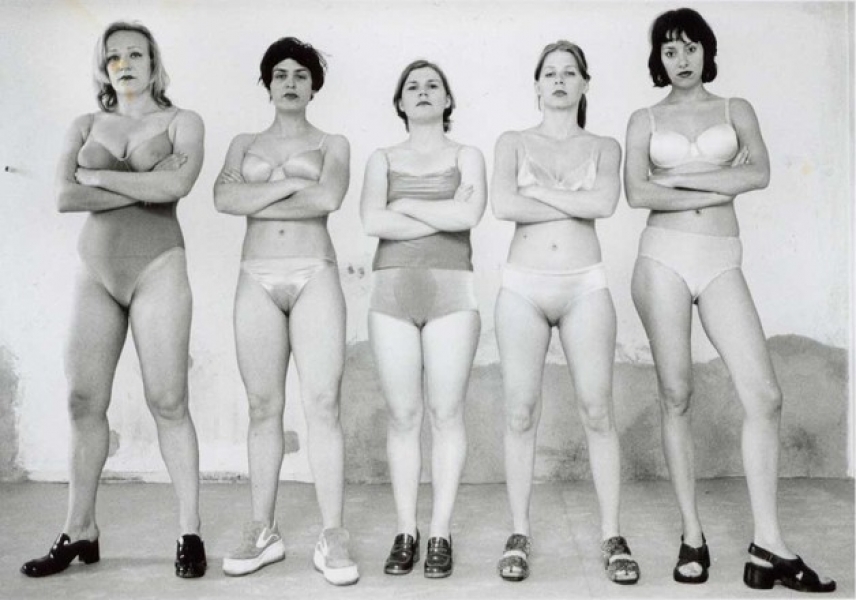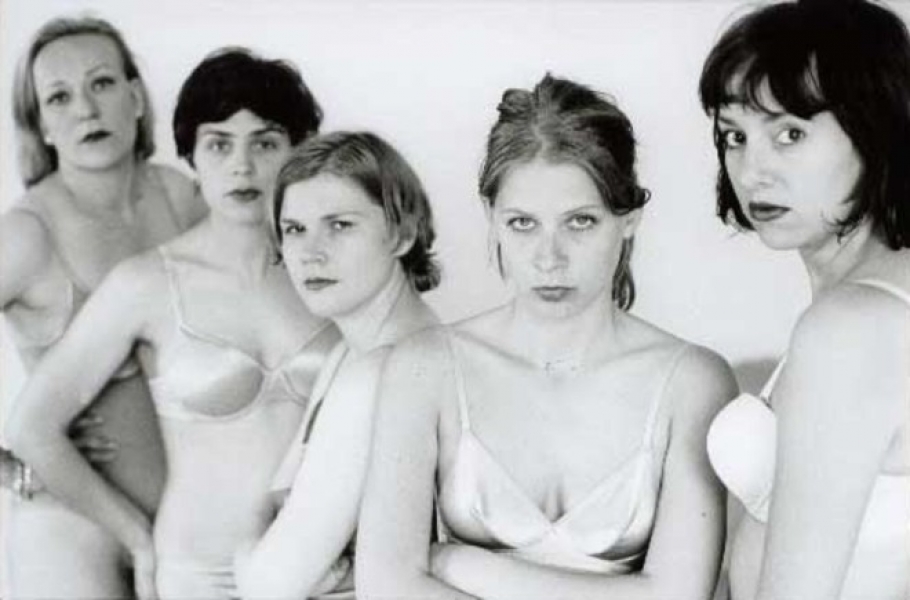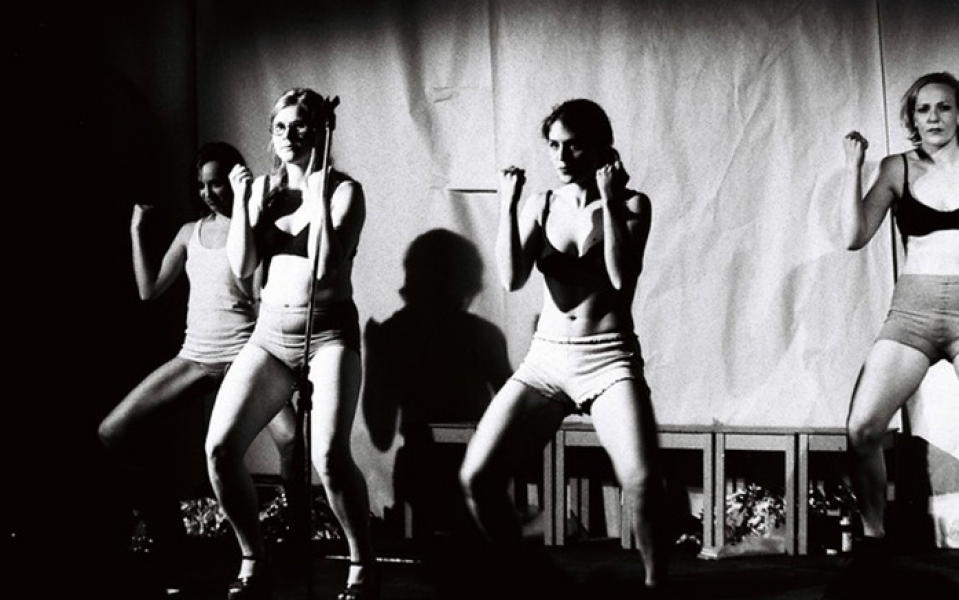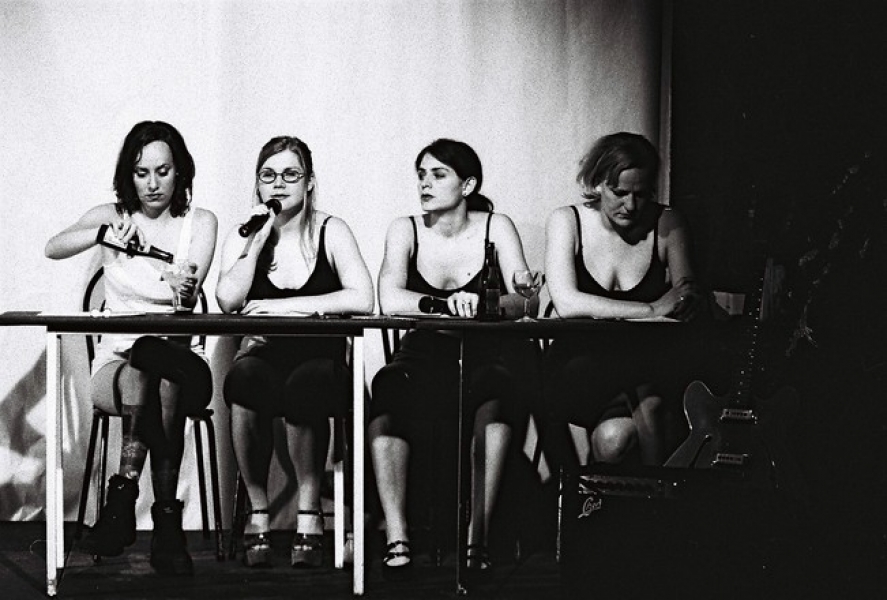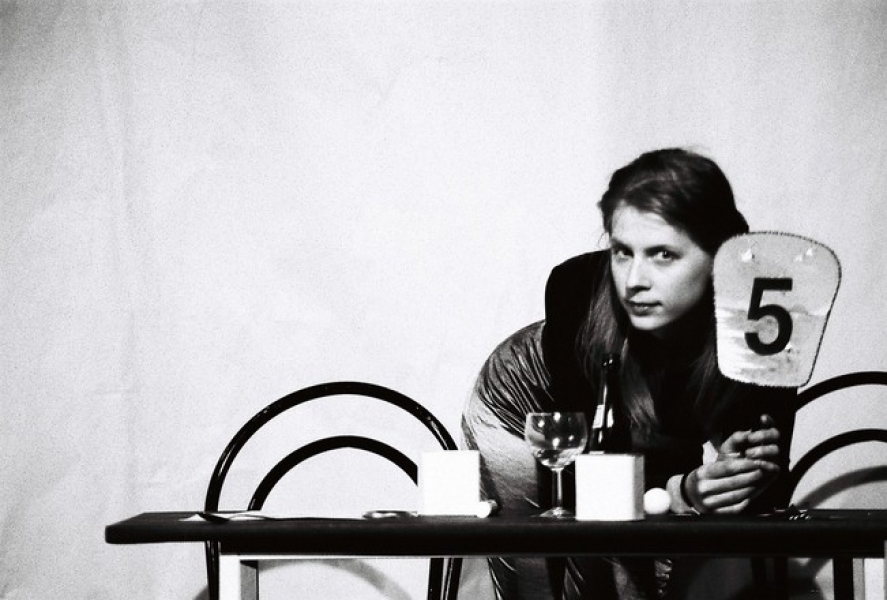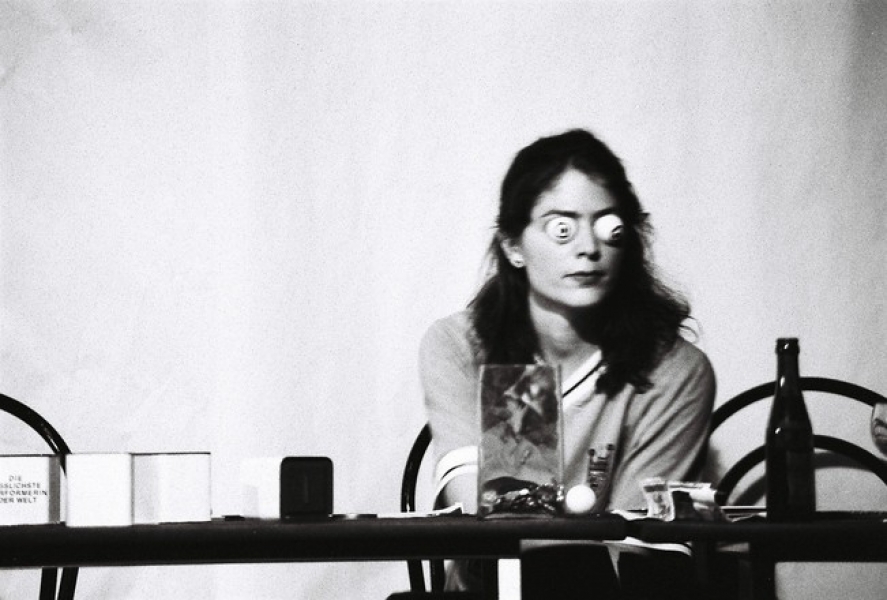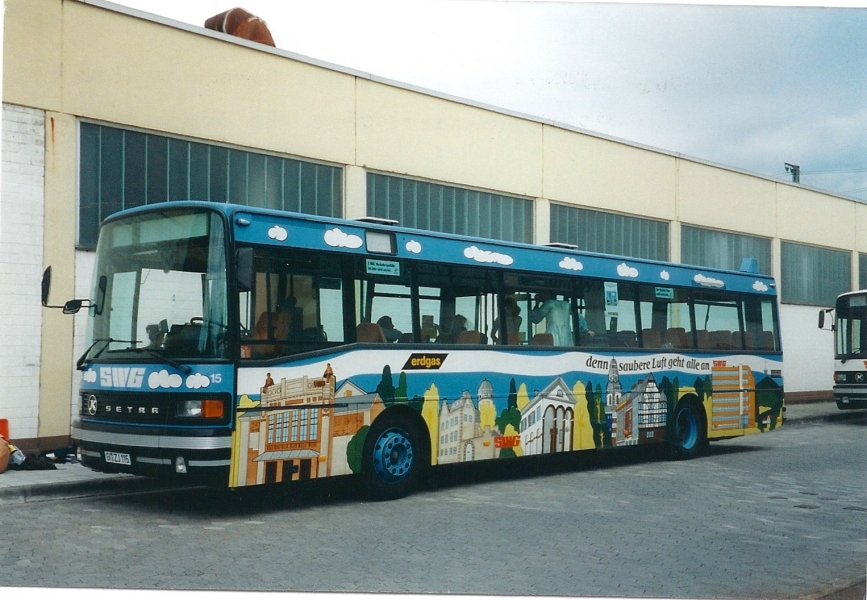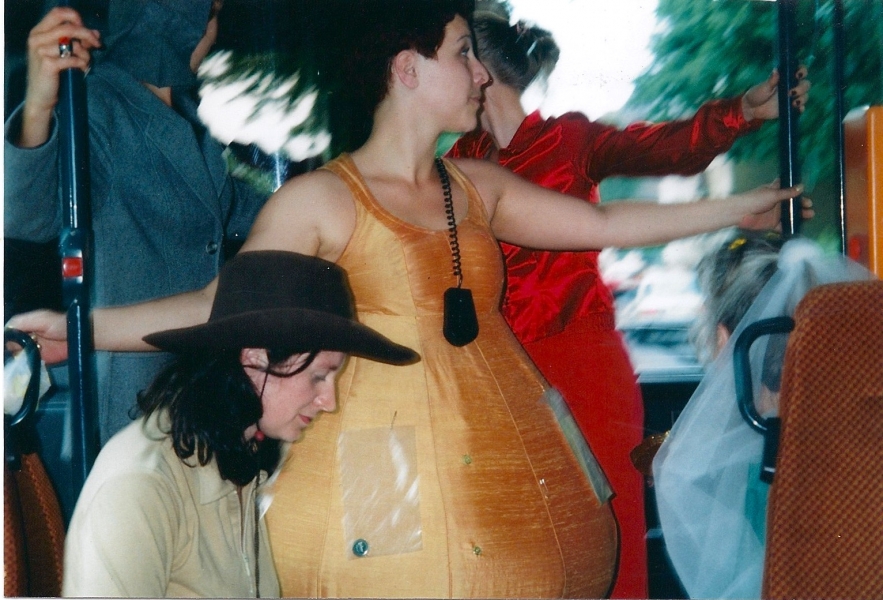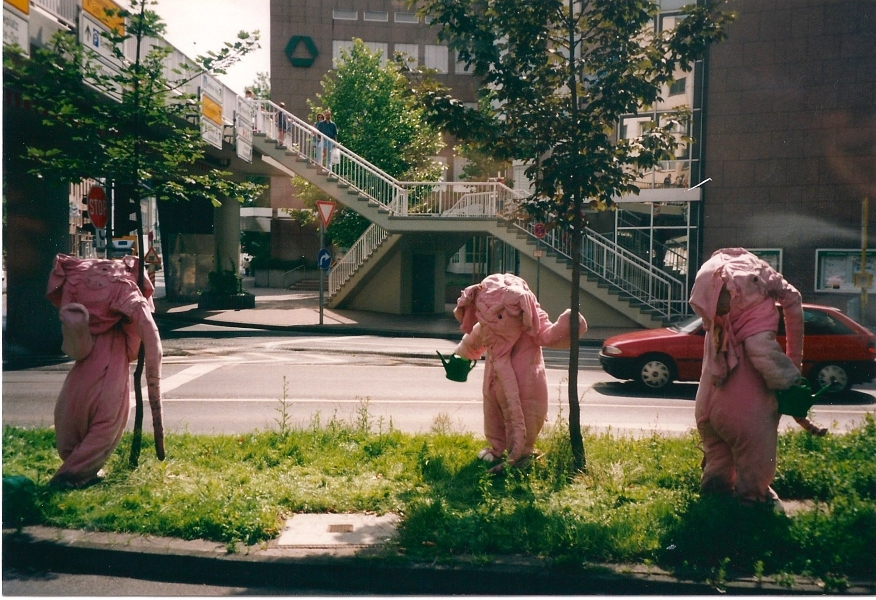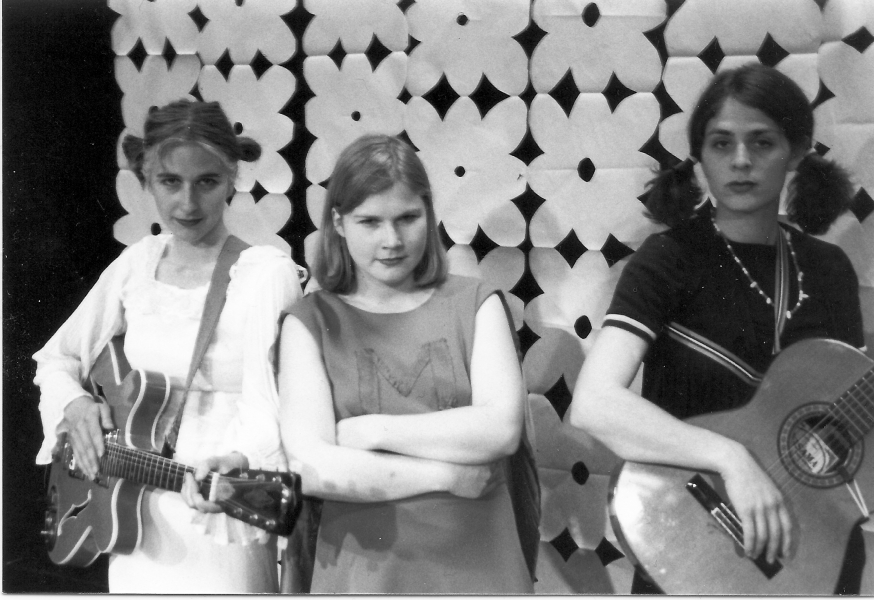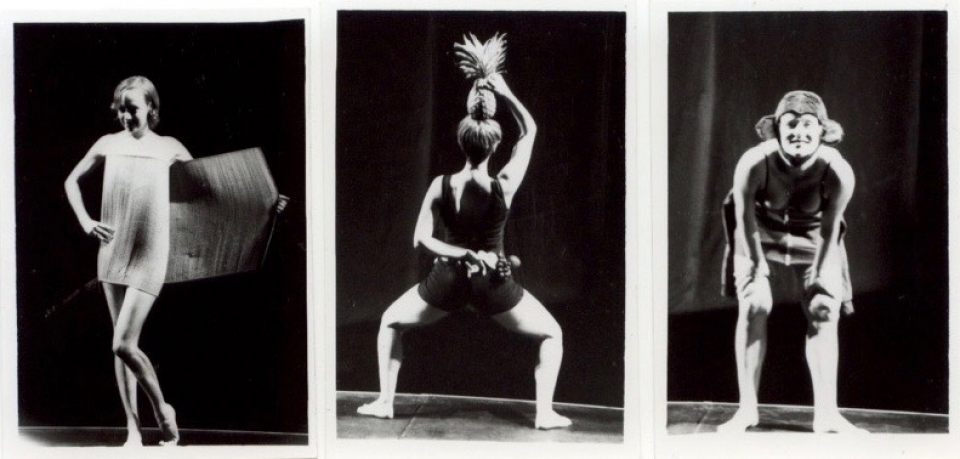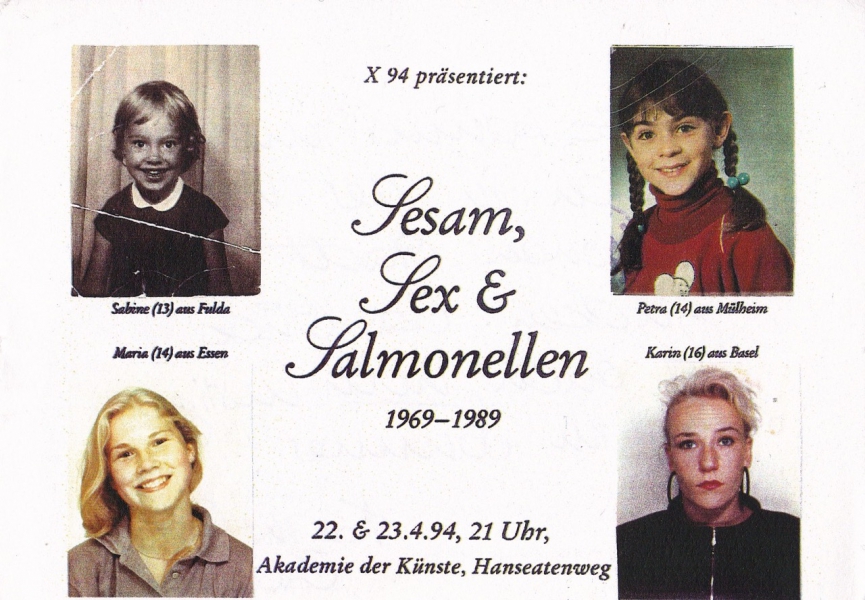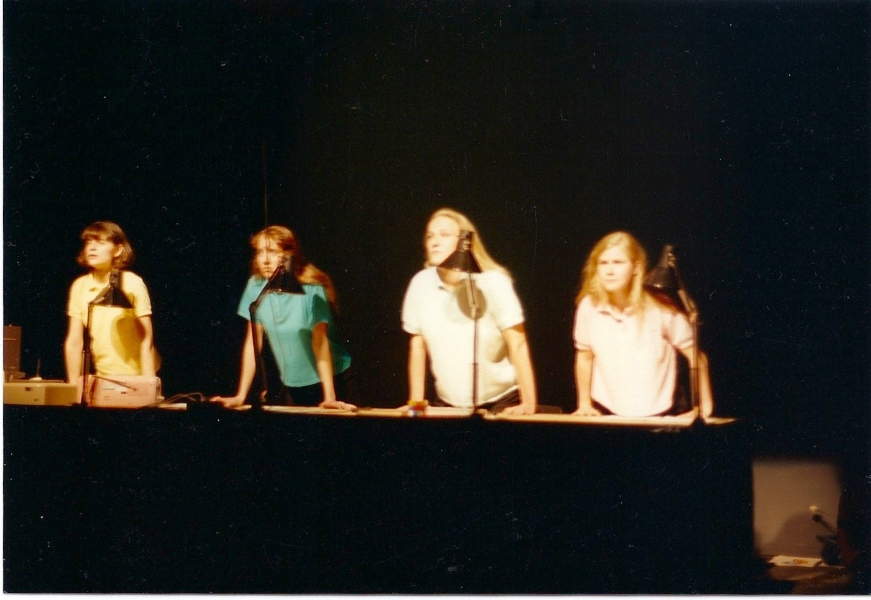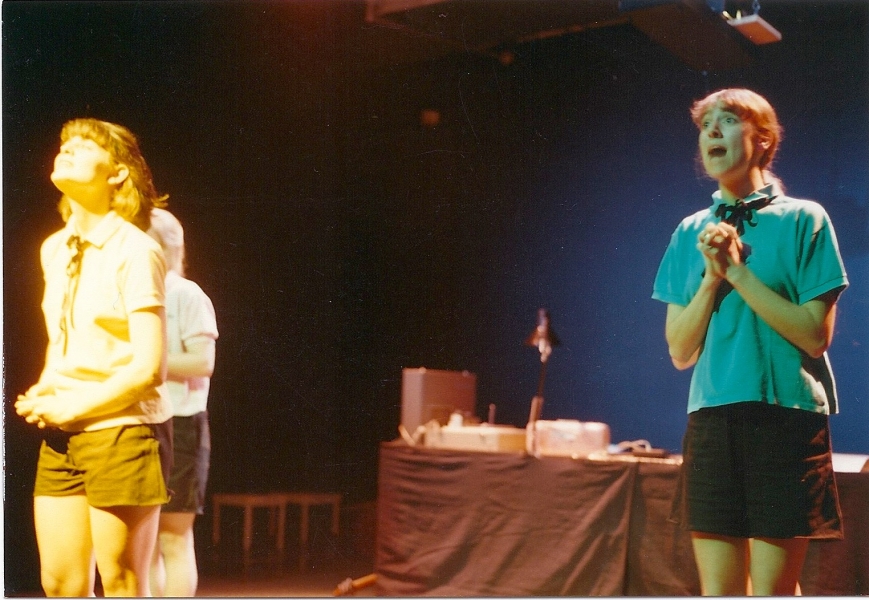In times of a pandemic, going to the theatre becomes a distant memory that slowly fades away. She She Pop are unable to show “Canon” (which premiered at HAU Hebbel am Ufer in November 2019) in front of an audience. Such an uncontrolled means of transmission from an individual body to the euphoric collective of all those present is a highly questionable act at the moment. But they do vow to carry the torch on. In fragmentary accounts, they will conjure up unforgettable stage moments from memory and narrate a canon – evening for evening anew, together with their audience.
To do this, She She Pop are switching to a medium just as transient as theatre, albeit not as public and thankfully less infectious, at least in these times: individual telephone conversations. Phone tree, helpline or hotline: Telephone Canonisn’t a show, it’s a service. Whoever calls up will get one of the cast of “Canon” on the phone and hear about an essential moment in the performing arts. But the canon is also open for your own tales and entries.
Alle Einträge in den “Telefon-Kanon” vom 14.–16.5.2020 am HAU Hebbel am Ufer Berlin
Jérôme Bel, “The Show Must Go On”, Deutsches Schauspielhaus, Hamburg, 2000
Gob Squad, “Gob Squad’s Kitchen”, Spielort unbekannt, Düsseldorf, 2019
Michael Laub/Remote Control, Titel unbekannt, Sommertheater Festival, Hamburg, 1994
Regie unbekannt, Titel unbekannt, Theater Basel, 1982
I can be your translator, “Das Konzept bin ich”, Ballhaus Ost, Berlin, 2019
Fix&Foxy, “A Doll’s House”, Staatsschauspiel Dresden, 2019
Regie unbekannt, “Frühlings Erwachen”, Theater Bremen, 2020
Sasha Waltz, Titel unbekannt (ein eher installativer Abend, in dem auch Charlotte Engelke vorkam),Radialsystem V, Berlin, ca. 2006
Taylor Mac, “A 24-Decade History of Popular Music”, Haus der Berliner Festspiele, Berlin, 2019
Showcase Beat Le Mot, “Burn Cities Burn”, Kampnagel, Hamburg, 2000
She She Pop, “Trust”, Kampnagel, Hamburg, 1998
René Pollesch, “Ich schau dir in die Augen, gesellschaftlicher Verblendungszusammenhang”, Volksbühne am Rosa-Luxemburg-Platz, Berlin, 2010
Hochschule für Musik und Theater (HfMT) Hamburg, Titel unbekannt, Museum für Kunst und Gewerbe, Hamburg, 2018
Meg Stuart, “Projecting [Space[”, Reinbeckhallen, Berlin, 2018
Armin Petras, “Urfaust”, Maxim Gorki Theater, Berlin, 2008
Akram Khan, “Giselle”, Spielort unbekannt, Genf, 2019
Johan Simons, “Hamlet”, Spielort unbekannt, Bochum, 2019
Christoph Werner, “Das Geheimnis des Alten Waldes”, Spielort unbekannt, Halle, 2006 oder 2007
Steffi Weismann, “Blenda Lavabo”, KuLe, Berlin, Anfang der 90er-JahreMarcel Marceau, “Vire-sur-Lot”, Spielort unbekannt, Südfrankreich, Anfang der 80er-Jahre Ann Liv Young, “Cinderella”, HAU Hebbel am Ufer, Berlin, 2011
Johannes Wieland, “Morgendämmerung”, Staatstheater Kassel, 2018
Miss Revolutionary Idol Berserker, “Extreme Voices”, Festival Theaterformen, Braunschweig, 2016
Regie unbekannt, Titel unbekannt, Theater Zerbrochene Fenster, Berlin, 1988
Richard Foreman, “Hotel Fuck”, Schaubühne am Lehniner Platz, Berlin, 1997
René Pollesch, “Heidi Hoh arbeitet hier nicht mehr”, Podewil, Berlin, 2000
Kate McIntosh, “In Many Hands”, Festspielhaus Hellerau, Dresden, 2019
Marcel Broodthaers, “Un Jardin d’Hiver”, Hamburger Bahnhof, Berlin, 2005/2006
American Amateur Opera Group, “Opera Labyrinth”, Salzburg Festival, Salzburg, 2019
Aktör, Titel unbekannt, Schule in Tokalynea, Schweden, 1999
Station House Opera, “Black Works”, ICA, London, 1991
Gob Squad, “Gob Squad’s Kitchen”, Spielort unbekannt, Göteborg, 2008
Keyon Gaskin, “NASHA”, Volksbühne am Rosa-Luxemburg-Platz, Berlin, Jahr unbekannt Muriel Miranda Gacitúa, “La Mala Semilla”, Ort unbekannt, 2002
“La aparición de Jesús en Copacabana” / Die Erscheinung Jesu in Copacabana, (kein Theater-moment, sondern eine Erfahrung), Ort unbekannt, 1998
Christopher Rüping, “Dionysos Stadt”, Ort unbekannt, 2019
Vegard Vinge, “John Gabriel Borkman”, Volksbühne im Prater, Berlin, 2012
Johann Kresnik, “Macbeth”, Städtische Bühne, Heidelberg, 1988
Tino Sehgal, “Constructed Situations”, Fondation Beyeler, Basel, 2017
Ohne Mich Theater, Titel unbekannt, documenta Kassel, 1987
Signa, “The Dorine Chaikin Institute”, Ballhaus Ost, Berlin, 2007
Benoit Sicat, “Le Jardin de Possible”, Theater an der Parkaue, Berlin, 2007
Fanny & Alexander, “Romeo und Julia”, Eurokaz Festival, Zagreb, 1999
A + P Theater, “Commedia dell’Arte”, Festival der AWO Jugend, irgendwo auf dem Land in Niedersachsen, 1985
Marina Abramović, “Biography”, TAT, Frankfurt/Main, 1993
Gob Squad, “I Love You, Goodbye”, HAU Hebbel am Ufer, Berlin, 2020
Constanza Macras/Dorkypark, “No Wonder”, HAU Hebbel am Ufer, Berlin, 2005
Heiner Goebbels, “Stifters Dinge”, Nowy Teatr, Warschau, 2015
Ashley Fure, “The Force of Things”, Summer Courses for New Music, Central Station Art Center, Darmstadt, 2016
Margret Sara Guðjónsdóttir / Angela Schubot, “In the Blind Spot”, Sophiensaele, Berlin, 2014
Olafur Eliasson, “Innen Stadt Außen”, Martin Gropius Bau, Berlin, 2010
Federico León, “The Adolescent”, De Kriekelaar, Kunsten Festival Des Arts, Brüssel, 2003
Mette Ingvartsen, “The Artificial Nature Projekt”, PACT Zollverein, Essen, 2012
Florentina Holzinger, “Tanz”, Sophiensaele, Berlin, 2020 Regie unbekannt, “Frei-Boxen”, Deutsches Theater, Berlin, 2019
Judith Wilske, “DU/Die Stadt”, Hamburg, Jahr unbekannt Jürgen Gosch, “Onkel Wanja”, Deutsches Theater, Berlin, Jahr unbekannt
Frank Castorf, “Baumeister Solness“, Volksbühne am Rosa-Luxemburg-Platz, Berlin, 2017
Franziska Steiof, “So lonely”, Grips Theater, Berlin, 2014
Trixie Munyama, “The Mourning Citizen”, Spielort unbekannt, Namibia, 2017
Gob Squad, “Creation (Pictures for Dorian)”, HAU Hebbel am Ufer, Berlin, 2020
Regie unbekannt, “Os Sertões”, Teatro Oficina, São Paulo, 2010
Christoph Marthaler, “Schutz vor der Zukunft”, Spielzeit Europa, Heilstätten Beelitz, 2006
René Pollesch, “Heidi Hoh arbeitet hier nicht mehr”, Podewil, Berlin, 2000
Boris Charmatz, “enfant”, Haus der Berliner Festspiele, 2012
Duckie’s Table Top Performance Palais, “C’est Vauxhall!”, HAU Hebbel am Ufer, Berlin, 2005
Ruth Gutkowski & Carsten Hentrich, “Grimms Märchen Reloaded”, Spielort unbekannt, Hannover, 2007
Gob Squad, “Super Night Shot”, Spielort unbekannt, Aarhus, 2008
Regie unbekannt, “A Swing Jazz Night on Roller Skates”, Theaterdiscounter, Berlin, 2008
The Natural Theatre Company, “The Police”, Spielort unbekannt, Bath, 1986
Ein Grillabend mit Nature Theatre of Oklahoma, HAU Hebbel am Ufer, Berlin, Jahr unbekannt
She She Pop, “Frühlingsopfer”, HAU Hebbel am Ufer, Berlin, Jahr unbekannt
Mathilde Monnier / La Ribot, “Gustavia”, Haus der Kulturen der Welt, Berlin, 2009
Gob Squad, “Western Society”, Teatro Jorge Eliécer Gaitán, Bogota, 2014
Constanza Macras / Dorkypark, “No Wonder”, HAU Hebbel am Ufer, Berlin, 2005
Ritva Holmberg, “Kallion Kimallus”, Helsinki City Theatre, Helsinki, 1994
Lubricat / Dirk Cieslak, “Einfache Dienstleistung”, Ballhaus Ost, Berlin, 2006
Pina Bausch, “Kontakthof”, Staatstheater Wuppertal, 1990
William Forsythe, “Impressing the Czar”, Ballett Frankfurt/Main, 1989
Charleroi Danses (Michèle Anne de Mey & Jaco van Dormaen), “Kiss & Cry”, Festival “Colours”,Stuttgart, 2015
Forced Entertainment, “And on the Thousandth Night”, Festspielhaus Hellerau, Dresden, 2019
ongoing project, “Feuerland”, Probebühne Gießen, 2010
Nicolas Charaux, “Der (vor)letzte Panda oder Die Statik”, Burgtheater Wien, 2020
Vegard Vinge, “John Gabriel Borkman”, Volksbühne im Prater, Berlin, 2012
Zirkus, Wenduine (Belgien), 1968 Johann Kresnik, “Woyzeck”, Städtische Bühne, Heidelberg, 1987
Forced Entertainment, “Bloody Mess”, Festival Theaterformen, Schauspiel Hannover, Jahr unbekannt Satoko Ichihara / Q, “Favonia’s Fruitless Fable / The Question of Fairies“, Kyoto Art Center, Kyoto, 2018
Susanne Kennedy, “Die Selbstmordschwestern”, Volksbühne am Rosa-Luxemburg-Platz, Berlin, 2018
Wim Vandekeybus, “Puur”, Kunglinga Operan, Stockholm, 2018
Jérôme Bel, “Gala”, HAU Hebbel am Ufer, Berlin, 2015
Gaëlle Bourges, “À mon seul désir”, Festival d’Avignon, 2015
Regie unbekannt, Titel unbekannt, documenta, Athen, 2017
Uniater, “#netzwerke”, Festival Fitut, Tanger, 2015
Peter Stein, “Peer Gynt”, Schaubühne, Berlin, 1972
Christoph Schlingensief, “100 Jahre CDU”, Volksbühne am Rosa-Luxemburg-Platz, Berlin, 1993
Rimini Protokoll, “Nachlass – Pièces sans personnes”, Martin Gropius Bau, Berlin, 2017
Kompanie Kopergietery, “Die Königin ist verschwunden”, Theater Stuttgart, 2018
Falk Richter, “Fear”, Schaubühne, Berlin, 2016
Lagartijas Tiradas al Sol, “Tijuana”, International Dance and Theater Festival, Montreal, 2018
Magic Theatre Company, “Buried Child”, Magic Theatre, San Francisco, 2013
Patricio Estrella, “El Quijote”, Teatro Espada de Madera, Ecuador, ca. 1995
René Pollesch, “Kill your Darlings!”, Volksbühne am Rosa-Luxemburg-Platz, Berlin, ca. 2014
Boris Nikitin, “Versuch über das Sterben”, Kaserne Basel, 2019
João Gilberto, Konzert, Carnegie Hall, New York, ca. 1999
Jun Tsutsui, “Shakagaike – Der Buddha-Teich”, FFT, Düsseldorf, 2019
Ligna, “Rausch und Zorn”, Kampnagel, Hamburg, 2019
Jan Fabre, “The Sound of One Hand Clapping”, Schauspiel Frankfurt/Main, ca. 1989
Elisabeth Gabriel, “Dunkel lockende Welt”, Landestheater Innsbruck, 2008
Regie unbekannt, “Maria Stuart”, Burgtheater Wien, 2008
Wajdi Mouaqad, “Incendies”, Spielort unbekannt, Avignon, 2005
She She Pop, “Testament”, HAU Hebbel am Ufer, Berlin, 2008
Einar Schleef, “Salome”, Schillertheater, Berlin, 1998
Zelal Yesilyurt, “Lolita will nicht sterben”, P14, Volksbühne am Rosa-Luxemburg-Platz, Berlin, 2018
Showcase Beat Le Mot, “Radar Radar nichts ist egal”, Kampnagel, Hamburg, 1998
Regie unbekannt, “Unendlicher Spaß”, HAU Hebbel am Ufer, Berlin, 2012
Cirque de Barbarie, Titel unbekannt, Spielort unbekannt, Stuttgart, 1991
La Fura dels Baus, Titel unbekannt, Spielort unbekannt, Barcelona, 1997
Jochen Roller, “Art Gigolo”, Podewil, Berlin, 2002 She She Pop, “Besessen”, Sirenos Festival, Vilnius, 2018
Jan Fabre, “Universal Copyrights”, Hebbeltheater, Berlin, 1996
Frank Castorf, “Schmutzige Hände”, Volksbühne am Rosa-Luxemburg-Platz, Berlin, 1998
Stuffed Puppet Theatre, “Schicklgruber”, HAU Hebbel am Ufer, Berlin, 2004
Regie unbekannt, Titel unbekannt, HAU Hebbel am Ufer, Berlin, 2010
Peter Brook, “The Tempest”, Spielort unbekannt, Frankfurt/Main, 1991
Ariane Mnouchkine, “Les Atrides”, Cartoucherie, Paris, 1991
Janet Cardiff & George Bures Miller, “Ghost Machine”, HAU Hebbel am Ufer, Berlin, 2005
Rimini Protokoll, “Situation Rooms”, HAU Hebbel am Ufer, Berlin, 2019
Hofesh Shechter, “Clowns” (Film), Tanzrauschen, Wuppertal, 2019
Peaches, “Peaches Christ Superstar”, HAU Hebbel am Ufer, Berlin, 2010
Nina Hahn, “Heimat (Wenn du nicht weißt, woher du kommst, woher willst du dann wissen, wohin du gehst?)”, Schultheater-Aufführung mit geflüchteten Kindern, Heinrich-von-Brentano-Schule, Hochheim, 2016
Leander Haußmann, “Der gute Mensch von Sezuan”, Berliner Ensemble, 2015
Gob Squad, “War and Peace”, Volksbühne am Rosa-Luxemburg-Platz, Berlin, 2018
Gob Squad, “Revolution Now!”, Volksbühne am Rosa-Luxemburg-Platz, Berlin, 2014
Carsten Höller, “The Baudouin Experiment”, Kunstenfestival, Brüssel, Jahr unbekannt Kristian Smeds, “The Seagull”, Von Kraahl Theater, Helsinki, 2010 Kristian Smeds, “Tabu”, Spielort unbekannt, Helsinki, 2017
Alfred Kirchner, “Faust”, Schiller Theater Berlin, 1993
L’Amicale de production, “On traversera le pont une fois rendus à la rivière”, Künstlerhaus Mousonturm, Frankfurt/Main, 2017
Jürgen Kruse, “Tryin’ Othello”, Deutsches Theater, Berlin, 2003
Christoph Schlingensief, “Die erste sozialistische Butterfahrt der MS Clara Zetkin”, Volksbühne im Prater, Berlin, 1995
Pina Bausch, “Nelken”, Spielort unbekannt, Düsseldorf, 2000
Yeguas del Apocalipsis, “La Conquista de América”, Comisión Chilena de Derechos Humanos, 1989
Ein Moment, Berlin, Oktober 1989 Manuela Infante, “Cristo”, Teatro de Chile, Matucana, 2008
Ulrich Rasche, “Die Bakchen”, Burgtheater Wien, 2019
Gob Squad, “Before Your Very Eyes”, HAU Hebbel am Ufer, Berlin, 2011
Toshiki Okada, “Super Premium Soft Double Vanilla Rich”, Theater der Welt, Mannheim, 2014
Maura Morales, “Exceso de la Nada”, Schwankhalle, Bremen, 2019
Regie unbekannt, “Lysistrata”, Schauspielhaus Bochum, Ende der 80er-Jahre Lloyd Newson / DV 8, “The Cost of Living”, PACT Zollverein, Essen, 2003
Tamer Yiğit, “Serenade”, HAU Hebbel am Ufer, Berlin, 2019
Romeo Castellucci, “Hyperion”, Schaubühne, Berlin, 2015
Rimini Protokoll, “Cargo-Sofia”, HAU Hebbel am Ufer, Berlin, 2006
Fakir Bone, “Intense Body Cabaret”, Angel Pub, Nottingham, ca.1997
Der 11. September im Fernsehen, Podewil, Berlin, 2001
Station House Opera, “Dedesnn nn rrrrrr”, Theater der Welt, Frauenkirche, Dresden, 1996
Franko B, “Aktion 398”, Toynbee Studios, London, 2001
Stephan Kimmig, “Ismene, Schwester von”, Deutsches Theater, Berlin, 2016
Sebastian Mauksch, “Die merkwürdigen Abenteuer der Knaben Edudant und Franzimor”, P14, Volksbühne am-Rosa-Luxemburg-Platz, Berlin, 2007
Philip Glass, “In the Summer House”, Lincoln Center, New York, 1993
Susanne Kennedy, “Women in Trouble”, Volksbühne am-Rosa-Luxemburg-Platz, Berlin, 2018
Regie unbekannt, Titel unbekannt, Mousonturm, Frankfurt/Main, 1996
Rocío Molina, “Caída del Cielo”, Tanzhaus NRW, Düsseldorf, 20919
Alle Einträge in den “Telefon-Kanon” vom 04.06.2020 beim Impulse Festival
„The Real Fiction“, Cuqui Jerez, Theater Festival Impulse, Bochum, 2007
„In My Room“, Shibui Kollektiv, 6-Tage-Festival Stuttgart, 2019
„Sorry“, Monster Truck, Impulse Theater Festival, Köln, 2017
„Der Räuber Hotzenplotz“, Showcase Beat Le Mot, Theater an der Parkaue, Berlin, 2007
„Die glücklose Landung“, Heiner Goebbels, Marstalltheater München, 1994
„Disabled Theatre“, Jerome Bel und Theatre Hora, Ringlokschuppen, Mülheim an der Ruhr, 2013
„Shooting Bourbaki“, Rimini Protokoll, Sophiensaele Berlin, 2002
„Besessen“, She She Pop, Impulse Theater Festival Köln, 2017
„Nachlass“, Rimini Protokoll, Martin Gropius Bau, Berlin, 2017
„Das Schicksal ist ein mieser Verräter“ (Film), Josh Boone, 2014
„Testament“, She She Pop, Kunstfest Weimar, 2015
„Textband spielt: Die unsichtbaren Städte von Italo Calvino“, Utopien Werkstatt Stuttgart, 2011
„CONSUMPTION AS A CAUSE OF COMING INTO BEING“, Roland Rauschmeier mit Alex Bailey, Impulse Theater Festival, Ringlokschuppen, Mülheim an der Ruhr, 2018
„Out in Africa / Tief in Afrika“, Mpumelelo Paul Grootboom, Steve Karier, Kunstfest Weimar, 2019
„On the concept of the face regarding the son of god“, Romeo Castellucci, Essen Ruhrtriennale „Live Tonight“, Monster Truck, Theater Festival Impulse, 2007
„Palermo, Palermo“, Pina Bausch, Wuppertal, 1989
„Spitze“, Doris Uhlich, Theater Festival Impulse, 2009
„Evolution“, William Forsythe, Hellerau, Dresden, ca. 2005
„Mausoleum Buffo“, Andcompany & Co. , Theater Festival Impulse, 2007
„Was Wo (Beckett)“, Öhnsörg Theater, Oldenburg, 1995
„Gespenster (nach Ibsen)“, Marcus & Marcus, Impulse Theater Festival, 2015
„99%“, Christoph Stec, Jan-Marco Schmitz vom Spina, Theater Junges Ensemble Solingen, Paderborn, 2013
„John Gabriel Borkmann“, Vegard Vinge, Volksbühne Prater, 2012
„Rusalka“, Stefan Herheim, Théâtre de La Monnaie, Brüssel, 2012
„Das Ende des Armenhauses“, Andrej Woron, Teatr Kreatur, Berlin, 2012
„Fight Club“, God’s Entertainement, Theater Festival Impulse, 2007
„Macbeth“, Johann Kresnik, Städtische Bühne Heidelberg, 1988
„Tanz“, Florentina Holzinger , Sophiensaele, Berlin, 2020
„die Kontorsionistin“, Unbekannt, Zirkus, Wenduine (Belgien), 1968
„Woyzeck“, Johann Kresnik, Städtische Bühne, Heidelberg, 1987
„Die erste sozialistische Butterfahrt der MS Clara Zetkin“, Christoph Schlingensief, Volksbühne im Prater, Berlin, 1995
„La mélancolie des dragons“, Philippe Quesne/ VivariumStudio, Festival d’Avignon im Cloître des Célestins, Avignon, 2008
„Sorry“, Monster Truck und Segun Adefila“, FFT, Düsseldorf, 2016
„Drommen“, De Utvalgte, Theaterformen, Hannover, 2011
„Rauw“, Kabinett K, Kindertheaterfestival, Stuttgart, 2015
„Hypnotiseur aus Italien“, Unbekannt, Wandertheaterfestival, Radebeul, 2005
„Hamlet“, Boris Nikitin, Impulse Festival, Köln, 2017
Alle Einträg in den “Telefon-Kanon” vom 06.06.2020 beim Hangö Teaterträff
Seiji Shimoda New Performance, Kutomo, Turku, 2016
Jérôme Bel The Show Must Go On, Deutsches Schauspielhaus, Hampuri, 2001
FDUV Östra nylands teatergrupp, regi Kim Gustafsson PeterPan, Borgå Folkakademi Praktikums festsal, 2016
Emilia Kokko Genderfuck, 2016
Markus Öhrn Domestic Violence, Impulse Festival, 2019
Kate McIntosh In many hands, Baltic circle, Helsinki, 2019
Vegard Vinge John Gabriel Borkman, Volksbuhne, Berlin, 2012
She She Pop Testament, Helsinki (Festival at tram depot?), 2011
Alvis Hermanis The Long Life, Entre Scenen, 2006
Oblivia Entertainment Island 2, Kiasma, 2009
Salla Hakanpää Pinta, Cirko, Helsinki, 2013
tai 14 Alvis Hermanis Kaspar Hauser, Berlin, 2014
artist unknown title unknown, Sophiensaele, Berlin, 2017
artist unknown Blackbox effect, Uniarts, TeaK, 2017 or 2018
Lundahl & Seitl Symphony of a missing room, Göteborg konsthall, 2010
Esa Leskinen Equus, Kansallisteatteri, Helsinki, 1996
artist unknown El viento entre los álamos, Montevideo, Uruguay, 2008
Esa Kirkkopelto Ruusuruoska, Takomo Helsinki, 2019
Studentteatern Wuthering heights, Helsingfors, 2019
Signa Club Inferno Volksbühne, Berlin, 2013
Joakim Groth Vi är bara människor, Svenska Teatern, Helsingfors, 2019
Akademiska damkören Lyran Låt mig vara, Telakka, 2016
Ryhmäteatteri Eduskunta 2, Esbo teater ÖFA kollektiv & Blaue Frau Harlekin, Mad House,Helsingfors, 2020
en sibirisk grupp/Bertolt Brecht Den goda människan i Sezuan, Helsingfors festspel, nån gång på 1990-talet
artist unknown Glitter, nånstans i Berlin Anna-Mari Karvonen & Blaue Frau Wall to Wall, ett gallerirum i Helsingfors, 2012
artist unknown title unknown Hangö teaterträff för länge sen, föreställningen spelades i ett gammalt tullhus European Theater Collective Finnphone Emigrantica, STOA, Helsingfors, 2014
Pippo Bono Silencio, Bologna, 2004
She She Pop Trust, Kampnagel, Hamburg, 1998
(Students) Weimar – Jakten på zodiaken, Teaterhögskolan, Helsinki, 2018
HGichT title unknown, Düsseldorf, 2011
Dries Vanhoeven Guilty Landscapes, Santarcangelo Festival, 2019
Iggy Malmborg Boner, Baltic Circle Festival, 2014
Katariina Numminen & co Zoo, Helsinki, 2014
Sommarteater på Krapperup Stormen, Skåne, Sweden, 2012
artist unknown Beltane ritual, Edinburgh, 2008
Taylor Mac A 24-Decade History of Popular Music, Haus der Berliner Festspiele, Berlin, 2019
Showcase Beat le Mot Burn Cities Burn, Kampnagel, Hamburg, 2000
artist unknown Mounted Milk, POP UP ART HOUSE, Diana-scenen, Helsingfors, 2013
Raatikko Orient Express, Järvenpäätalo, 1987
Katona József Theater Three sisters, Kansallisteatteri, 1985
Teater Mars Måsen, 1989
Mónica Calle Ensaio para uma Cartografia, Ruhrtriennale, 2019
Teater Mars Apollon i fähuset, Tullhuset, Hangö teaterträff, 2013?
Einar Schleef Salome, Schillertheater, Berlin, 1998
Sarah Vanhee Oblivion, Kunstenfestival, Brussels, 2016
Stan Saanila Bländad, Svenska Teatern, Helsingfors, 2016
Kaaos company, Mustonen, Erno Aaltonen Pond, Madhouse Helsinki, 2017
I can be your Translator, Das Projekt bin ich (The project, that’s me), Sophiensaele, Berlin, 2019
Michael Laub/Remote Control title unknown, Hamburg, 1994
Katariina Numminen Karjalala, STAGE Festival, Helsinki, 2008
Ann Liv Young Cinderella, HAU3 Berlin, 2011
René Pollesch Heidi Hoh arbeitet hier nicht mehr, Podewil, Berlin, 2001
Minna Harjuniemi Deus ex machina, Ylioppilasteatteri, Helsinki, 2003
Complicite, reg. Simon McBurney Mnemonic, Helsingin juhlaviikot, Kansallisteatteri, 2002
Teatteri 1990, reg. Jari Halonen, Kullervo, kontti perunatorilla, 1991
Jorma Uotinen JoJo Espan lava, Helsinki, 1979
Needcompany Caligula – No Beauty for Me There Where Human Life is Rare, Kiasma teatern, Helsingfors, 1999
Gisèle Vienne This is How You will Disappear, Festival an der Werf, Utrecht, 2011
Gnabcollective Hamlet private, Madhouse, 2014
Mammallian Dive Reflex All the sex I’ve ever had, Baltic Circle, 2018
artist unknown Matadoro, Sesc, Tanzbiennale Sao Paolo, Brasil, 2013
Christoph Schlingensief title unknown, Volksbühne am Rosa Luxemburg-Platz, Berlin, 1998
artist unknown Garden Of Chicks, Impulse Festival Düsseldorf, Germany, 2019
Alle Einträge in den “Telefon-Kanon” vom 14.06.2020 beim Impulse Festival
Jerk“, Regie: Giselle Vienne, Performance: Jonathan Capdevielle, Impulstanz, 2009
„Breakfast at Tiffany’s“, Regie: Jan Langenheim, Köln, 2017
„25.3km“, Li Jian Jun, Peking, 2014
„Police“, The Natural Theatre Company, Bath, 1986
„Der perfekte Tag“, René Pollesch, Mülheim a.d. Ruhr, Impulse Festival, 2011
„Die Reichsgründer oder der Schmürz“, ?, in einem Kellertheater in Hamburg, 1962
„Fight Club“, God’s Entertainment, Impulse Festival, 2007?
„Alles“, Showcase Beat Le Mot, Ringlockschupen, Mülheim, Impulse Festival, 2013
„K.“, Phillip Preuss, Zoom Performance, Leipzig, 2020
„Cinderella“, Ann Liv Young, HAU3, 2011
„Volksfeind“, Ulrich Greb, Schloßtheater Moers, 2012
„Heidi Hoh arbeitet hier nicht mehr“, René Pollesch, Podewil, 2002
„La mélancholie des dragons“, Phillippe Quesne, Spielartfestival München 2013 (?)
„Die Reichsgründer oder das Schmürz“, Kellertheater Hamburg, 1963
„Räuber Hotzenplotz“, Showcase Beat Le Mot, Theater an der Parkaue, Berlin, 2007
„Orgie“ (?), Jan Fabre, Spielartfestival München 2015
„(Titel?)“, (von?), Kampnagel Hamburg, Februar 2020
(ein Stück über Schostakowitsch im Stuhlkreis mit riesiger Mutter-Puppe), ?, Festival Divadelna, Nitra (Slovakei), ca. 2010
„Pickman’s Model“, ?, Kneipe ‘Oslo’ in Brühl bei Köln, 2010
„A 24-Decade History of Popular Music“, Taylor Mac, Haus der Berliner Festspiele, 2019
„Burn Cities Burn“, Showcase beat le mot, Kampnagel, Hamburg, 2000
„Variations on Closer“, Margret Sara Gudjondottir, Festival Reykjavik, ca. 2013
„Live Tonight“, Monster Truck, Impulse Festival, 2007 (?)
„Der Spalt“, (Regie unbekannt), Schauspiel Essen, 2018
„Mausoleum Buffo“, Andcompany & Co., Impulse Festival, 2009
„Romeo and Juliet“, (Regie unbekannt), The Globe Theatre, London, 2017
Alle Einträge in den “Telefon-Kanon” vom 26. und 27.09.2020 beim Grenzenlos Kultur Festival
“Penthesilea”, Kristo Sagor, Alte Feuerwache, Saarbrücken, 2015
“Back to back”, Theater Australian Food Court, Hebbel am Ufer, Berlin, 2011
“Na Paknech, Dlazbe I Trave, (on boards, pavement and grass)”, Straßenfestival (mit Akrobaten), Brno, 2019
“{Titel vergessen}” Michael Laub/Remote Control, Sommertheater Festival auf Kampnagel, Hamburg, 1994 oder 1995
“Oh My“, Henrike Iglesias, Performing Arts Festival in den Sophiensaelen, Berlin, 2019
“Baumeister Solneß”, Volksbühne am Rosa Luxemburg Platz, Berlin, 2018
xxx, xxx, Theaterspektakel, Zürich, 1985
„Testament”, She She Pop, Grenzenlos Kultur Festival, Mainz, 2010
“Cinderella”, Ann Liv Young, HAU Hebbel am Ufer, Berlin, 2011
“The Show Must go on”, Jérôme Bel, Deutsches Schauspielhaus Hamburg, 2000
„Medea“, Thalheimer, Schauspiel, Frankfurt/Main, ca. 2017
„Das Konzept bin ich“, I can be your Translator, Dortmund, 2018
“Frühlings Erwachen”-Bearbeitung, She She Pop, Impulse Festival, Düsseldorf, 2016
„The Money“, Kaleider, Town Hall, Hull (England), 2019
„Das Schicksal ist ein mieser Verräter“, xxx, Schauspielhaus Hamburg, 2018
Ein Stück von Shakespeare, Peter Zadek, Deutsches Schauspielhaus, Hamburg, späte 1970er
„The Fishing Dance & Other Cosmic Confessions“, Sindri Runudde, No Limits Festival, Berlin, 2019
“Heidi Hoh 2”, René Pollesch, Podewil Berlin, 2002
“Uncanny Valley”, Thomas Melle, Mousonturm FF/M, 2019
“Cinderella”, Ann Liv Young, HAU3 Berlin, 2011
“Palermo, Palermo”, Pina Bausch, Staatstheater Wuppertal, ca. 2001
“Kampf um die Liebe, Meine Damen und Herren”, Kampnagel Hamburg, 2020
“The Dorine Chaikin Institute”, SIGNA, Ballhaus Ost, 2007
“Stimmen im Kopf”, ?, Neuköllner Oper Berlin, ca. 2015 ?
Christoph Schlingensief, Volksbühne am Rosa Luxemburg-Platz Berlin, Mitter der 90er Jahre
“Mea Culpa”, Christoph Schlingensief, Schauspielhaus Hamburg, 2010?
“The Adolescent”, Federico Leon frei nach Dostoyevsky, De Kriekelaar – Kunsten Festival des Arts, Brussels, 2003
“Un hombre que se ahoga”, frei nach “Drei Schwestern”, von Chekov, El Camarin de las Musas, Buenos Aires, 2004
“So lonely”, Franziska Steiof, GRIPS Theater, Berlin, 2014
“Em Karle sei Dande”, Jürgen Hörner, Badisch Bühn, Karlsruhe, 2013
“Pictures of Dorian”, Gob Squad, HAU 2, Berlin, 2020
“Deine Helden, meine Träume (Klassenzimmerstück)”, Karen Köhler, Schauspielhaus Hamburg, Gymnasium Doerpsweg, Hamburg, 2019
xxx von Botho Strauß, xxx, Schaubühne, Berlin, 1985
“La mala semilla” , Muriel Miranda, Teatro el trolley, Santiago de Chile, 2002
“L’Illusion comique (von Corneille)”, Giorgio Strehler, Théâtre national de l’Odéon, Paris, 1984
“Maison mère”, Phia Ménard, Théâtre national de Bretagne (Rennes Frankreich), 2018
?, Lucinda Childs, Berlin (in einem Museum), 70er oder 80er
“John gabriel Borkmann”, Vegard Vinge, Prater Berlin, 2012
“Macbeth”, Johann Kresnik, Heidelberg, 1988
“Das Ende des Armenhauses”, Andrej Woron, TeatrKreatur, 1992
“Die erste sozialistische Butterfahrt der MS Clara Zetkin”, Christoph Schlingensief, Prater Berlin, 1995
Alle Einträg in den “Telefon-Kanon” vom 05.-07.11. 2020 am Theater Rampe, Stuttgart
ed Bayerlein, „die Publikumsbeschimpfung“, Germinal Stager, Denver, USA, 2013
Monster Truck, „who’s there reloaded“, Theater Rampe, Stuttgart, 2016
Oblivia, „Nature Theater of Olivia“, Theater Rampe, Stuttgart, 2017
Reinhardt Gröber, „Weißer Raum“, Theater Vorpommern, Greifswald, 2019
„Made in Germany“, Stuttgart, 2015
„das jähr des magischen Denkens“, Studiotheater, stuttgart, 2016
Rimini Protokoll, “Nachlass”, Martin Gropius Bau, Berlin, 2017
Piel de lava, “Petróleo”, Santiago a mil festival, Santiago de Chile Muriel Miranda, “La mala Semila”, Teatro del vacío (Trolley), Santiago de Chile, 2002
Nicolás Lange, “Las Octavas de Simone”, Teatro del Puente, Santiago de Chile, 2017
Marina Abramovic, “The artist ist present”, MoMA, New York, 2010
Las yeguas del Apocalipsis (Pedro Lemebel y Francisco casas), „La conquista de América“, Comisión Chilena de derechos humanos, Santiago de Chile, 1989
Marina Abramovic, “512 Hours”, Serpentine gallery, London, 2014
A.S.A.B., “Maravilla Star”, Bogotá, Kolumbien, 2001
Susann Maria Hempel und Cássio Diniz Santiago, “S.C.H.U.U.L.E.”, Wagenhalle, Stuttgart, 2019
Das Helmi & Cora Frost, “Matrix”, Auawirleben/ Schlagthaus Theater Bern, Bern Gob Squad , “Before your very eyes”, Hau Berlin, 2011
Jerome Bel, “The Show Must Go On”, Schauspielhaus, Hamburg, 2000
Michael Laub/Remote Control, (Titel vergessen), Sommertheater Festival, Hamburg, 1995
I can be your Translator, “Das Konzept bin ich”, Sophiensaele, Berlin, 2018
Christoph Marthaler, “Faust Wurzel aus 1+2”, Festwochen, Wien, 1993
Robert Bergmann, “Onkel Wanja”, kleines Haus, Schauspiel Stuttgart, 2013
Milo Rau, “Familie (o.ä.)”, xx, Frankfurt am Main, 2020 Philip Becker, “Die Schutzsuchenden”, Mössingen, 2010
Regie unbekannt, Titel vergessen (Schlafen in der letzten Reihe), Sparte 4, Saarbrücken, 2015-2017
Ersan Mondtag, Titel vergessen, im Café neben der Spielstättel vom Schauspiel Köln in Mülheim vor der Vorstellung, ca. 2019
Regie ungekannt, “Peter Pan”, Schauspiel Stuttgart, Anfang der 90er
Commedia Köln (Katharina Fillers) , „Tigermilch“, Festival Made in Germany, Stuttgart, 2014
René Pollesch, “Heidi Hoh arbeitet hier nicht mehr”, Podewil Berlin, 2001
Ann Liv Young, „Cinderella“, HAU 3 Berlin, 2011
Oliver Zahn, „Situation mit Doppelgänger“, Theaterformen Braunschweig, 2015
Richard Foreman, „Hotel Fuck“, Schaubühne Berlin, 1996 (?)
„Maria Stuart“, Nationaltheater Mannheim, 2019 (?)
„Evolution“, Nationaltheater Mannheim, 2019
Christoph Schlingensief, („?“), Volksbühne am Rosa Luxemburgplatz, Mitte der 90er Jahre
Peer Mia Rittberger, „Wie ein zarter Schillerfalter“, Zimmertheater Tübingen, 2020
White On White, „Non-Controversial Shit In a Box“, gesehen auf Video, 2010 (?),
„Am Königsweg“, Stadttheater Heidelberg, ca. 2017
Cirque de Barbarie, („?“), Stuttgart, 1991
Taylor Mac, “A 24-Decade Kistory of Popular Music”, Haus der Berliner Festspiele, Berlin, 2019
Tiago Rodrigues, “The Beauty of Killing a Fascist”, Théâtre Vidy, Lausanne, 2020
Showcase Beat le Mot, “Burn Cities Burn”, Kampnagel / Kino Alabama, Hamburg, 2000
Rene Pollesch, ein Titel mit ‘Revolver’ oder ‘Pistole’, Schauspiel Stuttgart / Nord, Stuttgart, 2015
Signa: „The Dorine Chaikine Institute“, Ballhaus Ost, Berlin 2007
Felicia Zeller / Sybille Berg?: „Mein großer Bruder…“, Theater Rampe, 2016 oder 2017
Anais D. Mauptit und Rafael Ossami Saidy?: Intervention im Stadtraum „Beton.Gemütlichkeit“ o.a. , Festival „Die irritierte Stadt“, Stuttgart 2020
Pina Bausch: „Kontakthof“, Staatstheater Wuppertal, 1989
Klaus Gmeiner: „Der Nussknacker“, Salzburger Marionettentheater an der Komischen Oper Berlin?, Berlin in den 80er Jahren
Marina Abramovic:“Biography“, Theater am Turm, Frankfurt/M, 1993
Citizen.KANE: „Achtzehn Einhundertneun – Lichtenhagen“, private WG in Stuttgart, 2012
Fanny & Alexander: „Romeo und Julia“, Eurokaz Festival, Zagreb 1999
Claus Peymann: „Antonius und Cleopatra“, Theater an der Wien bei den „Wiener Festwochen“ in den frühen 90ern
Andreas Liedmann, “Schulden, die ersten 5000 Jahre”, Schauspiel Stuttgart, Stuttgart, 2014
Alain Platel, “Tauberbach”, Schauspiel Stuttgart, Stuttgart, 2015
Prinzip Gonzo, “Momo”, Theater Konstanz Spiegelhalle, Konstanz, 2016
Waljanzin Jelisareu, “Spartakus”, Opernhaus Minsk, Minsk, Weißrussland, 2003
Armin Petras, “Der Sturm”, Schauspiel Stuttgart, Stuttgart, 2016
René Pollesch, “Glauben an die Möglichkeit der völligen Erneuerung der Welt”, Friedrichstadt-Palast, Berlin, 2019 Johann Kresnik, “Macbeth”, Städtische Bühne Heidelberg, Heidelberg, 1988 Giselle Vienne, “Jerk”, Heusteigtheater, Stuttgart, 2010 ?,
“Medea”, Burgtheater, Wien, 2010
Joke Laureyns & Kwint Manshoven von Kabinet K, “Raw”, Sophiensaele, Berlin, 2015
Viktor Bodos, “Der Würgeengel”, Schauspiel Stuttgart, Stuttgart, 2020
Kjell Moberg , Nie Theater, “Museum of memories”, Theater im Pfalzbau, Ludwigshafen, 2018
Benjamin Verdonck, “Kurzstücke/ Waldeinsamkeit”, Kasseturm Kunstfest, Weimar, 2019
Vegard Vinge, “John Gabriel Borkmann”, Prater (Volksbühne), Berlin, 2012
Andrej Woron, “Das Ende des Armenhauses”, Teatr Kreatur, Berlin, 1992
Christoph Schlingensief, “Die 1. sozialistische Butterfahrt der M/S Clara Zetkin”, Prater Garten (Volksbühne), Berlin, 1995
Alvin Ailey, Merce Cuningham Dance Company, “events”, Cour d’honneur du Palais des Papes (festival d’Avignon), Avignon, 1977
Alle Einträg in den “Telefon-Kanon” vom 16.-18.12. 2020 am FFT Düsseldorf
Stemann, “Faust 1&2”, Kammerspiele, München, 2011
I can be your Translator, “Das Konzept bin ich”, Ballhaus Ost, 2018
She She Pop, “Testament”, Hau2, Berlin, 2010
Michael Laub/Remote Control, (Titel vergessen), Sommertheater Festival Kampnagel, Hamburg, 1994
Jerôme Bel, “The Show Must Go on”, Deutsches Schauspielhaus, Hamburg, 2000
Vegart Vinge, “John Gabriel Borgmann”, Prater (Volksbühne), Berlin, 2015
Harald Hemprich, “Tom Sawyer & Huckleberry Finn”, Ludwig Wilhelm-Gymnasium Rastatt, 1993
She She Pop, “Titel unbekannt (mit Vätern)”, FFT, Düsseldorf, 2015
I can be your Translator, “Das Konzept bin ich”, Ort unbekannt, Dortmund, 2018
Michael Laub / Remote Control, (Titel vergessen), Sommerthater Festival, Kampnagel, Hamburg 1994
Yale Sevis, “Mein Körper macht das mit mir”, online, 2020 {eine off-theater-gruppe}, {genet-stück, das im knast spielt}, {ein frei stehendes haus}, Wien, 1984 Ron Vawter, “Roy Cohn / Jack Smith”, Hebbel Theater Berlin, 1990
(Künstler vergessen), “Mikado Remix”, Campo Gent, 2019
Alle Einträg in den “Telefon-Kanon” vom 29.-30.04 und 01.05. 2021 in Kampnagel Hamburg
René Pollesch, “Heidi Hoh arbeitet hier nicht mehr”, Podewil, 2002 ?,
“Naturspektakel”, außerhalb von Hamburg, 2021
Ann Liv Young,”Cinderella”, HAU3 Berlin 2011
She She Pop, “Warum tanzt ihr nicht?”, Kampnagel, Hamburg, 2004
Kabinet k., “Rau”; Theater YES, Stuttgart, 2014
Showcase Beat le Mot, “Burn, Cities, Burn”, Kampnagel Hamburg, 1999
Stefan Pucher, “Quijote. Trip zwischen Welten”, Thalia Theater Hamburg, 2012
Shinson hapkido, “Aufführung”, Hamburg, 2015
Muriel Miranda, “La mala Semila”, Teatro del vacío (Trolley), Santiago, 2002
Rimini Protokoll, “Nachlass”, Martin Gropius Bau, Berlin, 2017
Camus, “Die Pest” (als 1 Personen-Stück), ein Theater in Berlin, 2020
Taylor Mac, “A 24-Decade History of Popular Music”, Haus der Berliner Festspiele, 2019
Michael Laub, “Remote Control”, Sommertheater Festival/Kampnagel, Hamburg, 1994
François Michel Pesenti, “Nichts in white satin”, Concordia Bremen, 1993
Unbekannt, “die Kontorsionistin”, Zirkus in Wenduine Belgien, 1968
Florentina Holzinger, “Tanz “, Sophiensälen Berlin, 2020
Unbekannt, “Die Giraffen”, Kleines Fest im großen Garten Hanover, 2018
Enrique Gasa Valga, “Frida Kahlo”, Tiroler Landestheater Innsbruck Österreich, 2019
Theater Rites, “Paradise”, die Kokerei-Zollverein/Ruhrtriennale Essen, 2010
Willy Mertens, “Unbekannt”, Thalia Theater Hamburg, 1957
Jérôme Savary, “Weihnachten an der Front”, Kampnagel Hamburg, 1982
Hans-Peter Lehmann, “Frau ohne Schatten”, Opernhaus Hanover, 1992
Christoph Schlingensief, “Die erste sozialistische Butterfahrt der MS Clara Zetkin”, Prater Spektakel der Volksbühne Berlin, 1995
Johan Kresnik, “Woyzeck”, Städtische Bühne Heidelberg, 1988 ?,
“Faust”, (Goethe), Stadttheater Remscheid, 2014
Signa, „The Dorine Chaikin Institute“, Ballhaus Ost, Berlin, 2007
Fanny & Alexander, „Romeo und Julia“ (1. Akt), Europas Festival, Zagreb, 1999
Franz Erhard Walther, “Teile aus 1. Werksatz”, Thalia Theater und Kunsthalle Hamburg, 2013
Rimini Protokoll, „Nachlass“ Martin Gropius Bau Berlin, 2017
Impro Theater, ” ? “, Buenos Aires ,?
Las yeguas del Apocalipsis La conquista de América Comisión Chilena de derechos humanos, Santiago, 1989
Kiril Serebrennikow, “Nabucco”, Hamburger Staatsoper, Hamburg, 2019
Showcase Beat le Mot, “Radar, Radar, nichts ist egal”; Kampnagel Hamburg, 1999
Rosas, “Rosas danst Rosas”; Kampnagel Hamburg, ? ?, “Kuffer” (mit Christoph Franken), Deutsches Theater/Box, Berlin, 2016 Einar Schleef, “Salome”, Schillertheater, Berlin, 1998
Peter Stein (?), “Antiken-Projekt” (?) Schaubühne Berlin, 1980er Jahre
John Neumeier, “Romeo und Julia”, Staatsoper Hamburg, ca. 2016
Jerôme Bel, “The Show Must Go On”, Deutsches Schauspielhaus Hamburg, 2000
Christoph Schlingensief, „100 Jahre CDU“, Volksbühne am Rosa-Luxemburg-Platz, Berlin, Mitte der 90er ?,
„?“, HZT, Berlin, 2019 Cirque de Barbarie, „?“, Stuttgart, 1993
Christian Weiße, „Endstation Sehnsucht“, Nationaltheater Mannheim, 2018
Falk Richter, “I am Europe”, Thalia Theater, Hamburg, 2019
(From Frida, Nick & Sally) Station House Opera, “Black Works”, ICA, London, 1991
Ann Liv Young, „Cinderella“, HAU3 Berlin, 2011 ?,
“?”, Deutscher Pavillon Biennale, Venedig, 2017
René Pollesch, „Heidi Hoh arbeitet hier nicht mehr“, Podewil, Berlin, 2001 ?,
“?”, Israelische Theatertage, Kennedy Center, Washington D.C., USA, 2014
Bürgerbühne, „Elbwandeln“, Staatsschauspiel Dresden, 2021
Richard Foreman, „Hotel Fuck“, Schaubühne am Lehniner Platz, Berlin, 1996
Damien Jalet, „Onthalos“, Kampnagel Hamburg, 2019
ShowcaseBeatLeMot, „Piraten“, HAU2 Berlin, 2003
Herbert Fritsch, „Zeppelin“, Schaubühne Berlin, 2018
EIn Konzert von Kante, Schauspiel Hamburg, Nuller-Jahre
Ein Konzert von Einstürzende Neubauten, Schauspiel Hamburg, 90er Jahre
Showcase Beat le Mot, “Burn, Cities, Burn” Kampnagel Hamburg, 1999
She She Pop, „Trust! – Schließlich ist es Ihr Geld!“; Kampnagel, Hamburg, 1998
Meine Damen und Herren, “Gans der Bär”; Kampnagel Hamburg, 2021 (oder 2015?)
Rosana Cade, “Walking Holding”, Kampnagel Hamburg, 2019
Christoph Marthaler, “Murx den Europäer!”, Volksbühne am Rosa-Luxemburg-Platz Berlin, 2004 ?,
“?”, Fliegende Bauten Hamburg 2010
Rimini Protokoll, “Mein Kampf”, E-Werk Weimar, 2015
Philippe Quesnes/Vivarium Studio, “La mélancolie des dragons”, Festival d’Avignon, 2008
Pina Bausch, „Kontakthof“, Staatstheater Wuppertal, 1989
Zahava Rodrigo, “Mango Shop”, Ballhaus Ost Berlin, 2019 SCHWARZWEISS, ” Meine Damen und Herren”, Kampnagel, 2013
Muriel Miranda, “La mala Semilla”, Teatro del vacío (Trolley), Santiago, 2002
Toten kopf, “Schmetterling vs Mistkäfer “… Kampnagel Bundestheatertage, Hamburg, 2009
Rimini Protokoll, „Nachlass“ , Martin Gropius Bau Berlin, 2017
Marina Abramovic, “512 Hours”, Serpentine Galleries, London, 2013 ?,
“Bis zum äußersten”, München, 1988
Gob Squad, “Before your very eyes”, Hau Berlin, 2011
Peter Brook, “The Storm”, Kampnagel Hamburg, 1991
Steve McNicholas and Luke Cresswell, “Stomp!”, Ambassador’s Theatre, London, 2010
Lawrence Malstaf, “Shrink”, Kampnagel Sommerfestival, 15.08.2008
John Kelley Group, “Pass the Blutwurst, Please”, Mahler Saal, Theater der Welt, Hamburg, 1989
Ismael Ivo Dance Contest (?), ImPuls Tanz Festival, Wien ,ca. 2019
Carsten Ludwig Winterreise (Schubert) ,Festspielhaus Hellerau Dresden, 2000
She She Pop, “Testament”, Mousonturm Frankfurt, 2011 ?,
“Supergute Tage “, Festival Wildwechsel, Weimar, ca. 2015
She She Pop, “Für Alle”, Theaterhaus Jena, ca. 2009
Jerôme Bel , “The Show Must Go On”, Deutsches Schauspielhaus Hamburg, 2000
I Can Be Your Translator, “Das Konzept bin ich”, Ballhaus Ost, Berlin 2019
Michael Laub, “Remote Control”, Sommertheater Festival, Kampnagel Hamburg, 1995
Alle Einträge in den “Telefon-Kanon” vom 03.05. 2021 beim Heidelberger Stückemarkt
(holländische Kompanie), „?“, Ruhrtriennale, auf einem Feld in der Nähe von Essen, 2015
ShowcaseBeatLeMot, „Piraten“, HAU2 Berlin, 2004
Katze und Krieg, „Im Wald“, Freie Produktion, Köln (Wald im Bergischen Land), 2015
Signa, „The Dorine Chaikin Institute“, Ballhaus Ost, 2007
Lizzy Timmers, „Nackt“ (der spezielle Abend mit dem FKK-Publikum!), Theater Jena, 2020
Christoph Schlingensief, „Rocky Dutschke“; Volksbühne Berlin, 1996
Bernard Mikeska, „In Deinem Pelz“, Gefängnis Fauler Pelz, Heidelberg, 2016
Luc Perceval & die Schauspielklasse, „Failed Entertainment“, Akademie für darstellende Kunst Baden Württemberg, Ludwigsburg, 2011
René Pollesch, „Heidi Hoh arbeitet hier nicht mehr“, Podewil Berlin, 2002
Jerôme Bel, „The Show Must Go On“, Deutsches Schauspielhaus, Hamburg, 2000
Punchdrunk, „Sleep No More“, ??, New York, 2014
Peter Radke (als Schauspieler in) Kafkas “Bericht für eine Akademie“, Heidelberger Stückemarkt, Heidelberg, 90er Jahre
Taylor Mac, „A 24-Decade History of Popular Music“, Haus der Berliner Festspiele, 2019
Alfred Kirchner, „Einfach kompliziert“, Akademietheater Wien, 1989
Richard Foreman, „Hotel Fuck“, Schaubühne Berlin, 1996
Frank Castorf, „King Lear“, Volksbühne am Rosa-Luxemburg-Platz, Berlin 1992
Eva Lange, „Die Welt im Rücken“ (Thomas Melle), Hessisches Landestheater, Marburg, 2020
(GP – nicht zur Premiere gekommen wegen Lockdown!) Henrike Iglesias, „OH MY“, Sophiensaele, Berlin, 2018
400 h non-stop Theater, Festival Wunder der Prärie, Künstlerhaus zeitraum exit, Mannheim, 2007
Christoph Schlingensief, „100 Jahre CDU“, Volksbühne am Rosa Luxemburg-Platz, Berlin, Mitte der 1990er Jahre
I can be your Translator, „Das Konzept bin ich“, Ballhaus Ost, Berlin, 2019 Einar Schleef, “Salome”, Schillertheater, Berlin, 1998
Stephan Kimmig, “Medea“, Burgtheater Wien, an einem Muttertag in den Nuller-Jahren Ulrich Hub, “Die Beleidigten”, Stückemarkt, Heidelberg, 1998 ?,
„?“ (mit Caroline Peters und anderen Stars), Burgtheater Wien, 2018
Marina Abramovic, „Biography“, TAT, Frankfurt am Main, 1993
Kay Voges, „Das goldene Zeitalter“, Gastspiel bei Heidelberger Stückemarkt von Schauspielhaus Dortmund, Heidelberg, 2014
Signa, “Das Halbe Leid“, Schauspielhaus Hamburg, 2017
Rimini Protokoll/Stefan Kaegi, “Black Box. Phantomtheater für 1 Person”, Staatstheater Stuttgart, 2020
??, „Schweijk im 2. Weltkrieg“, Theater Heilbronn, ca. 1978
Michael Laub/Remote Control, ??, Sommertheater Festival, Hamburg, 1994
Alle Einträge in den “Telefon-Kanon” vom 05.05. 2021 beim Heidelberger Stückemarkt
Andrej Woron, „Das Ende des Armenhauses“, Teatr Kreatur Berlin, 1992
Laurent Chétouane, „Woyzeck“, Schauspielhaus Hamburg, 2005
Christoph Schlingensief, „Die erste sozialistische Butterfahrt der MS Klara Zetkin“, Prater Spektakel der Volksbühne, 1995
Merce Cunningham, „Events“, Festival d’Avignon, 1977
Johann Kresnik, „Macbeth“,1988 Florentina Holzinger, „Apollon“, Kampnagel Hamburg, 2018
Ivan Perez, „Exhausting space“, Theater Heidelberg, 2019
? (something about birds), National Theater, Beijing, China, 2018
Oliver Frljić, „Balkan macht frei“, Stückemarkt (Alter Saal), Heidelberg, 2016
Hubert Habig, „Schweinische Lieder“, Jugendtheater, Heidelberg, 1997
Ariane Mnouchkine, (Titel vergessen, über die Roten Khmer), Théatre du Soleil, Paris, ca. 1988
? „Lapin Lapin“, Kammerspiele, München, 1992
Hannah Biedermann, „Entweder Und“, Yes, Stuttgart, 2018
Lena Entezami, „There is no time to kill today“, Kunstuni Graz, Graz, 2017
Bernhard Mikeska, „In deinem Pelz“, Heidelberger Gefängnis, Theater Heidelberg, 2016 ?,
„?“, Schaubühne, Berlin, 1997
„Aida“, Heidelberger Theater, Heidelberg, 2013
Christoph Marthaler, „Murx den Europäer! Murx ihn! Murx ihn! Murx ihn! Murx ihn ab!“, Teatro San Martin, FIBA, Buenos Aires, Argentina, 1999
Santiago Blaum, „Nietzsche contra Wagner. Nueva Germania. Opera tropical“, HAU 2, Berlin, 2013
Showcase Beat le Mot, „Radar, Radar, nichts ist egal“; Kampnagel Hamburg, 1999
Gro Swantje Kohlhof, „Hogwarts-Exkursionen“, Münchner Kammerspiele online, 2020
Christoph Schlingensief, „?“, Volksbühne Berlin, 1998
Romeo Castellucci, „Parsifal“, Opernhaus De Munt, Brüssel, Belgien, 2011
Peter Brook, „Le costume“, Theaterhaus Stuttgart, 2001
ShowcaseBeatLeMot, „Piraten“, HAU2, Berlin, 2004?,
„Jenseits von Fukujama“, Nationaltheater Mannheim, 2015
René Pollesch, „Heidi Hoh arbeitet hier nicht mehr“, Podewil, Berlin, 2002
Angela Shubot – Margaret-Sara Goujonsottir, “In the blind Spot”, Berlin, Sophiensaele, 2014
Enrique Pinti, “Mi bello Dragón”, Buenos Aires, Argentina, circa 1984
Meng Jinghui, “Rhinoceros in Love“ von Liao Yimei, Hangzhou Opera House, 2018
Luisa Voegt, “Wo die Barbaren Leben” im Tropenhaus des Botanischen Gartens, Theater Heidelberg, 2017
?, “Ödipus auf Kolonos“, Stadttheater Heidelberg, 2006
Richard Foreman, „Hotel Fuck“, Schaubühne Berlin, 1996
George Tabori, „Bericht an die Akademie“, Stadttheater Heidelberg, Mitte der 1990er
Ruedi Häusermann, „Ume, Marti, ume“, Schlachthaustheater, Bern, April 2021
Ann Liv Young, „Cinderella“, HAU3, Berlin, 2011
